It seems we can’t find what you’re looking for. Perhaps searching can help.
Sign Up for newsletter!
Subscribe to get the latest eBook!
Hotline


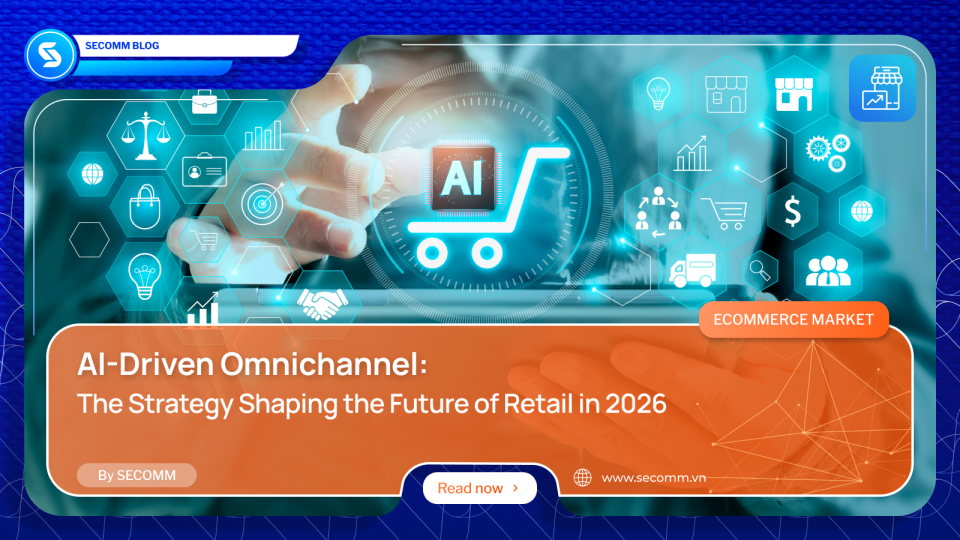
 50
50
 5,831
5,831
 1
1
 20
20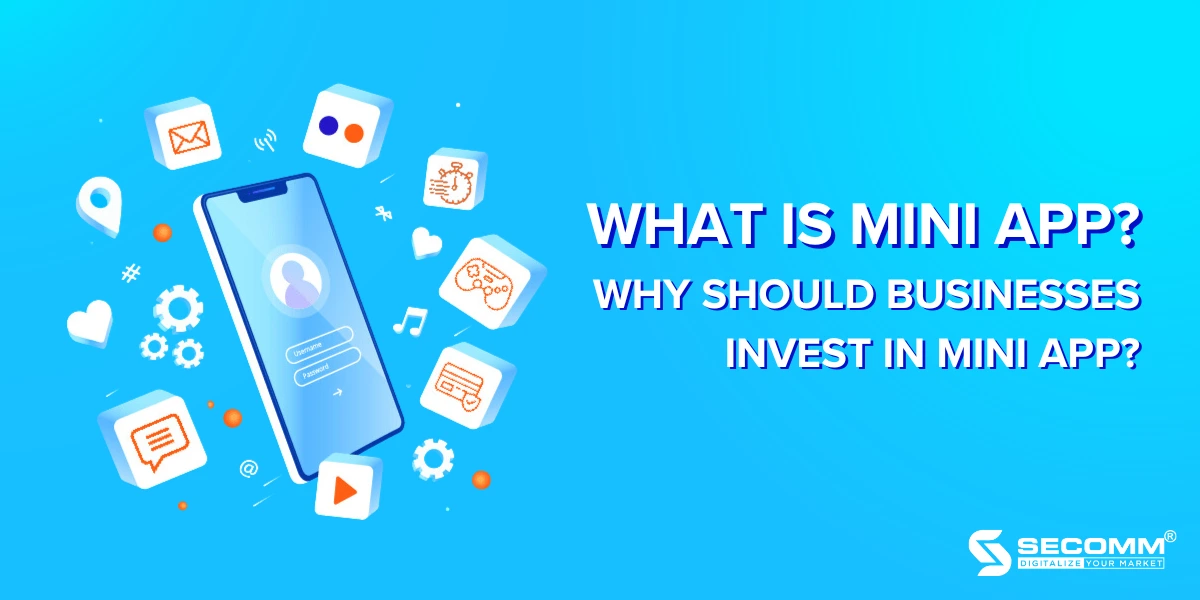
 2
2
 18,347
18,347
 0
0
 1
1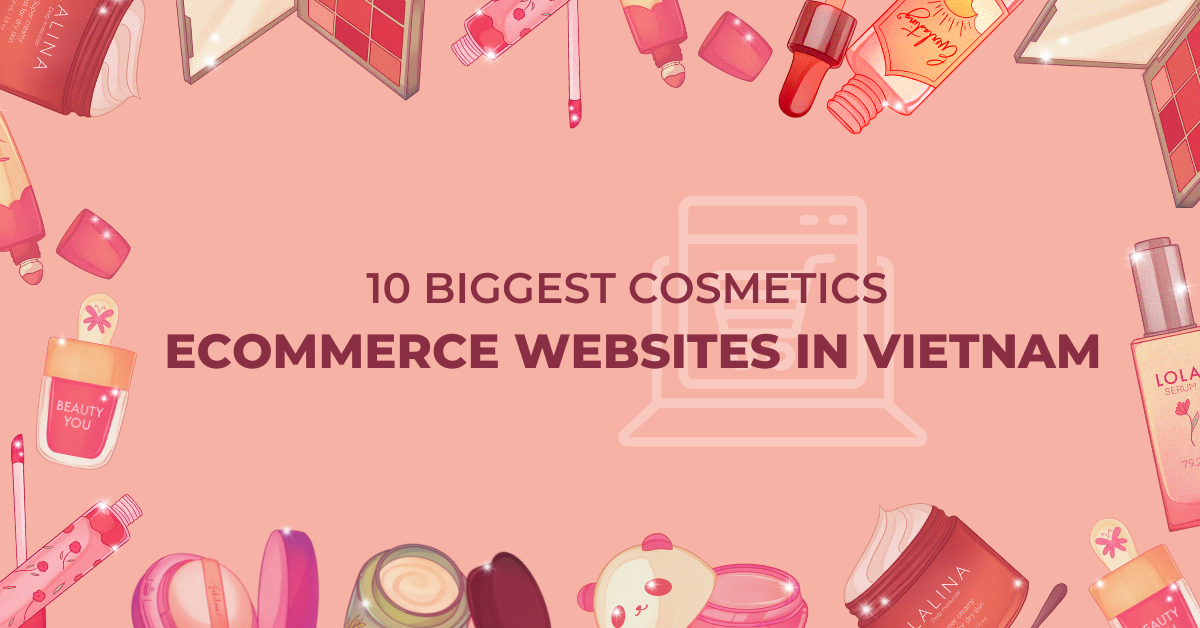
 37
37
 17,744
17,744
 1
1
 4
4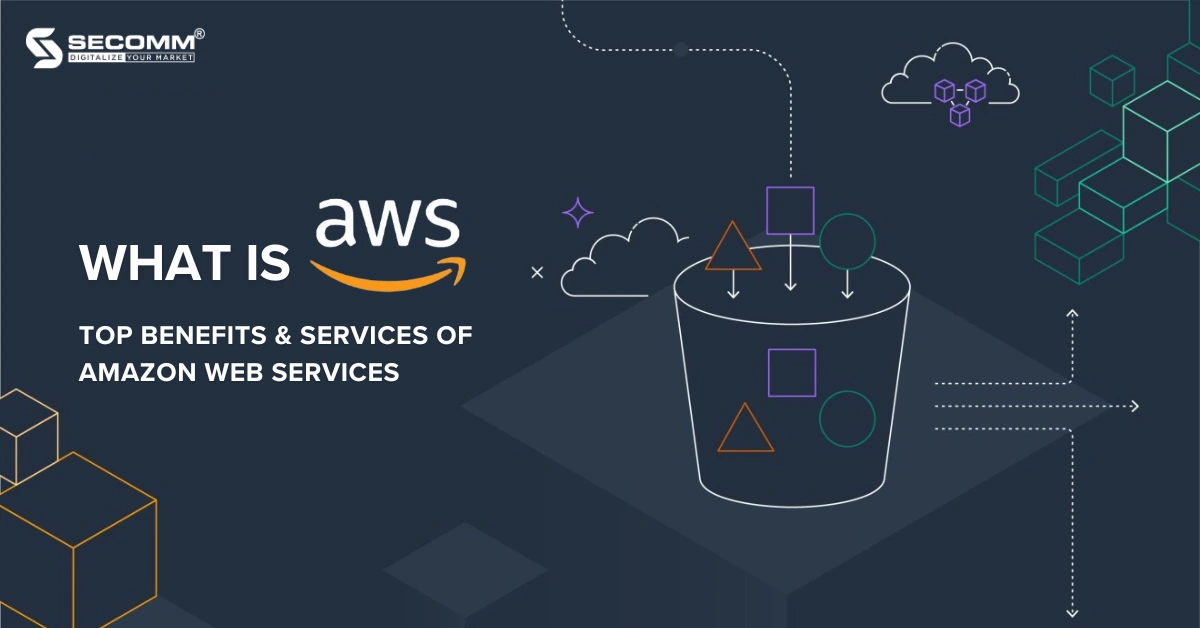
 2
2
 17,145
17,145
 0
0
 1
1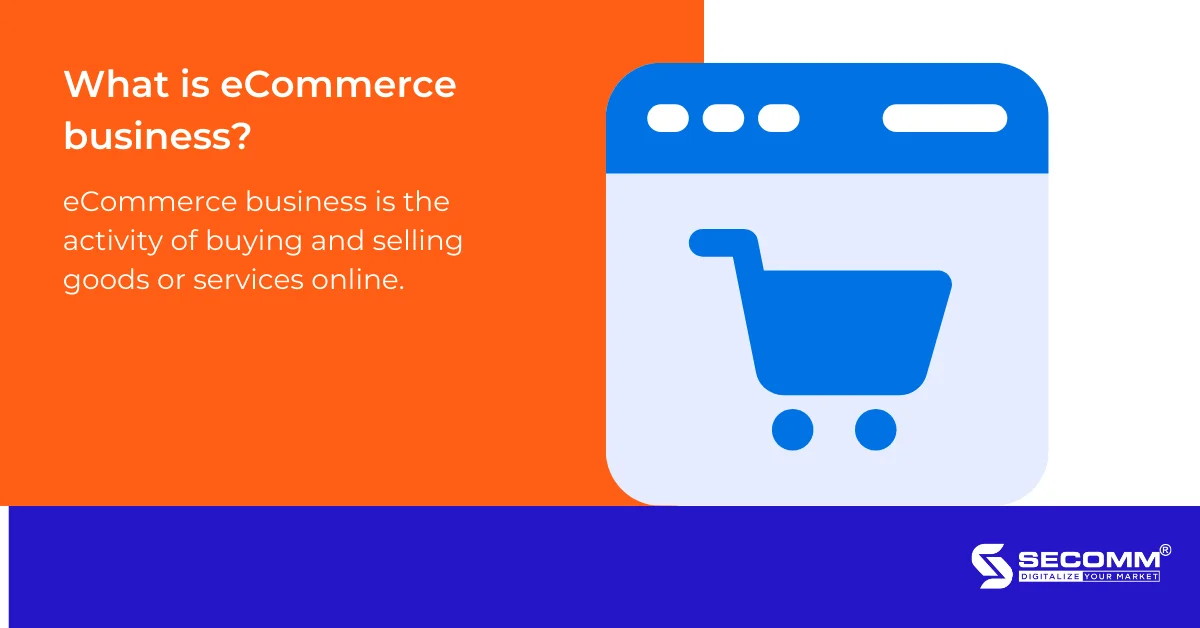
 2
2
 16,790
16,790
 0
0
 1
1



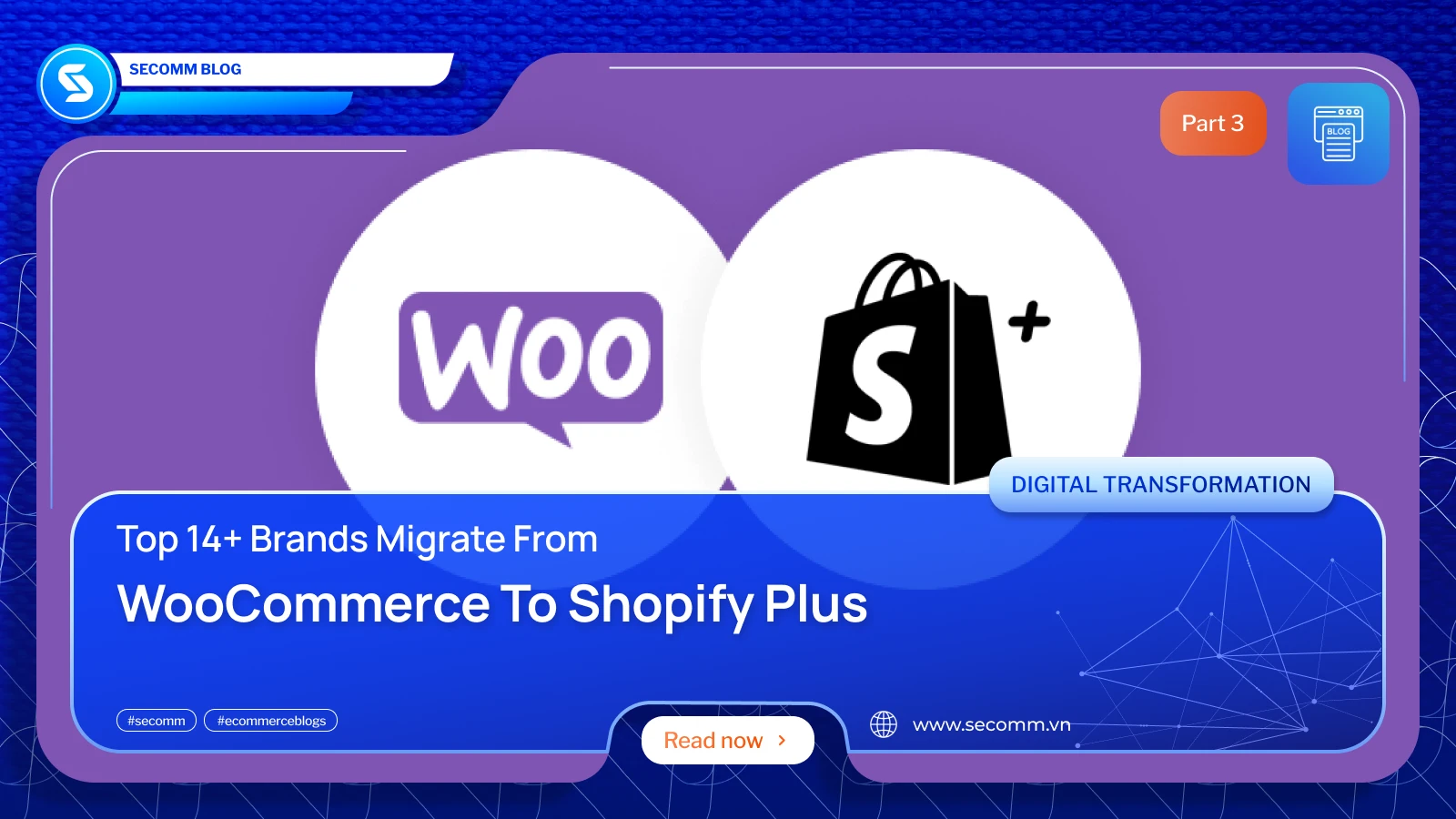
Building upon the narratives in parts 1 and 2, this third part invites you to delve into the stories of the remaining brands within the series of 14 that migrate from WooCommerce to Shopify Plus. Explore how this strategic decision has led to their success in terms of sales and paved the way for sustainable growth in the future.
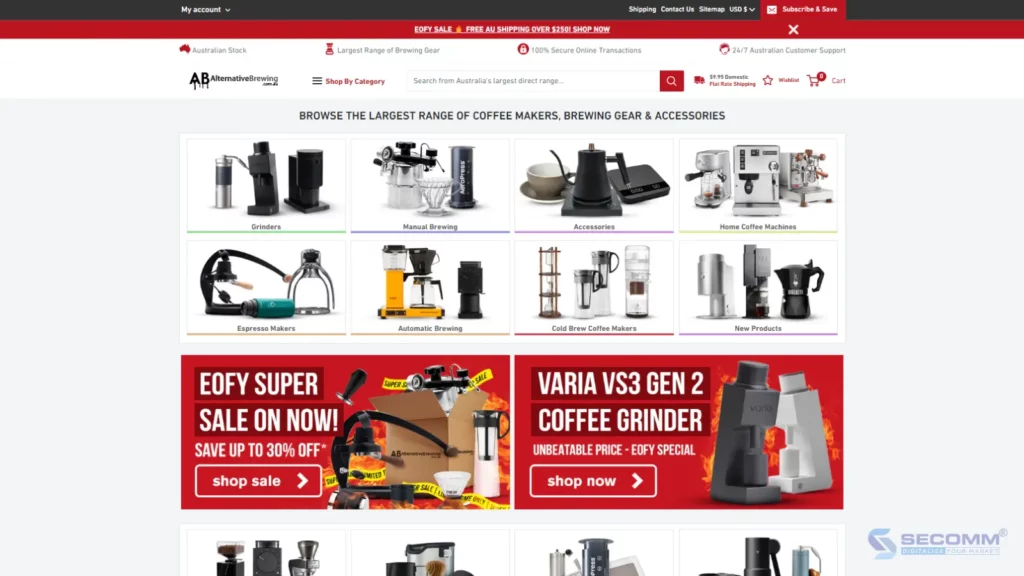
Alternative Brewing is a leading brand in Australia specializing in providing high quality coffee making equipment and utensils. After operating on WooCommerce, Alternative Brewing encountered a problem. WooCommerce eCommerce websites require constant maintenance, causing a lot of worry on shopping occasions like Black Friday or Cyber Monday.
Within 4 months of converting to the Shopify Plus platform, Alternative Brewing’s new eCommerce website loaded faster and had faster checkout, helping the brand significantly increase average order value. Shopify Plus platform with an intuitive, user-friendly interface, Alternative Brewing does not need to deal with a lot of complicated code. This allows the Alternative Brewing team to focus on growing their business and make more informed decisions with Shopify’s in-depth reports and analytics.
Website: https://alternativebrewing.com.au/
Industry: FnB
Traffic: 919,295/month
Rank: #3,071 (Australia) & #144,195 (Global)

Duradry is a leading personal care brand that offers effective antiperspirant products. Operating on WooCommerce costs Duradry a lot of money when testing many different marketing campaigns. The brand migrated to the Shopify Plus platform to take advantage of many exclusive tools and solutions that help them optimize operations and deploy marketing processes more effectively.
Duradry also leverages Shopify Collabs to partner with popular content creators to drive marketing success, bringing Duradry products to more potential customers. The result was 250 content creators joining Duradry’s community, $50k in sales through Shopify Collabs in less than 7 months.
Website: https://duradry.com/?view=hero-a
Industry: Beauty & Cosmetics
Traffic: 386,080/month
Rank: #119,405 (USA) & #445,775 (Global)
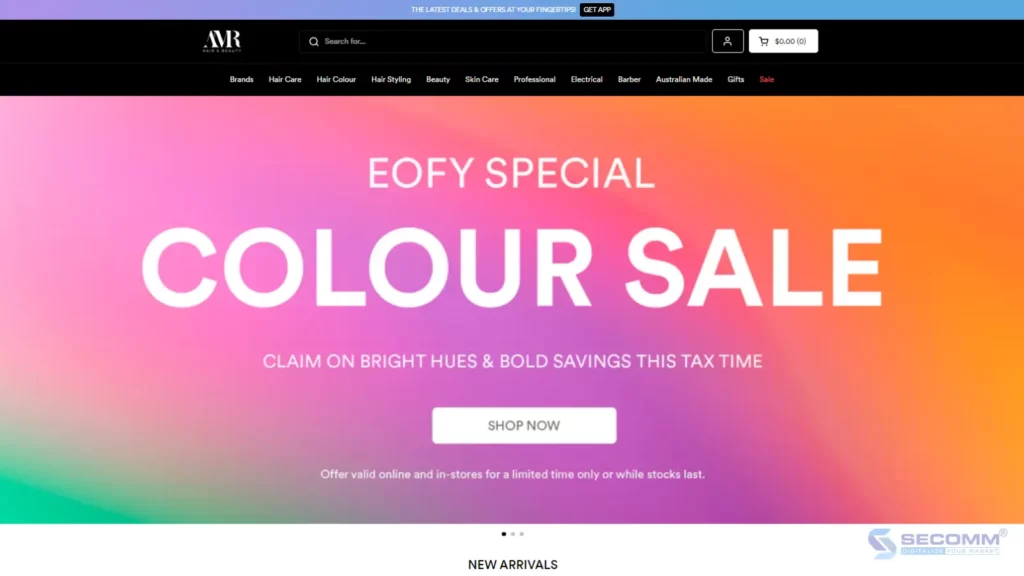
AMR Hair & Beauty is one of the leading suppliers of hair care and beauty products in Australia. Established in 2004, AMR has quickly grown to become a trusted destination for hair salons and individual consumers.
Although WooCommerce has served AMR Hair & Beauty well for many years, with the rapid growth of the business, the platform began to show its limitations. Among them are limited scalability, difficult order management, poor security, and suboptimal customer support.
After switching to Shopify Plus, AMR Hair & Beauty leveraged the B2B on Shopify solution to build a wholesale store and further customize advanced search features and filtering options. This means AMR Hair & Beauty’s B2B customers can quickly narrow down search results and view products along with prices and offers. As a result, AMR Hair & Beauty increased sales by 200%, average B2B order value by 77%, and conversion rate by 93%.
Website: https://amr.com.au/
Industry: Beauty & Cosmetics
Traffic: 258,448/month
Rank: #8,360 (Australia) & #381,873 (Global)

Abode Living was founded in 1991 and since then the brand has become Australia’s leading supplier of luxury bed linen, using the highest quality European fabrics and sewing products in its own factories. I’m in Australia.
With the need to increase online sales in Australia and other markets, and upgrade customer experience. However, the previous platform the company used, WooCommerce, did not offer enough flexibility to customize advanced features. WooCommerce also doesn’t give Abode Living the ability to add international marketplaces to its existing eCommerce system. Switching to Shopify Plus met all of Abode Living’s goals. The brand saw a 15% increase in average order value, faster page load speeds, and faster responses.
Website: https://www.abodeliving.com/
Industry: Home Funishing
Traffic: 16,645/month
Rank: #57,874 (Australia) & #2,352,607 (Global)
Final Words
So, SECOMM has gathered insights from 14 representative brands that courageously stepped out of the “WooCommerce world” to revamp their eCommerce websites with Shopify Plus. These brands prioritize customer experience and streamlined processes, inspiring others to confidently opt for platform migration.
Contact SECOMM or call directly at (+84)28 7108 9908 for advice and implementation of the eCommerce migration process from WooCommerce to Shopify Plus today!
 2
2
 4,243
4,243
 0
0
 1
1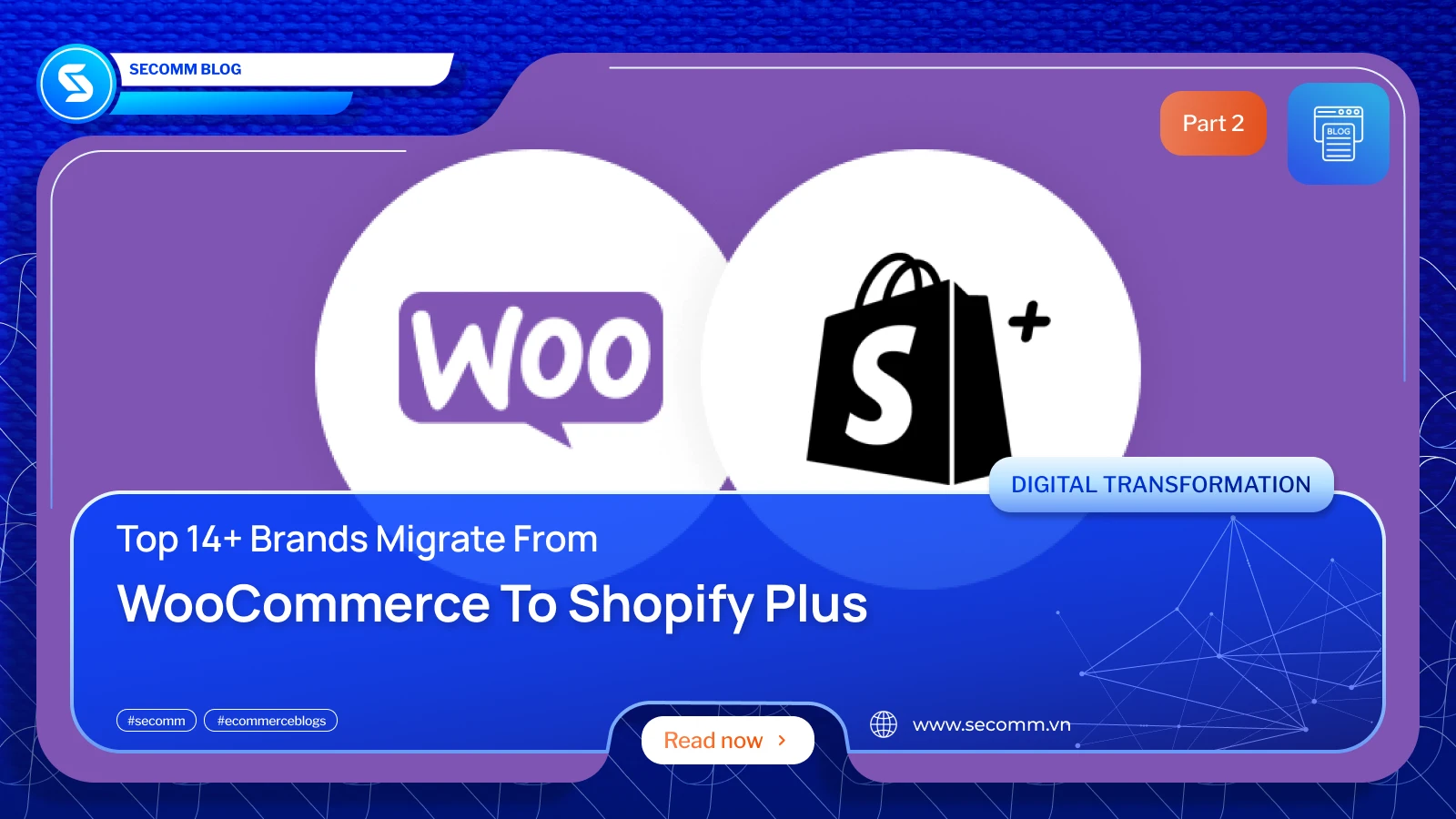
When it comes to brands that re-platformed from WooCommerce to Shopify Plus, it’s good to read their success stories in sales behind.
In the second part of this series, let’s continue to delve into more brands that chose to migrate their eCommerce platforms from WooCommerce to Shopify Plus, and explore how this decision paved the way for boundless success.
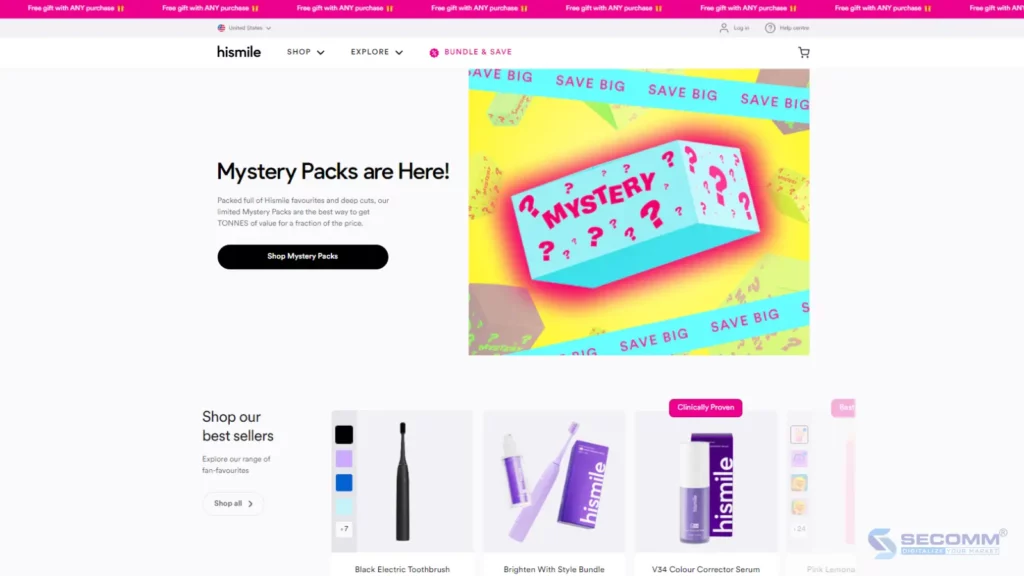
HiSmile is a globally renowned brand for teeth whitening products, aiming to help customers achieve a bright, confident smile. Founded in 2014 in Australia, HiSmile quickly gained attention due to its high-quality, easy-to-use, and effective products.
In the early days of its eCommerce operations, HiSmile’s WooCommerce website performed well. However, as HiSmile gained recognition and became more popular, website traffic began to surge, especially during sales events. Page load issues and site crashes cost the HiSmile team a lot of money in repairs and maintenance. Therefore, they decided to seek a more robust and stable solution and chose Shopify Plus.
With the new Shopify Plus website, HiSmile boosted its social media sales strategy and expanded into the global market. To date, HiSmile has attracted over three million social media followers, 5.5 billion social media impressions, and over 1.5 billion views on its social media videos. These numbers demonstrate the brand’s extensive customer reach. Additionally, global sales have significantly increased since the transition.
Website: https://int.hismileteeth.com/
Industry: Beauty & Cosmetics
Traffic: 4.55M/month
Rank: #10,390 (USA) & #33,392 (Global)
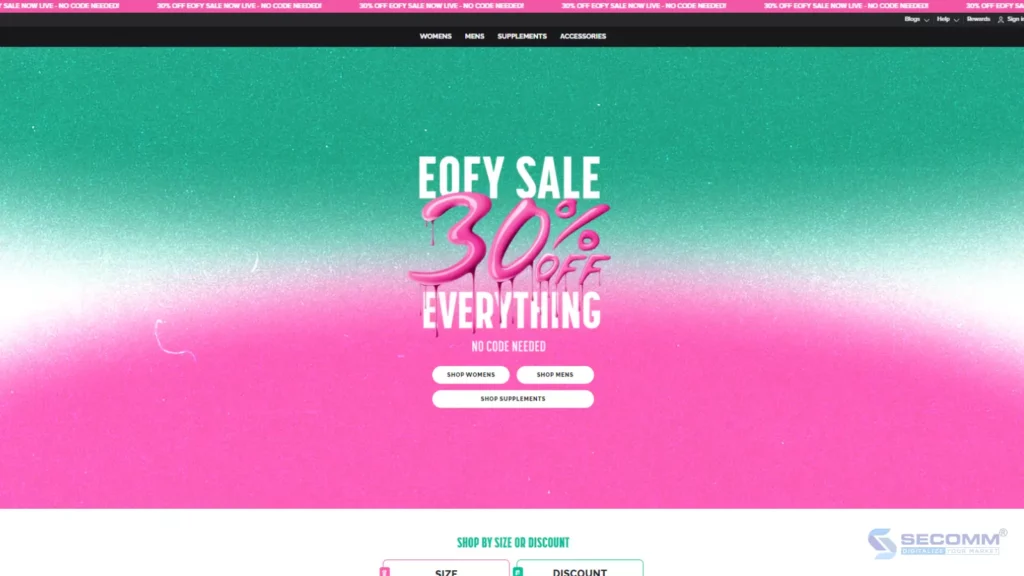
Muscle Nation is renowned in the fitness and sports fashion industry, established with the goal of providing high-quality products tailored to the needs of fitness enthusiasts. The Muscle Nation team focuses on delivering an optimal customer experience and implements social media sales strategies. In its first year, the brand earned $1 million in revenue. At that time, Muscle Nation only had a basic website with eCommerce integration, which led to performance issues and a decline in sales.
Since transitioning to the Shopify Plus platform, Muscle Nation has leveraged the superior ecosystem of apps and tools offered by Plus to customize customer experiences and specific features. The brand uses Shopify Flow to manage high-risk orders and tag customers, Launchpad to handle product releases and event launches, and Peoplevox for warehouse management.
As a result, Muscle Nation generated over $4 million in revenue on Black Friday 2019 and handled more than 208,000 customers shopping simultaneously without any website issues.
Website: https://musclenation.org/
Industry: Fashion
Traffic: 961,900/month
Rank: #2,676 (Australia) & #137,488 (Global)

Junglück is a renowned cosmetics brand in Germany, known for its natural and environmentally friendly skincare products. Initially, Junglück used WooCommerce to manage its online store. However, with the brand’s rapid growth, WooCommerce began to show limitations, including slow page load speeds, poor website performance, and restricted integration and scalability.
The cosmetics brand decided to switch to the Shopify Plus platform. This transition allowed Junglück to seamlessly integrate with various third-party systems such as CRM and ERP, enhancing operational efficiency. As a result, Junglück increased its revenue sevenfold since implementing the Shopify Plus website, boosted average order value by 22%, and improved conversion rates by 34%.
Website: https://junglueck.de/
Industry: Beauty & Cosmetics
Traffic: 355,059/month
Rank: #12,653 (Germany) & #308,899 (Global)
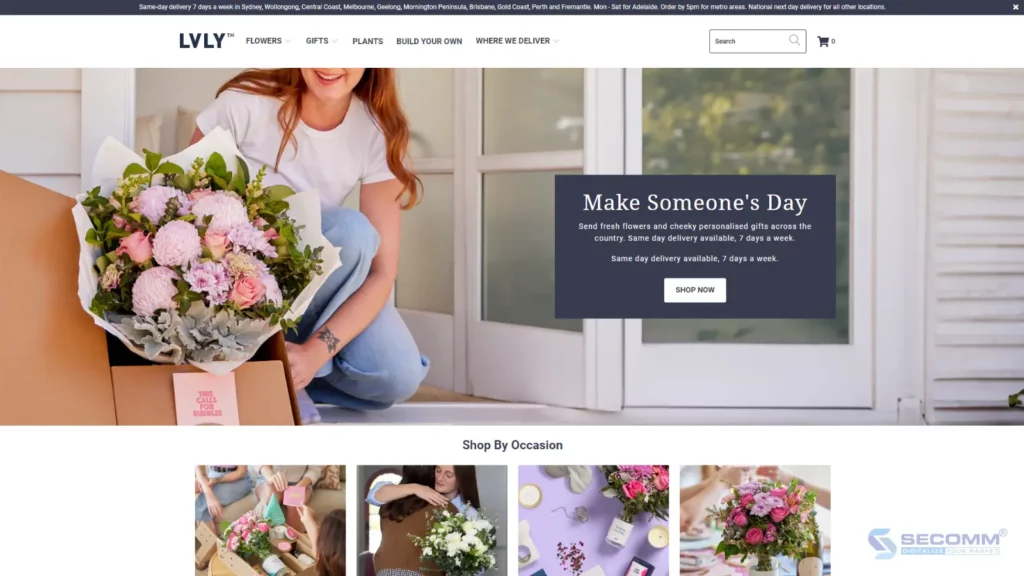
LVLY is a prominent brand in the gift and fresh flower arrangement industry, known for its sophistication and modern style. Each LVLY product is meticulously designed and delivered promptly to the recipient, perfectly conveying messages of love and care.
Previously, LVLY used the WordPress platform and WooCommerce plugin to build its eCommerce website. The brand encountered many customization limitations, and the basic features gradually failed to support expansion. Particularly during major shopping events, the system became overloaded and couldn’t handle the high traffic volume. LVLY decided to switch to the Shopify Plus platform. The platform migration took less than 90 days without reducing the conversion rate. The scalability of Shopify Plus helped LVLY achieve its biggest Valentine’s Day sales ever in 2023. Personalization options and add-ons, which LVLY could not implement on its previous platform, also played a crucial role in the cross-sell/up-sell strategy during this shopping event.
Website: https://www.lvly.com.au/
Industry: Gifts & Flowers
Traffic: 354,352/month
Rank: #6,734 (Australia) & #334,427 (Global)

Since its establishment in 1971, Mandaue Foam has become an indispensable name in the furniture industry in the Philippines. After four years of using the standard Shopify version, Mandaue Foam upgraded to Shopify Plus to seek solutions for expansion and customization.
The brand utilized LaunchPad – an exclusive feature of Shopify Plus – to schedule marketing campaigns and automate product price updates and discounts. Because LaunchPad allows tracking the performance of each campaign in real-time, the Mandaue Foam team can understand customer behavior and adjust campaigns accordingly.
Next, with Shopify Flow, Mandaue Foam automated its order management process by creating a workflow where, as soon as an order is placed, one of the 28 physical locations with inventory for that product is notified to process the order. This process ensures order fulfillment speed while eliminating the need for manual order tracking.
The platform switch and the implementation of eCommerce automation have helped Mandaue Foam increase order volume by 200%, total sales by 151% YOY, and customer return rate by 16%.
Website: https://mandauefoam.ph/
Industry: Furniture
Traffic: 486,503/month
Rank: #2,745 (Philippines) & #170,520 (Global)
Final Words
Here are the next 5 brands in the series re-platform from WooCommerce to Shopify Plus. Throughout SECOMM’s process of executing platform conversion projects, whether from WooCommerce or any other eCommerce platform to Shopify Plus, the pivotal factor determining success is a detailed and well-structured conversion plan.
Contact SECOMM or directly call the hotline at (028 7108 9908) to collaborate on devising the optimal plan for the platform migration to Shopify Plus.
 2
2
 3,494
3,494
 0
0
 1
1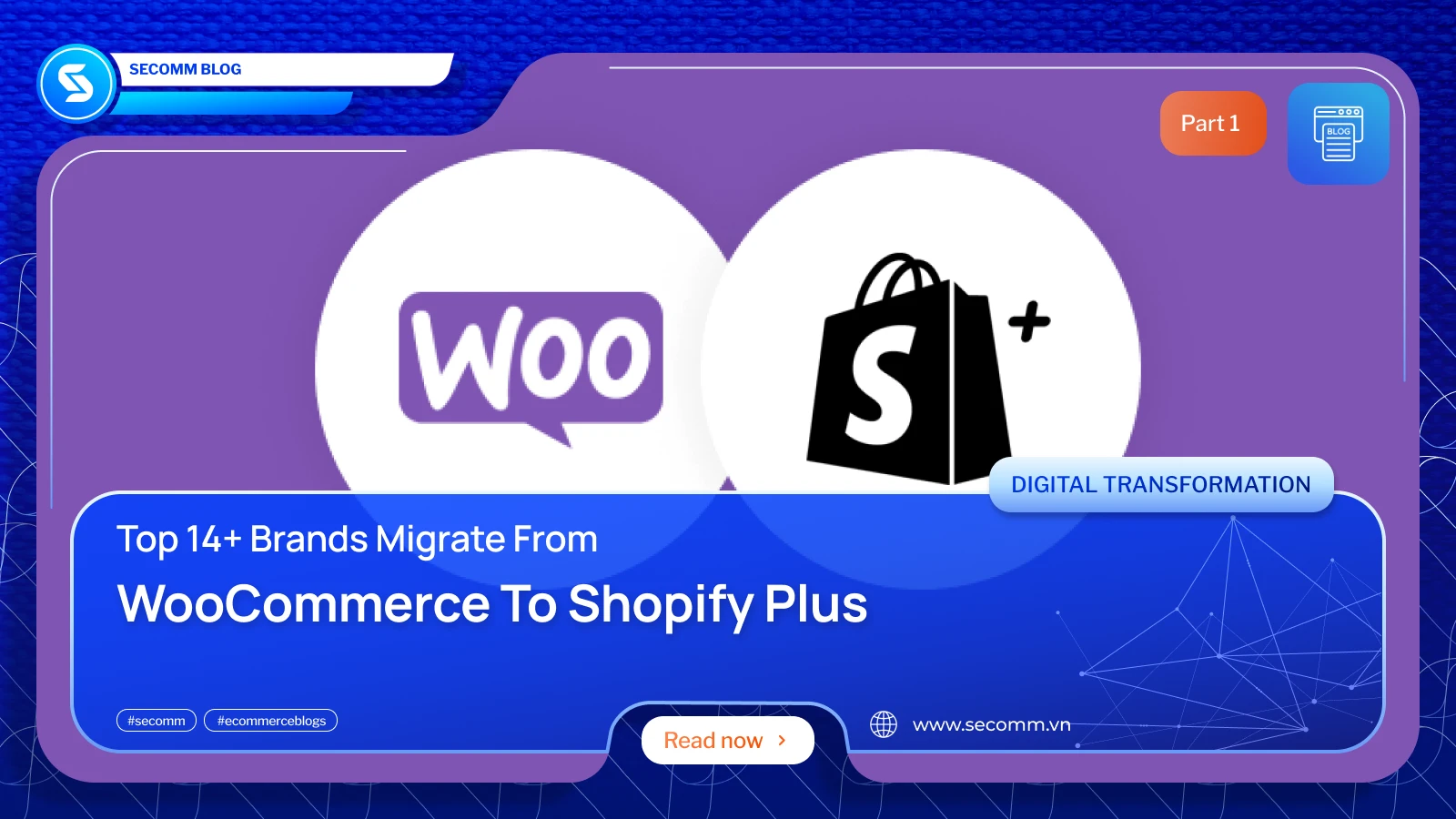
WooCommerce is known as the ‘golden standard’ for many eCommerce businesses. With its intuitive, user-friendly interface and free usage, WooCommerce enables businesses to start operating immediately.
However, its limitations in customization, scalability, and performance, along with the need for ongoing maintenance, have driven many brands to look for better solutions beyond the “WooCommerce world.” Shopify Plus has become a popular choice for those seeking to optimize their platform transition.
Let’s delve into why the five brands below chose to migrate their e-commerce websites from WooCommerce to Shopify Plus and how this decision has boosted their conversion rates and sales.
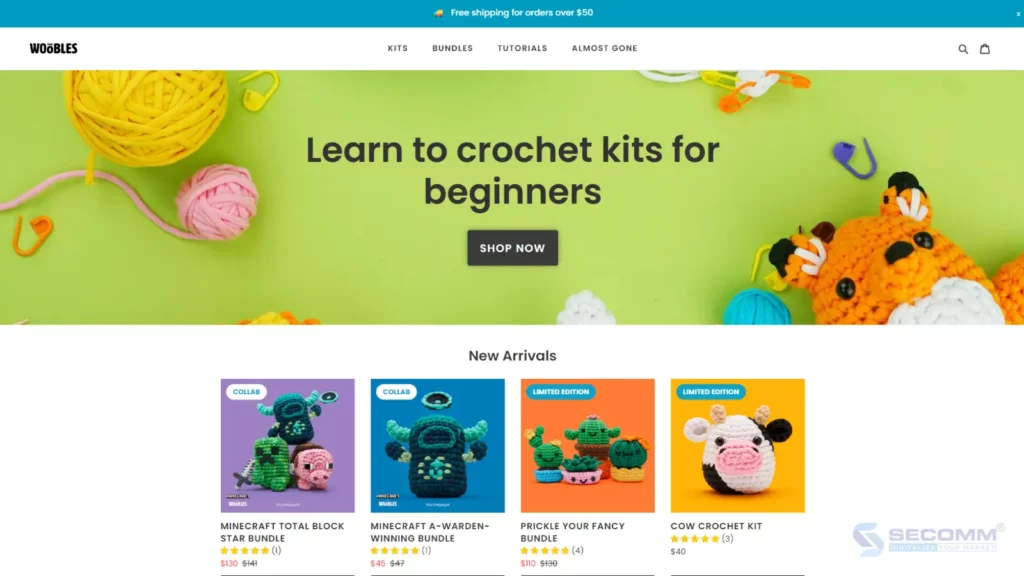
The Woobles is a prominent brand specializing in crochet kits for beginners, with a mission to bring joy and creativity through learning to crochet. Founded with the goal of making it easy for people to access and experience the art of crochet, The Woobles provides complete kits and detailed instructions, enabling users to create adorable products within just a few hours of learning.
After a period of selling on Etsy, the company decided to build its own eCommerce website. Initially, they chose WooCommerce and took only a few weeks to set up the site. However, as The Woobles’ brand grew more popular and website traffic increased, the page loading speed became inefficient. They realized that the money saved on platform fees was far outweighed by the costs of fixing technical issues and maintaining the system.
Switching from the WooCommerce platform to Shopify Plus allowed The Woobles to optimize their investment and leverage the application ecosystem and solutions offered by Shopify and third parties. Shopify’s robust infrastructure helped The Woobles provide customers with a customized shopping experience and handle surges in traffic. Notably, The Woobles’ Shopify Plus website can maintain an uptime of up to 99.99%.
Website: https://thewoobles.com/
Industry: Toys and Gifts
Traffic: 4.997M/month
Rank: #6,216 (USA) & #31,974 (Global)

Wilding is a prominent shoe brand that specializes in providing comfortable and stylish footwear for consumers. In 2018, Wilding experienced remarkable growth. However, despite a fairly high repeat customer rate, the conversion rate for new customers did not meet expectations.
With a multi-channel sales strategy, Wilding decided to transition from WooCommerce to the Shopify Plus platform to rebuild its eCommerce system. Additionally, the brand opened several showrooms in various locations across Germany and implemented the Shopify POS solution. This allows customers to try on shoes before deciding to purchase either in-store or through the website. The Shopify POS system integrates sales channels and links transactions, enabling Wilding to manage inventory, orders, and track customer behavior more easily and efficiently.
Website: wildling.shoes
Industry: Fashion
Traffic: 1.783M/month
Rank: #4,971 (Germany) & #80,383 (Global)

Since its founding in 2019, Sunology has gradually established itself as one of Europe’s leading solar equipment providers. After a long period of eCommerce implementation with WooCommerce, Sunology decided to switch to Shopify Plus to seek better customization and scalability solutions to achieve its growth and global expansion goals.
Using Shopify Script allows the company to manage custom material allocations for each solar device. This way, customers can design solar power stations tailored to their specific needs. In addition to streamlining and optimizing Sunology’s management processes, Script also optimizes checkout to provide a more appealing shopping experience for customers.
Sunology also leverages the Shopify Markets tool to quickly set up and efficiently manage multiple stores from a single dashboard. This application makes it easy to translate store content from one language to another, significantly supporting Sunology’s international expansion ambitions.
Website: https://sunology.eu/
Industry: Home & Garden
Traffic: 583,349/month
Rank: #12,355 (France) & #353,837 (Global)
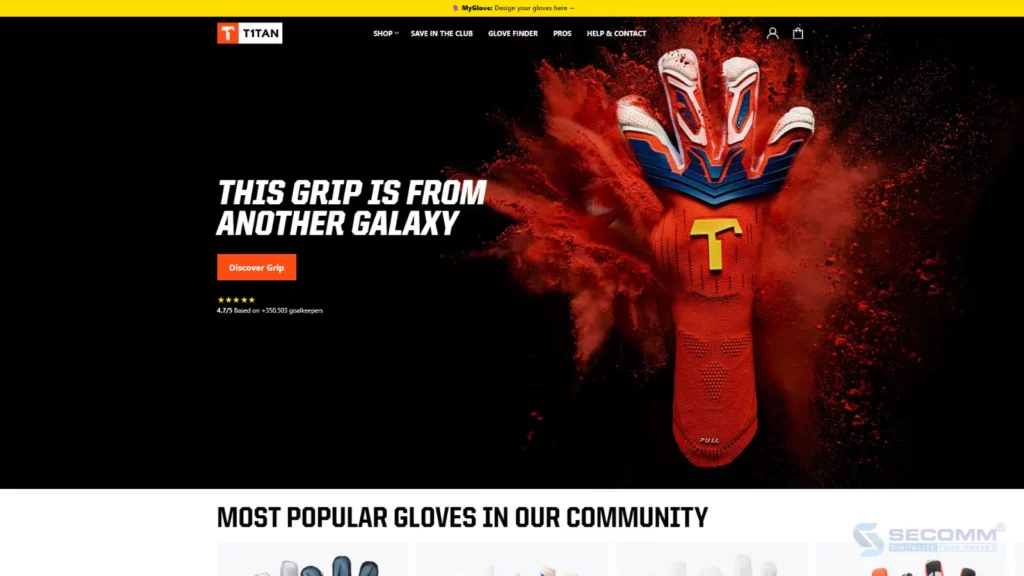
T1TAN is a brand specializing in the production and supply of high-quality sports equipment and accessories, particularly in the field of football. T1TAN’s flagship product is goalkeeper gloves, renowned for their durability, comfort, and superior protection. These gloves are developed to meet the most stringent standards.
With their WooCommerce system, T1TAN experienced a website crash during a sale of limited edition products at discounted prices. The T1TAN team realized they needed a more robust and flexible eCommerce platform. Since switching to Shopify Plus, T1TAN has handled multiple major shopping events with surges in traffic and transactions without any website crashes. This platform change has resulted in a 25% increase in conversion rates, zero downtime, and expansion into six additional markets across Europe.
Website: https://uk.t1tan.com/
Industry: Sport
Traffic: 492,054/month
Rank: #621,737 (USA) & #241,413 (Global)

RUDIS is a renowned brand specializing in products and equipment for wrestling, with a mission to support and enhance the performance of athletes at all levels. RUDIS products are designed using advanced technology and premium materials, ensuring durability, comfort, and high performance.
As their eCommerce business grew rapidly, RUDIS struggled to scale their existing WooCommerce system, making a platform switch the only viable solution. RUDIS chose Shopify Plus. After launching the new website, the RUDIS team quickly integrated ERP NetSuite and third-party systems to optimize sales, shipping, and payment processes. With Shopify Plus, RUDIS achieved unprecedented growth, including:
Website: https://www.rudis.com/
Industry: Sport
Traffic: 395,166/month
Rank: #42,519 (USA) & #252,797 (Global)
Final Words
Here are five brands that have witnessed a remarkable change in sales by re-platforming from WooCommerce to Shopify Plus. An important point to note is that while WooCommerce is free and easy to use, complex customizations can be costly and sometimes impractical due to limitations in WordPress and WooCommerce infrastructure. Additionally, businesses may face performance and website speed issues, leading to higher costs for system repairs and maintenance.
On the other hand, Shopify Plus provides businesses with flexible customization options at a more optimal cost, and maintenance and updates are streamlined following Shopify’s standards.
Need more help? Contact SECOMM today!
 18
18
 3,295
3,295
 0
0
 8
8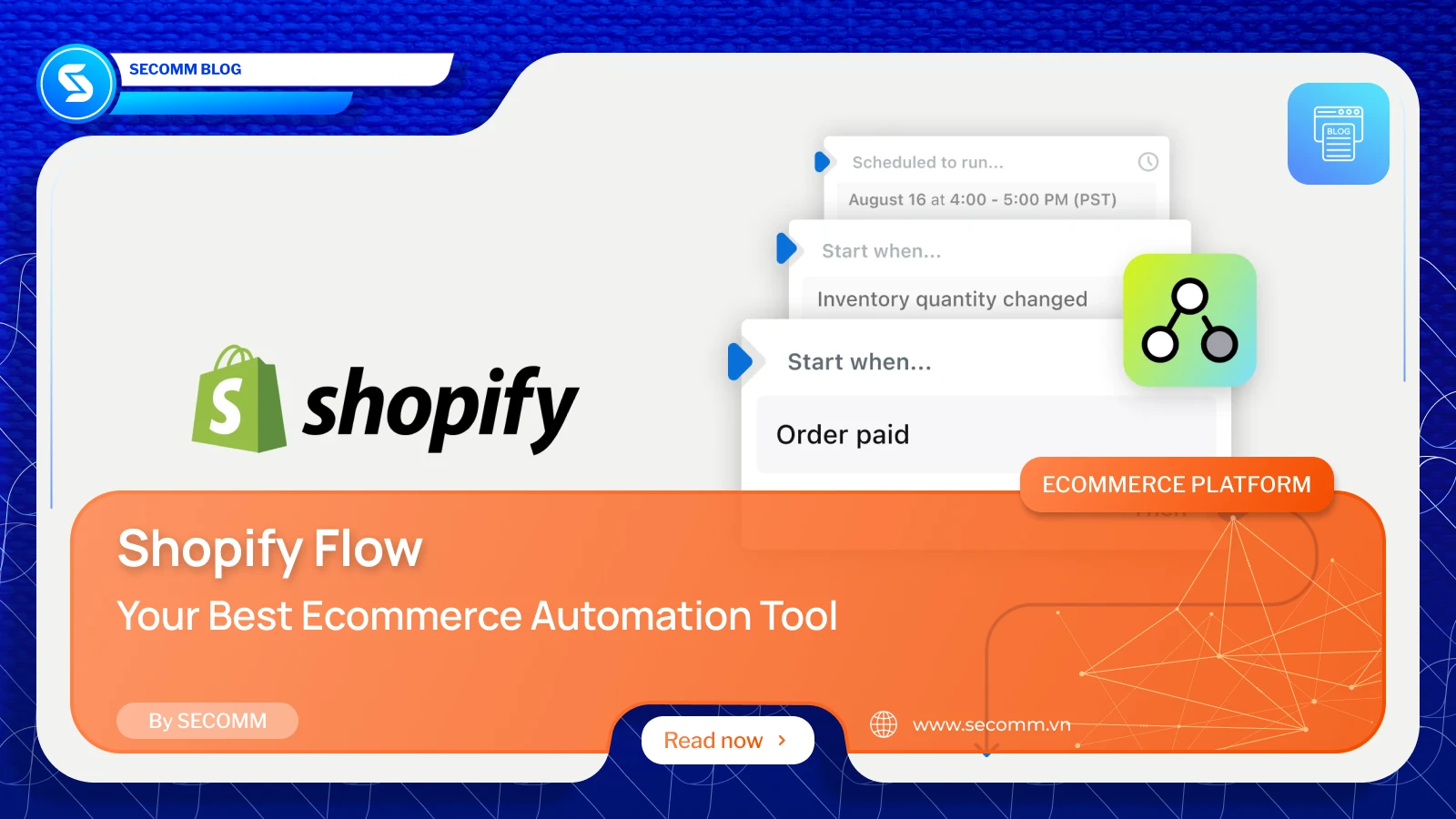
In the fast-paced digital world, eCommerce automation and efficiency are key to staying ahead of the competition. With countless tasks to manage, from inventory updates to customer engagement businesses need reliable tools to streamline their operations. Enter Shopify Flow, a powerful automation tool designed specifically for Shopify users. Shopify Flow allows merchants to automate repetitive tasks, freeing up valuable time and resources to focus on growing their business.
In this blog, we’ll explore how Shopify Flow works, its key features, and the benefits it can bring to your eCommerce operations. Whether you’re a seasoned Shopify user or new to the platform, understanding how to leverage Shopify Flow can be a game-changer for your business.
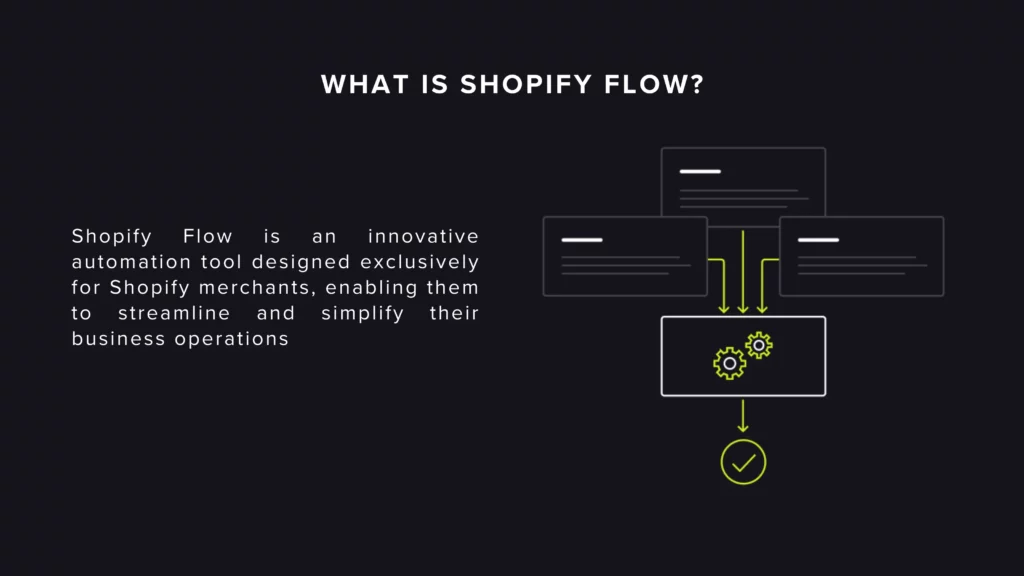
Shopify Flow is an innovative automation tool designed exclusively for Shopify merchants, enabling them to streamline and simplify their business operations. It provides a visual interface where users can create custom workflows to automate repetitive and time-consuming tasks without the need for any coding skills.
Shopify Flow is available at all plans: Basic, Shopify, Advanced and Plus.
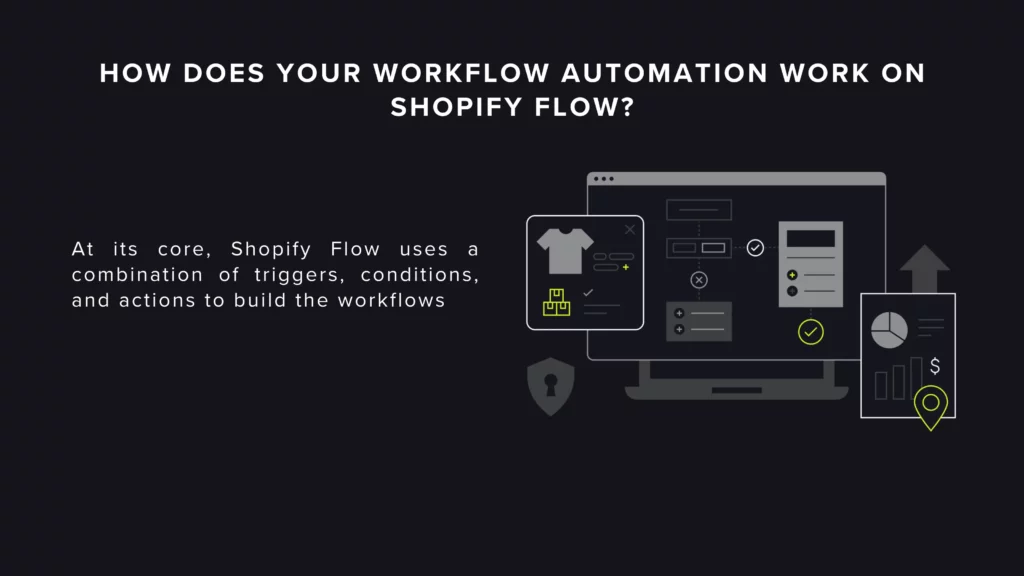
At its core, Shopify Flow uses a combination of triggers, conditions, and actions to build the workflows. A trigger initiates the workflow, a condition specifies criteria that must be met, and an action defines what happens when the criteria are met.
For example:
This tool is particularly valuable for automating processes such as inventory management, fraud prevention, loyalty and retention, fulfillment management and marketing campaigns. By automating these tasks, Shopify Flow helps businesses improve efficiency, reduce human error, and ensure consistent execution of key operations.
Shopify Flow also integrates seamlessly with a variety of Shopify apps and third-party tools, making it a versatile solution for businesses looking to optimize their workflows. Whether you’re running a small online store or managing a large eCommerce enterprise, Shopify Flow offers the flexibility and scalability to meet your automation needs.
Creating and managing workflow automation with Shopify Flow is a straightforward process that can significantly enhance your eCommerce operations.
Step 1: Open up the Shopify Flow editor, then select “Create workflow”
Step 2: Click “Select a trigger” from a searchable list of native triggers of Shopify or those from 3rd-party apps to start the workflow.
Step 3: Click on the Blue button to choose to add either condition or action
Step 4: Select “Condition” to set rules to determine if the action executes.
Step 5: Click “Then” to set action for the true condition. Or “otherwise” to set action for the false condition.
Step 6: Click “turn on”, the button in the top right corner will turn green and show is on.
You can also leverage the templates library. Here, you’ll find the pre-made workflows that you can use right away or edit to fit your business needs.
Step 1: To add new action items by clicking on any blank space in the editor, select the “Action” button. All of available options will appear
Step 2: Search specific action on the search bar and simply select the action
Step 3: Connect the new action to the existing workflow by selecting the “Then” button from your condition and linking it to your new action.
Step 1: Click on remove the action
Step 2: Some actions now no longer connected. You’ll need to link them back to the rest of your workflow.
Step 3: You can link them to the condition or to other actions.
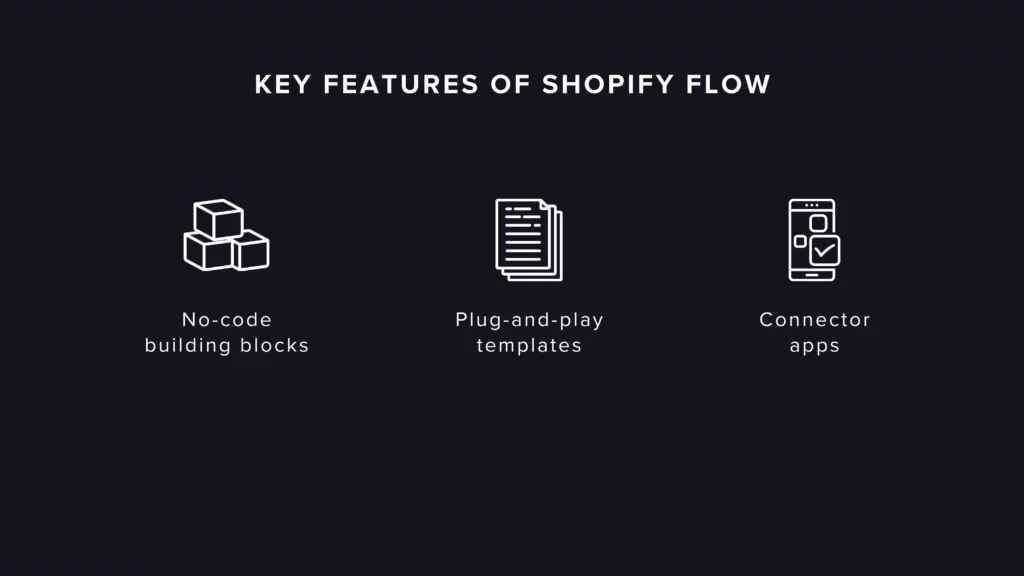
Shopify Flow is packed with features that make it a powerful tool for eCommerce automation. Here are 3 core features you should notice
At the heart of Shopify Flow are its intuitive building blocks: triggers, conditions, and actions, which allows you to create your custom eCommerce automation processes. Triggers initiate workflows based on specific events, conditions set criteria that must be met for the workflow to proceed, and actions define what tasks will be executed. This modular approach helps you create highly customized workflows tailored to your unique business needs, enabling precise automation of complex processes without any coding knowledge.
Shopify Flow offers a variety of pre-built templates that cover common eCommerce scenarios such as inventory management, customer segmentation, and order processing. These templates provide a quick and easy way to implement automation, allowing you to get started with minimal effort. Each template can be customized to fit specific requirements, making it an excellent starting point for those new to automation.
To extend its capabilities, Shopify Flow allows you to integrate seamlessly with numerous third-party apps. This feature allows you to automate workflows that span multiple tools and platforms. For example, you can connect Shopify Flow with email marketing apps, CRM systems, and inventory management software to create comprehensive, cross-functional automations. This integration capability ensures that all aspects of your eCommerce operations are synchronized and efficient.
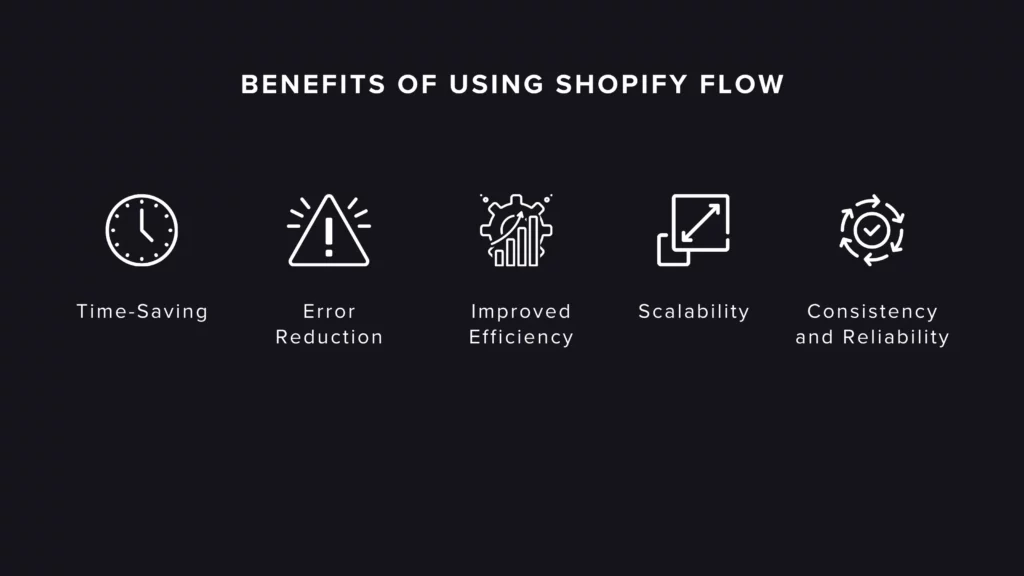
Utilizing Shopify Flow for eCommerce automation offers a multitude of advantages that can significantly enhance business operations. Here are some of them:
Shopify Flow automates repetitive and time-consuming tasks, such as inventory updates, order processing, and customer follow-ups. By automating these processes, you can save valuable time that can be redirected towards strategic activities, such as marketing, product development, and customer engagement.
Manual data entry and repetitive tasks are prone to human error, which can lead to costly mistakes. Shopify Flow minimizes these risks by ensuring that tasks are performed consistently and accurately. Automation reduces the likelihood of errors in critical processes like order fulfillment, inventory management, and customer communications.
Automation streamlines workflows, making business operations more efficient. With Shopify Flow, tasks are executed automatically based on predefined triggers and conditions, eliminating the need for manual intervention. This efficiency leads to faster processing times, better resource allocation, and improved overall productivity.
As your business grows, managing increasing volumes of orders, customers, and data can become challenging. Shopify Flow provides a scalable solution that can handle higher workloads without additional effort. Automated workflows can easily be adjusted and expanded to accommodate growth, ensuring that your business operations remain smooth and efficient as you scale.
Automated workflows ensure that processes are carried out consistently, adhering to the same standards every time. This reliability is crucial for maintaining high levels of customer satisfaction and operational excellence. Consistent execution of tasks also helps in building trust with customers and partners.
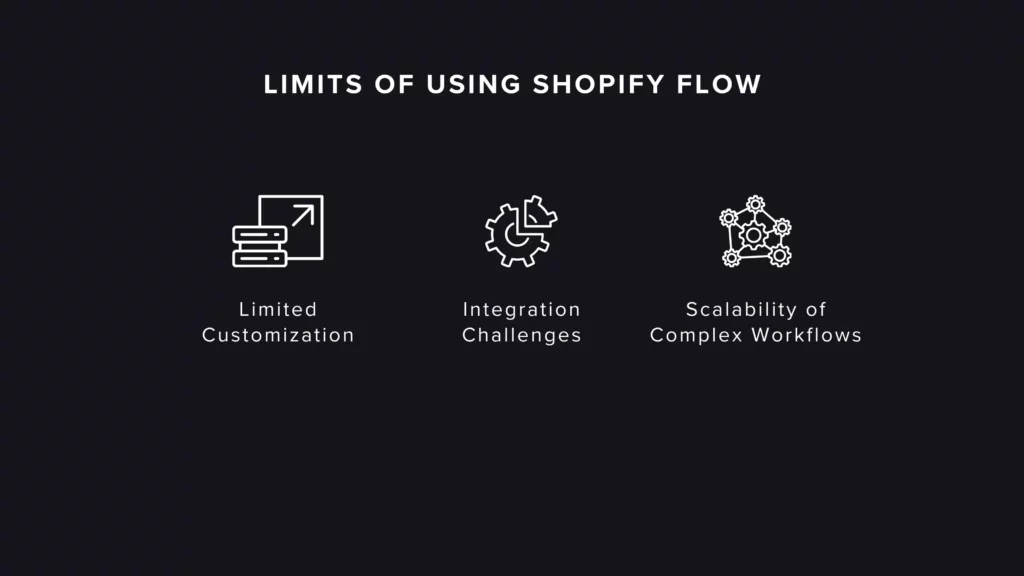
While Shopify Flow is a powerful tool for automating eCommerce operations, it’s important to be aware of its limitations and challenges. Here are some key considerations:
Although Shopify Flow offers a variety of triggers, conditions, and actions, there may be scenarios where the available options do not fully meet specific business needs. Advanced customization might require additional development work or third-party apps to fill in the gaps. This can lead to increased complexity and potential costs.
While Shopify Flow integrates with many third-party apps, there can be limitations in compatibility or functionality with certain tools. Businesses relying on specialized software may find it challenging to create seamless workflows without encountering integration issues. In some cases, additional middleware or custom API development may be necessary.
As businesses grow and their operational needs become more complex, managing a large number of workflows can become challenging. Ensuring that workflows are optimized and do not conflict with each other requires careful planning and ongoing maintenance. Overly complex workflows might also become difficult to troubleshoot and update.
Several successful businesses have leveraged Shopify Flow to streamline their operations and achieve impressive results. Here are a few real-world examples:
Good American, a leading fashion brand co-founded by Khloé Kardashian, uses Shopify Flow to automate various aspects of their eCommerce operations. By implementing workflows that manage inventory levels, segment customers, and trigger personalized marketing campaigns, Good American has been able to enhance efficiency and improve customer engagement. These automations have allowed the brand to focus more on growth and less on manual administrative tasks.
Cozykids, an online retailer specializing in children’s furniture and decor, utilizes Shopify Flow to streamline their order processing and inventory management. Automated workflows ensure that stock levels are updated in real-time, reducing the risk of overselling and improving order fulfillment accuracy. Additionally, Cozykids uses Shopify Flow to send automated follow-up emails to customers, enhancing their post-purchase experience and increasing customer satisfaction.
Mandaue Foam, a furniture and home decor company, has adopted Shopify Flow to manage their complex supply chain and customer service processes. With automated workflows in place, Mandaue Foam can efficiently handle large volumes of orders, track shipments, and manage customer inquiries. This automation not only improves operational efficiency but also provides a seamless shopping experience for their customers, contributing to higher customer retention and satisfaction.
Final Words
In this blog, we explored Shopify Flow’s capabilities, including its automation of workflows and key features such as building blocks, templates, and connector apps. We also discussed its benefits like time-saving and improved efficiency, as well as potential limitations.
Need more advice? Contact SECOMM today!
 2
2
 3,431
3,431
 0
0
 1
1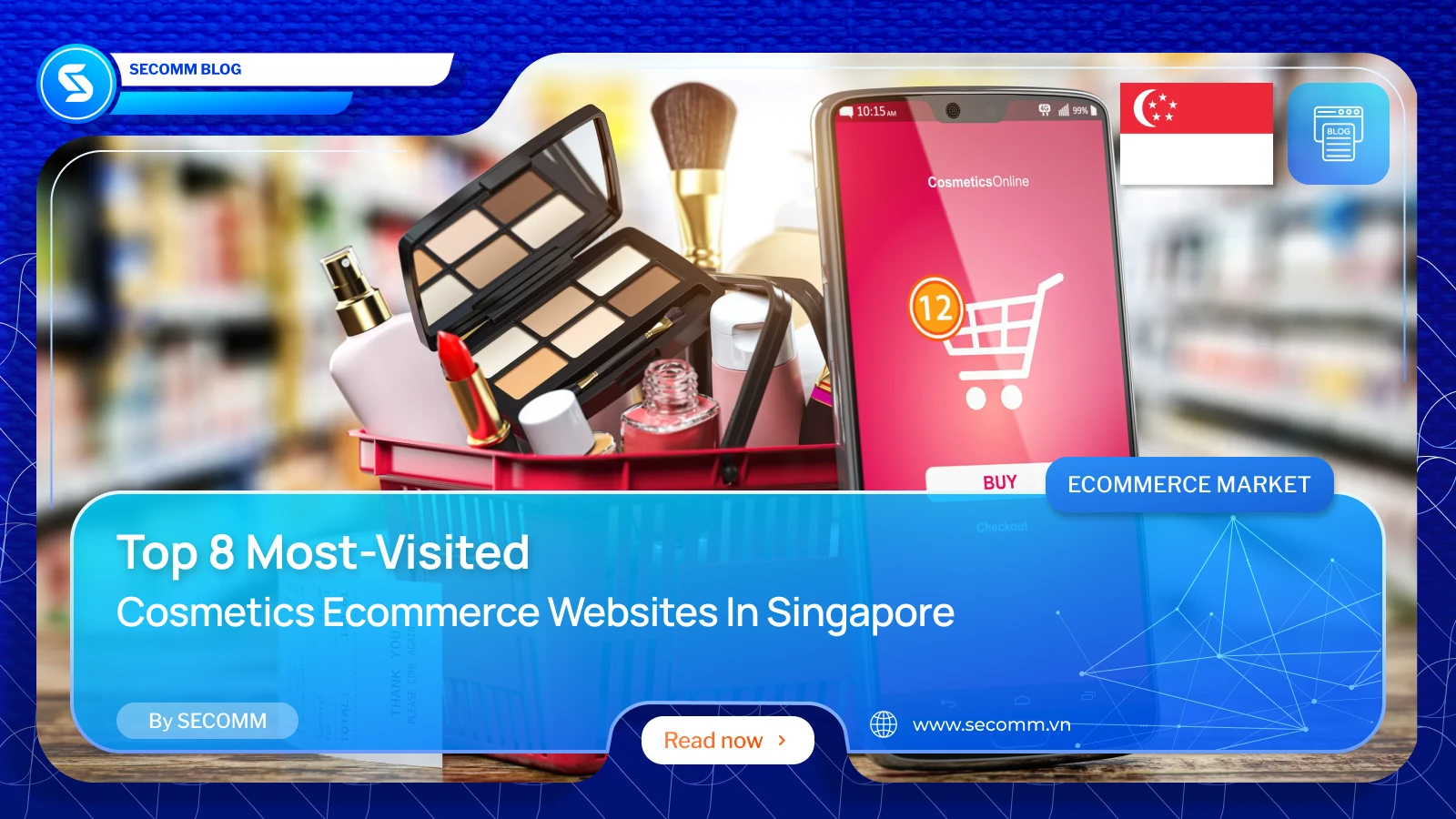
The cosmetics eCommerce industry in Singapore is witnessing explosive growth and continuous innovation, becoming one of the most promising and dynamic markets in the Southeast Asia region. With the increasing demand for beauty and personal care products from consumers, coupled with support from advanced technology and digital infrastructure, online cosmetics businesses in Singapore have been seizing opportunities to expand market share and enhance customer experiences.
Below are cosmetics 8 eCommerce websites trusted by Singaporean consumers for shopping.
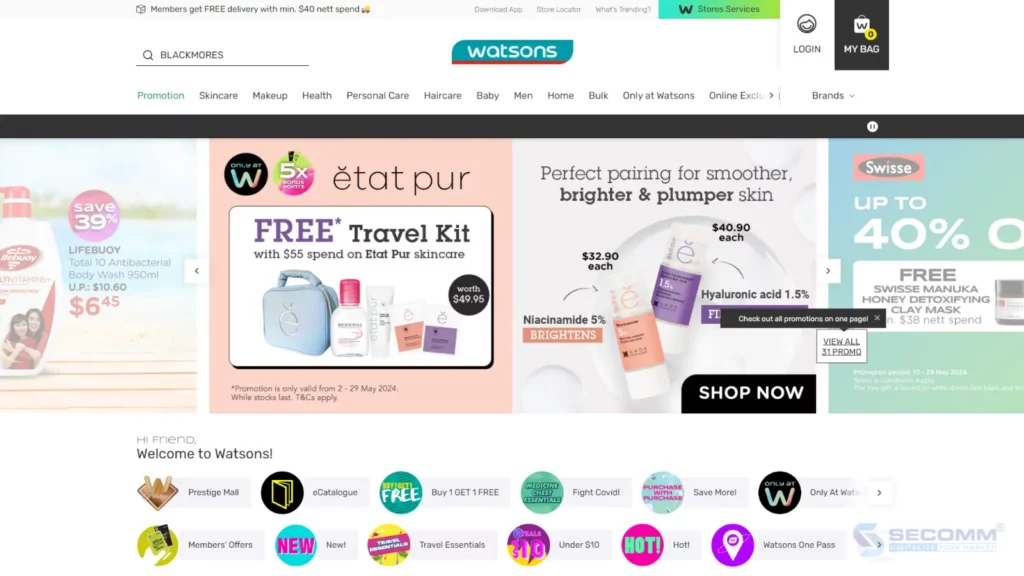
The cosmetics and healthcare retail chain Watsons has gained fame across Asia, and Singapore is no exception. As a member of the A.S. Watson Group, Watsons has solidified its position with thousands of stores worldwide and a robust eCommerce website.
Watsons Singapore is renowned for its extensive product portfolio, ranging from cosmetics and skincare to haircare and healthcare products. The eCommerce website of Watsons Singapore is built on the SAP Commerce Cloud platform, providing customers with a smooth and diverse shopping experience. Search, product filtering, and cart features are optimized and customized, while encouraging customers to create accounts to enjoy exclusive benefits. This helps track and measure customer behavior on the website, leading to the most effective sales and marketing strategies.
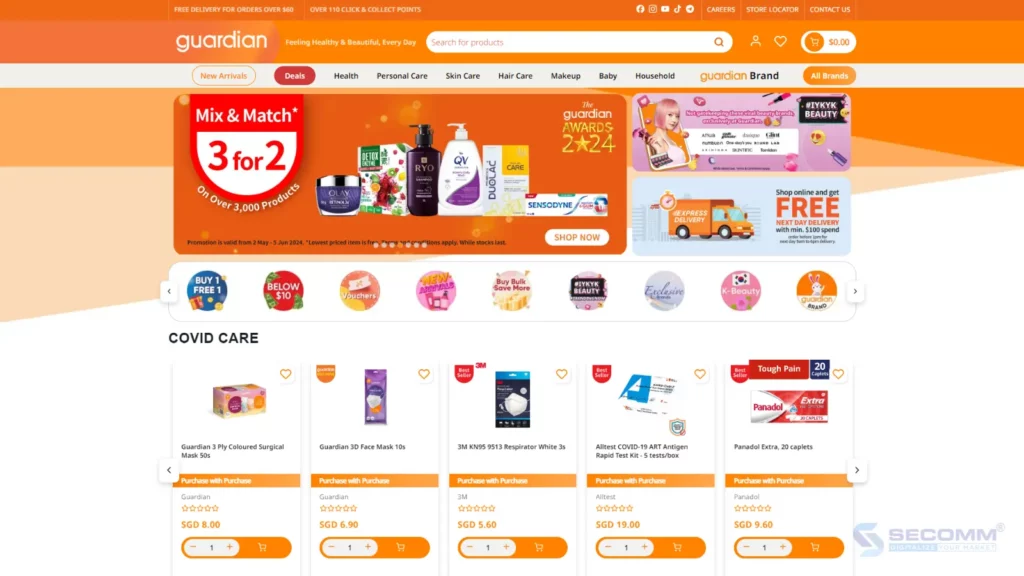
Guardian is a retail chain specializing in healthcare, cosmetics, and other consumer products. Guardian has a presence in many countries and regions worldwide, including Singapore, offering a range of products from renowned and reliable brands.
The eCommerce website of Guardian is built on the SAP Commerce Cloud platform, providing many useful features for users. Customers can easily search for and purchase products, manage their shopping carts, and make convenient payments. Additionally, the website offers promotions and online support services to help customers have a comfortable and secure online shopping experience. Furthermore, customers can also review and provide feedback on products, providing useful information for other users.
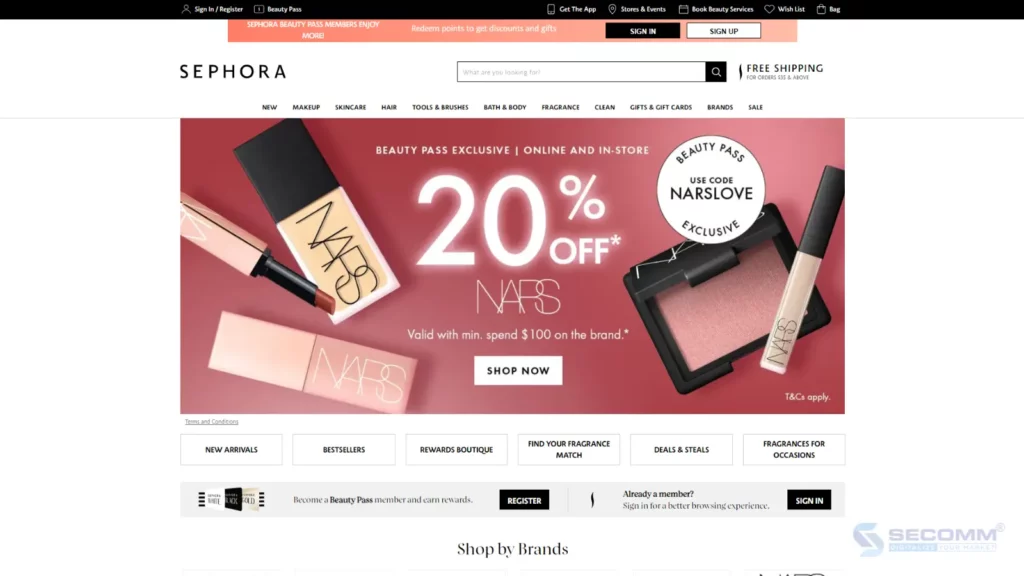
Similar to Guardian, Sephora is a global retail chain specializing in cosmetics and beauty, known for offering a variety of beauty products from leading brands worldwide. Currently, Sephora has a presence in the Singapore market with physical stores in major shopping centers and an eCommerce system, including a website and app for customers. Sephora is loved for its product diversity, customer care services, and innovation in the online cosmetics shopping experience.
Sephora’s eCommerce system in Singapore is built on Vue.js and Nuxt.js programming languages. With this system, Sephora’s customers can quickly search for and explore products through smart search bars and diverse filters. The online shopping experience is optimized with detailed product information, crisp images, and customer reviews.
The Sephora app is also highly regarded, making shopping easier for customers with features like “Virtual Artist” and receiving notifications about promotions. Overall, Sephora provides a range of features and services to meet customers’ cosmetics shopping needs, creating a professional and convenient online shopping experience.

Venus Beauty is one of the retail chains for cosmetics and personal care present in most shopping centers across Singapore, beloved for its product diversity and quality. Since its establishment in 2002, Venus Beauty has continuously grown and expanded, becoming a familiar destination for many local consumers.
The eCommerce website of Venus Beauty is built and developed on the Magento platform, with superior customization and scalability. Customers can easily search for and purchase products thanks to the intuitive and user-friendly website interface. Venus Beauty also regularly offers attractive promotional programs to attract customers to shop more on the website and app.

Lancôme Singapore is the branch of the renowned cosmetics brand Lancôme, part of the globally famous L’Oréal Group. Lancôme is known for its high-quality skincare products, makeup, and fragrances, always endorsed by beauty experts and celebrities. In Singapore, Lancôme not only offers premium products suitable for various skin types but also provides optimal online shopping experiences for customers.
The Lancôme website is developed on the Salesforce Commerce Cloud infrastructure with a user-friendly interface, allowing customers to browse, search, view products, and make purchases easily and quickly. The website also integrates AR technology to provide a “Virtual Try-On” experience, allowing customers to try on lipsticks, eyeshadows, and other products realistically before making purchasing decisions.

Cocomo is an eCommerce website specializing in beauty and personal care products from Korean brands. Cocomo boasts a rich product portfolio, including cosmetics, skincare products, haircare, and various other beauty items, catering to all customer beauty needs.
The Shopify website of Cocomo Singapore is designed with a clear, intuitive interface, making it easy for users to search for and select products. Product categories are organized logically, along with efficient search tools, making shopping quick and convenient. Cocomo frequently offers promotions, discounts, and special deals, helping customers save money. These promotional offers are regularly updated and can be easily found on the homepage or product category pages.

In Singapore, the skincare brand Paula’s Choice is just as renowned as in other markets. Founded by skincare expert Paula Begoun, the brand is famous for its science-backed skincare products, known to be safe and effective, free from harmful ingredients like fragrances or dyes.
Paula’s Choice eCommerce website is built on Shopify Plus. The website offers a range of skincare products, including cleansers, toners, serums, moisturizers, sunscreens, and specialized treatments like BHA, AHA, and retinol. These products cater to all skin types, from oily, dry, sensitive, acne-prone to aging skin. Each product on the website comes with detailed descriptions of ingredients, usage instructions, benefits, and supporting scientific research.
Paula’s Choice Singapore regularly runs discount programs, bundled gifts, and special offers for customers. Additionally, customers can easily access support from the customer service team via hotline, email, or live chat.
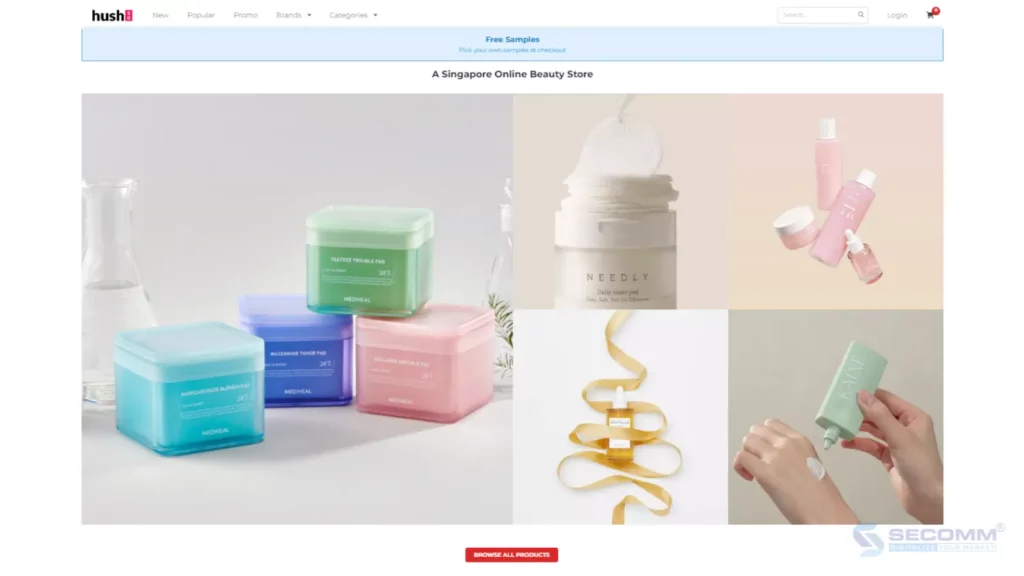
Hush is a familiar destination for Singaporean consumers when they need to shop for cosmetics online. This retail giant specializes in providing beauty and personal care products from various leading brands worldwide such as Laneige, Aveeno, Bioderma, CeraVe, and more.
The Hush website is designed to be simple, modern, and user-friendly. Customers can easily search and browse through products thanks to clear categories and efficient search tools. Additionally, customers can make payments by registering an account or as a guest. Hush also offers fast and free delivery services, allowing customers to track their orders and estimated delivery times.
Lời kết
In summary, the cosmetics eCommerce industry in Singapore has seen significant growth over the years with the presence of many reputable and well-known names. From international brands like Watsons, Lancôme, and Paula’s Choice to local eCommerce platforms like Cocomo and Hush, consumers have countless options to search for and purchase high-quality beauty and personal care products. Each website offers unique and convenient shopping experiences, catering to the increasingly diverse needs of customers.
Hopefully, the list above will help motivate many other beauty businesses to confidently build their own eCommerce websites.
Need more in-depth advice? Contact SECOMM today!
 2
2
 4,126
4,126
 0
0
 1
1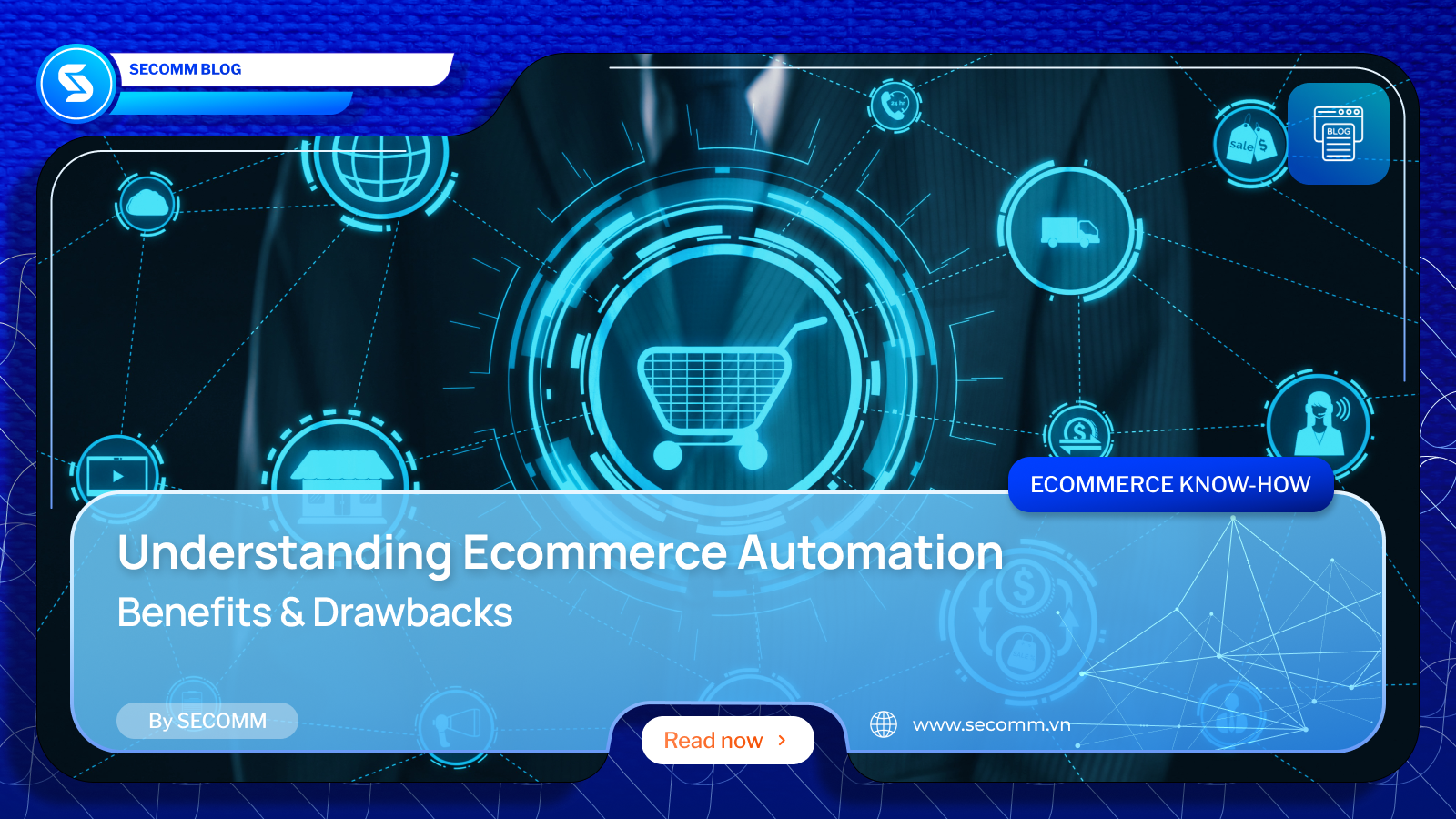
In today’s fast-paced digital world, eCommerce has become a crucial aspect of how businesses operate and grow. As global internet access and adoption rapidly increase, with over five billion internet users worldwide, the number of people making purchases online is ever-increasing. In 2024, retail eCommerce sales are estimated to exceed 6.3 trillion U.S. dollars worldwide, and this figure is expected to reach new heights in the coming years.
Knowing this, companies are constantly seeking ways to enhance efficiency, reduce errors, and provide a seamless customer experience. This is where eCommerce automation comes into play.
By leveraging advanced technologies and tools, businesses can automate repetitive tasks, streamline operations, and scale their efforts without the need for proportional increases in manual labor.
In this blog, we’ll dive into the concept of eCommerce automation, exploring its benefits and drawbacks to help you understand how it can transform your online business. Whether you’re a small startup or a large enterprise, understanding eCommerce automation can be a game-changer in optimizing your operations and staying competitive in the market.
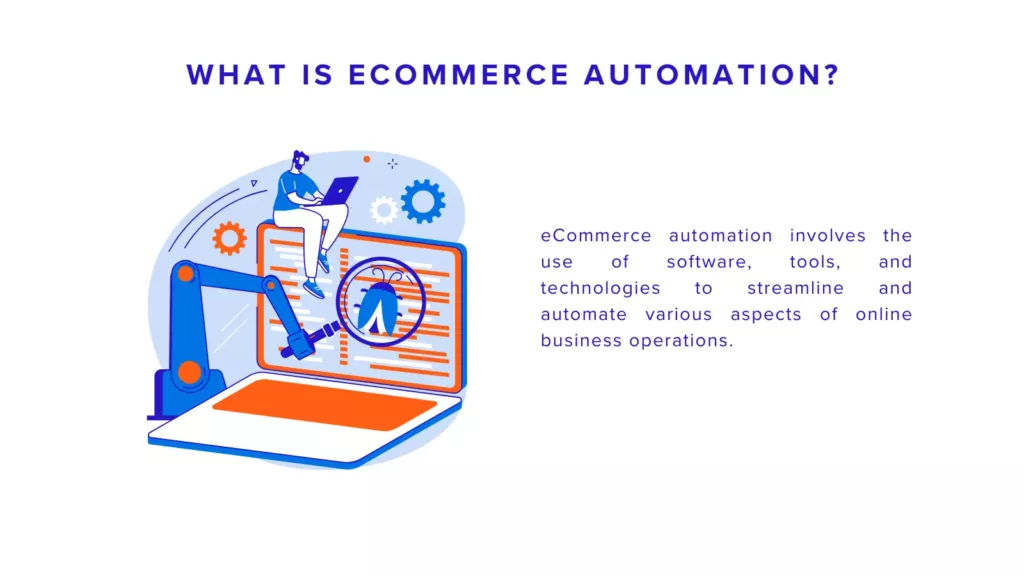
At its core, eCommerce automation involves the use of software, tools, and technologies to streamline and automate various aspects of online business operations. This includes a wide range of tasks, from inventory management and order processing to marketing campaigns and customer service.
Essentially, eCommerce automation aims to reduce the need for manual intervention in repetitive and time-consuming processes, allowing you to operate more efficiently and effectively. By automating routine tasks, you can free up valuable time and resources, enabling them to focus on strategic initiatives, innovation, and providing exceptional customer experiences. Whether it’s automatically updating inventory levels, sending personalized marketing emails, or providing instant customer support through chatbots, eCommerce automation empowers your team to work smarter, not harder, in today’s digital marketplace.
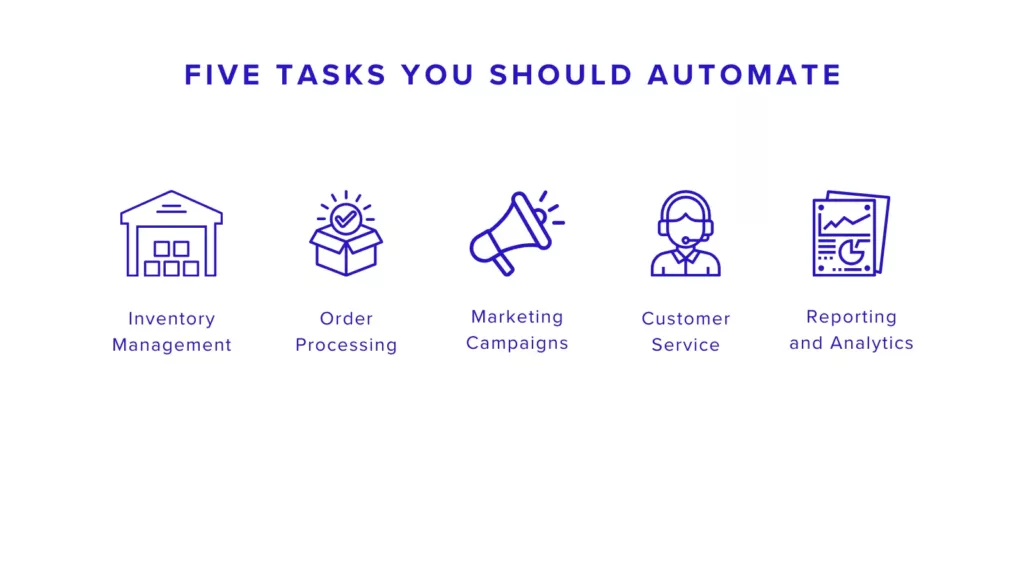
There are numerous tasks ripe for automation, but here are five crucial ones: inventory management, order processing, marketing campaigns, customer service, and reporting/analytics.
Imagine you run an online store selling various products. Keeping track of inventory levels manually can be time-consuming and prone to errors. With automation, you can set up systems that automatically update your stock levels whenever a purchase is made or new stock arrives. Additionally, you can configure alerts to notify you when certain items are running low, prompting you to reorder them before they run out.
When a customer places an order on your website, there are several steps involved in processing and fulfilling that order. Automation can streamline this process by automatically routing orders to the appropriate fulfillment center or warehouse. It can also generate packing slips and shipping labels, ensuring that orders are processed quickly and accurately. With automated order tracking, both you and your customers can easily monitor the status of their orders from placement to delivery.
Marketing is essential for promoting your products and attracting customers to your online store. Automation can help you save time and reach a larger audience by automating email marketing campaigns and social media posts. You can set up automated email sequences to welcome new subscribers, nurture leads, and recover abandoned carts. Similarly, you can schedule social media posts in advance, ensuring consistent engagement with your audience across different platforms.
Providing excellent customer service is crucial for building trust and loyalty with your customers. However, managing customer inquiries and support tickets manually can be overwhelming, especially as your business grows. Automation can help lighten the load by using chatbots and automated response systems to handle common inquiries and support requests. These systems can provide instant responses to frequently asked questions, route complex queries to human agents, and even offer 24/7 support, improving the overall customer experience.
To make informed decisions and track the performance of your online store, you need access to accurate data and analytics. Manually collecting and analyzing data from various sources can be time-consuming and prone to errors. Automation can simplify this process by automatically collecting data from your website, sales platforms, and marketing channels. It can then generate customized reports and dashboards, providing valuable insights into your sales performance, customer behavior, and marketing ROI. With automated reporting and analytics, you can make data-driven decisions to optimize your eCommerce operations and drive business growth.
By automating these five key tasks, you can streamline your eCommerce operations, improve efficiency, and focus your time and resources on growing your business and providing exceptional customer experiences.
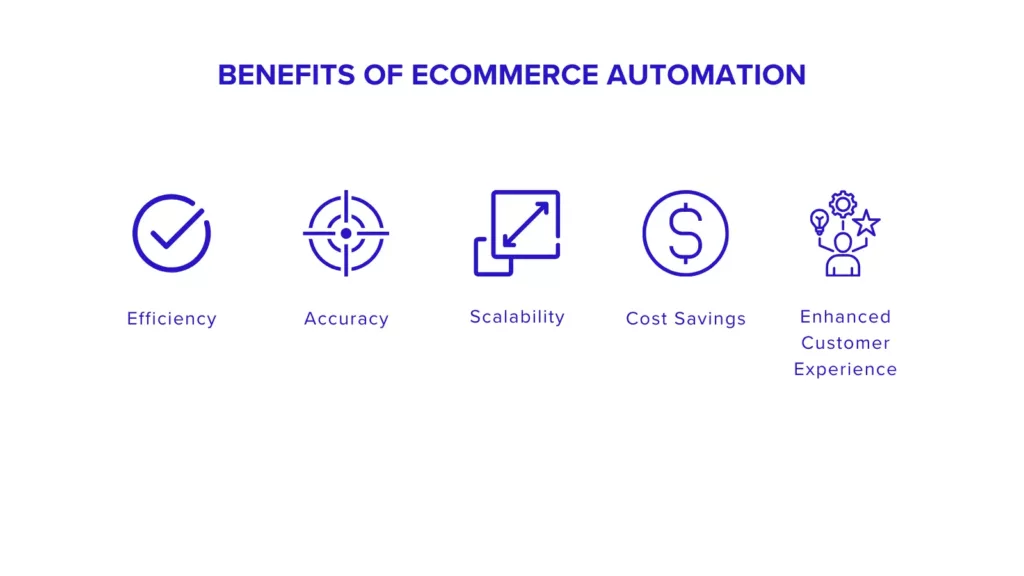
Adopting eCommerce automation can brings your business many benefits. Here are some of them
Automation streamlines your business processes by taking care of repetitive tasks, freeing up your time to focus on more strategic activities. Instead of manually updating inventory or processing orders, automation tools can handle these tasks quickly and efficiently, allowing you to operate more smoothly and effectively.
By reducing reliance on manual data entry and human intervention, eCommerce automation helps minimize the risk of errors. Whether it’s updating inventory levels or processing customer orders, automated systems can perform tasks with a high level of accuracy, ensuring that your business operations run smoothly and your customers receive the correct products on time.
As your eCommerce business grows, automation allows you to scale your operations without a proportional increase in workload. Whether you’re handling a handful of orders or thousands of transactions per day, automated systems can adapt to the increasing demands of your business, ensuring that you can meet customer needs efficiently and effectively.
While there may be initial investments required to implement automation tools and systems, the long-term cost savings can be significant. By streamlining your operations, reducing errors, and improving efficiency, eCommerce automation helps lower your overall operational costs, allowing you to allocate resources more effectively and invest in other areas of your business.
In today’s competitive eCommerce landscape, providing exceptional customer service is essential for building brand loyalty and driving repeat business. Automation plays a key role in enhancing the customer experience by providing quicker and more consistent service. Whether it’s responding to customer inquiries instantly with chatbots or delivering personalized marketing messages based on customer preferences, eCommerce automation helps create a seamless and enjoyable shopping experience for your customers, ultimately leading to higher satisfaction and loyalty.
By leveraging the benefits of eCommerce automation, you can streamline your operations, reduce costs, and deliver a superior customer experience, ultimately driving growth and success in the competitive online marketplace.
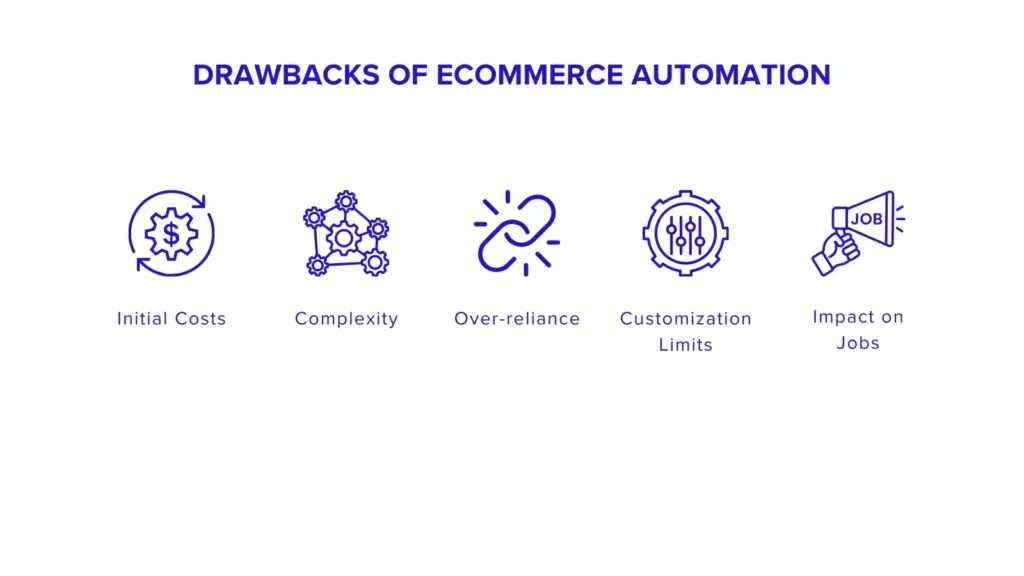
While eCommerce automation offers numerous benefits, there are also some drawbacks to consider.
Implementing eCommerce automation systems can incur significant upfront expenses. You may need to invest in software licenses, hardware infrastructure, and training for employees to effectively use these systems. For enterprises with limited financial resources, or don’t want to invest too much in this aspect, these initial costs can be a barrier to adoption.
Adopting eCommerce automation often involves navigating complex systems and technologies. You may encounter challenges in integrating automation tools with your existing workflows and processes. Additionally, employees may require time and training to familiarize themselves with the new systems, leading to potential productivity disruptions during the transition period.
While automation can enhance efficiency and streamline operations, your team risk becoming overly dependent on technology. Reliance on automated systems may leave you vulnerable to disruptions such as technical failures or system downtimes. Without proper contingency plans in place, these disruptions could significantly impact business operations and customer satisfaction.
Off-the-shelf automation solutions may not always fully align with the unique needs and requirements of every business. Customizing and tailoring automation tools to fit specific business processes can be challenging and time-consuming. You may find yourself constrained by the limitations of pre-built automation solutions, hindering your ability to fully optimize your eCommerce operations.
One of the most significant concerns surrounding eCommerce automation is its potential impact on employment. As your business automate repetitive and manual tasks, there is a risk of job displacement for workers whose roles are replaced by automated systems. This could lead to workforce reductions and require you to invest in reskilling and retraining programs for affected employees.
By understanding and addressing these drawbacks, you can make informed decisions about the extent to which you adopt eCommerce automation, mitigating potential challenges and maximizing the benefits of automation for your operations.
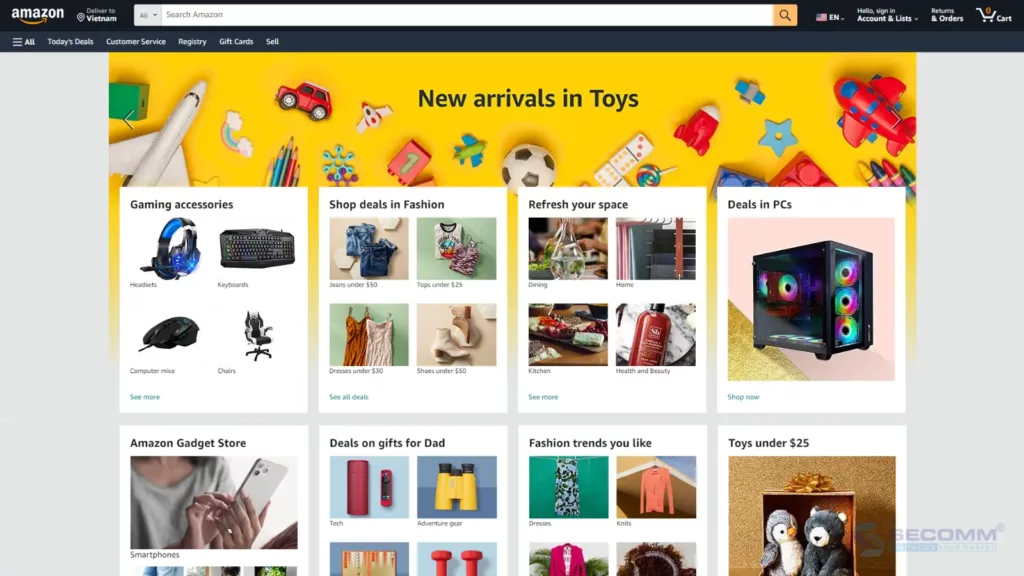
Background: Amazon, founded by Jeff Bezos in 1994, has evolved from an online bookstore to one of the world’s largest eCommerce platforms. With a vast array of products and a global customer base, Amazon’s success lies in its ability to innovate and optimize its operations continuously.
Automation Implemented: Amazon has heavily invested in automation across various aspects of its eCommerce operations.
Results: Amazon’s automation efforts have yielded several significant benefits:
Background: Sephora is a leading global beauty retailer known for its wide range of cosmetics, skincare, and fragrance products. With a strong presence both in physical stores and online, Sephora has built a reputation for offering high-quality products and exceptional customer service.
Automation Implemented: Sephora has leveraged automation to enhance its personalized marketing efforts, catering to the unique preferences of individual customers.
Results: Sephora’s automation efforts have yielded several positive outcomes:
Final Words
eCommerce automation offers significant benefits like increased efficiency and enhanced customer satisfaction, but it also poses challenges such as initial costs and job displacement. However, by carefully implementing automation tools and strategies, businesses can streamline operations and drive growth. Case studies of companies like Amazon and Sephora demonstrate the transformative impact of automation on eCommerce success.
Ready to take your eCommerce empire to the next level? Contact SECOMM today!
 2
2
 2,610
2,610
 0
0
 1
1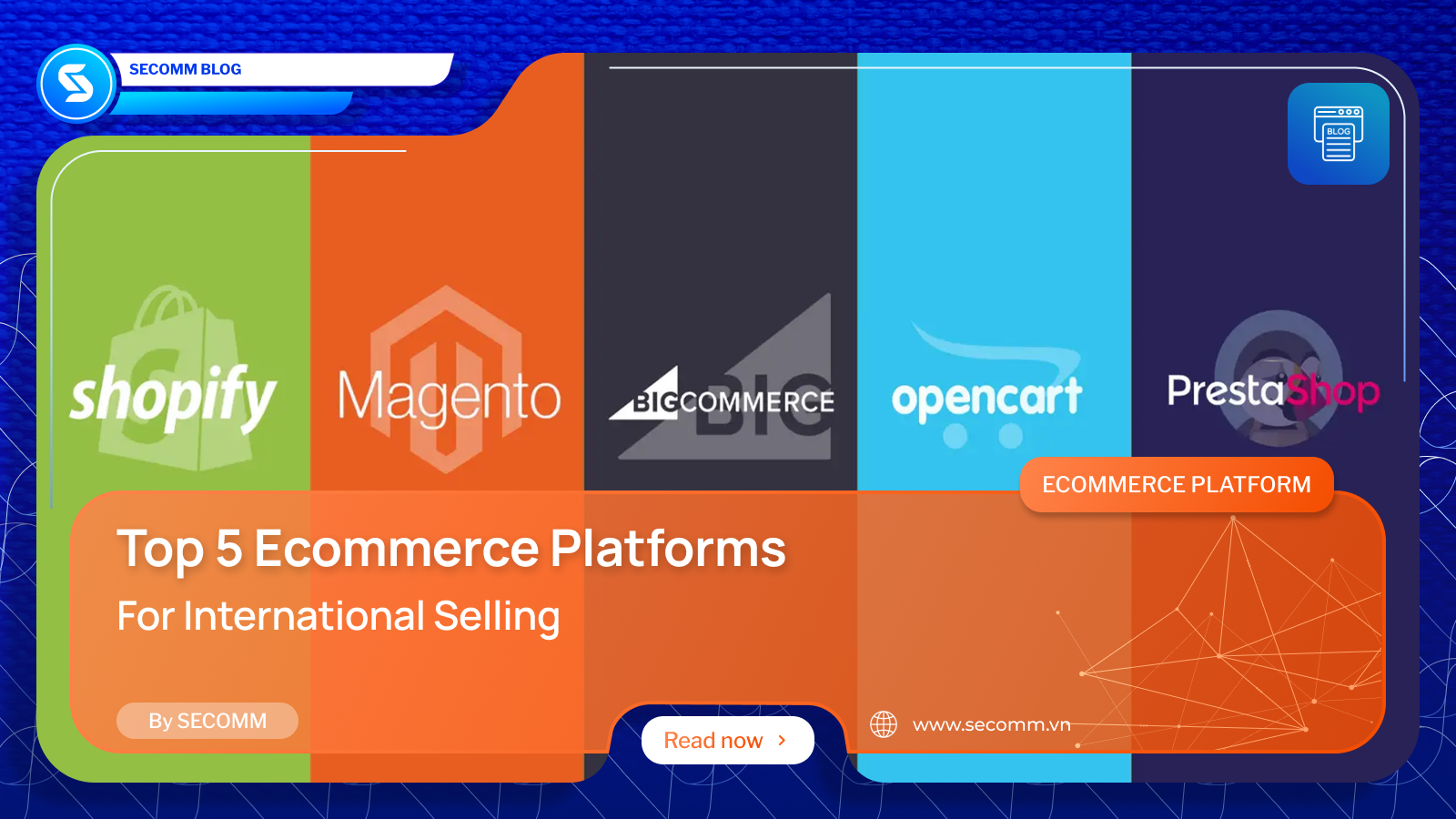
International eCommerce platforms are shaping the shopping trends of modern consumers worldwide, where geographical boundaries are no longer barriers to business activities. With the continuous development of technology and the internet, businesses have the opportunity to reach millions of customers around the globe more easily than ever. However, to succeed in the international market, choosing the right eCommerce platform is crucial.
In this article, let’s explore the top 5 platforms that effectively meet the needs of many businesses for implementing international eCommerce.
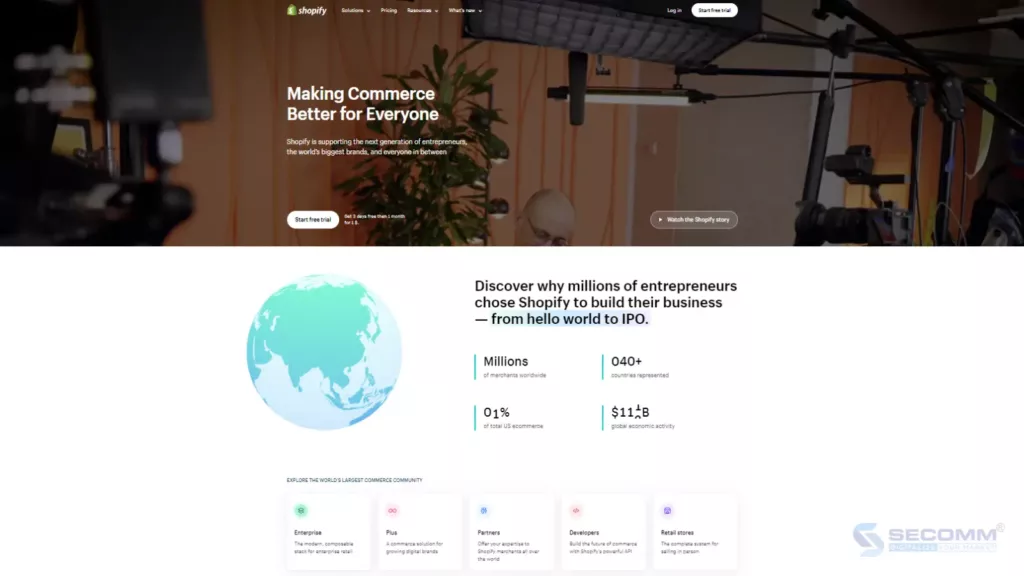
Shopify is a well-known SaaS eCommerce platform for businesses worldwide. It offers an all-in-one solution called Shopify Markets, allowing businesses to start selling in over 150+ different markets and manage efficiently on a single dashboard. Shopify Markets comes in two versions:
Integrated into all Shopify plans, providing core features including:
Fees are incurred per international transaction, including:
Includes all core features plus additional advanced features such as:
The cost of Markets Pro is 6.5% per transaction, including local payment processing fees, so businesses do not need to pay this fee separately. Additionally, businesses will pay 2.5% per transaction for currency conversion fees.
Advantages:
Disadvantages:
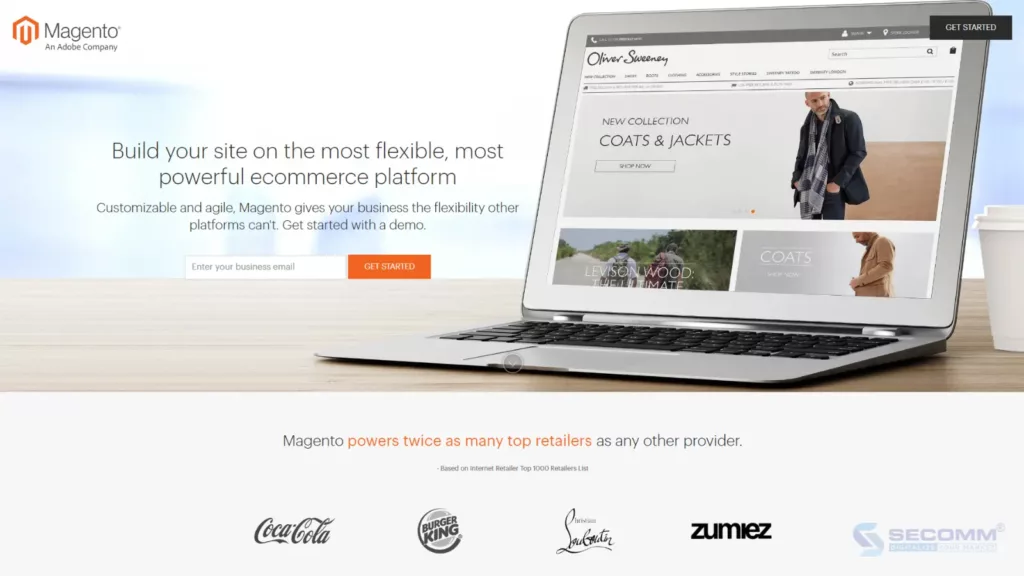
Implementing international eCommerce involves many challenges related to language, currency, and taxes, requiring websites to be optimally customized to provide the most engaging customer experience. This is why Magento is on this list.
Some standout features of Magento that support international commerce include:
Advantages
Disadvantages:
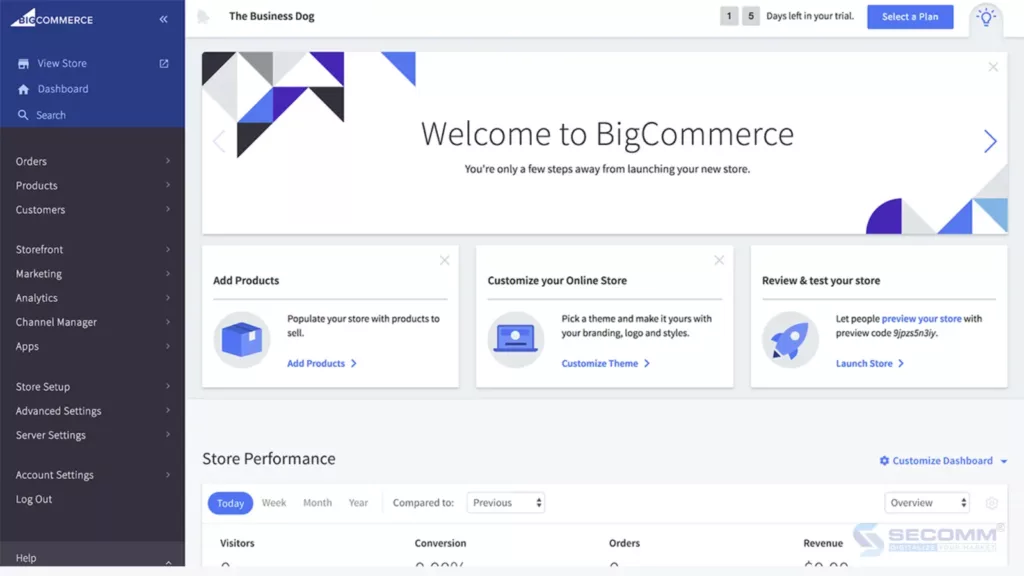
Similar to Shopify, BigCommerce is also a SaaS eCommerce platform that provides international eCommerce solutions. The platform offers features and tools to help businesses expand their operations in the international market simply and effectively.
Some standout features of BigCommerce supporting international eCommerce include:
Advantages:
Disadvantages:
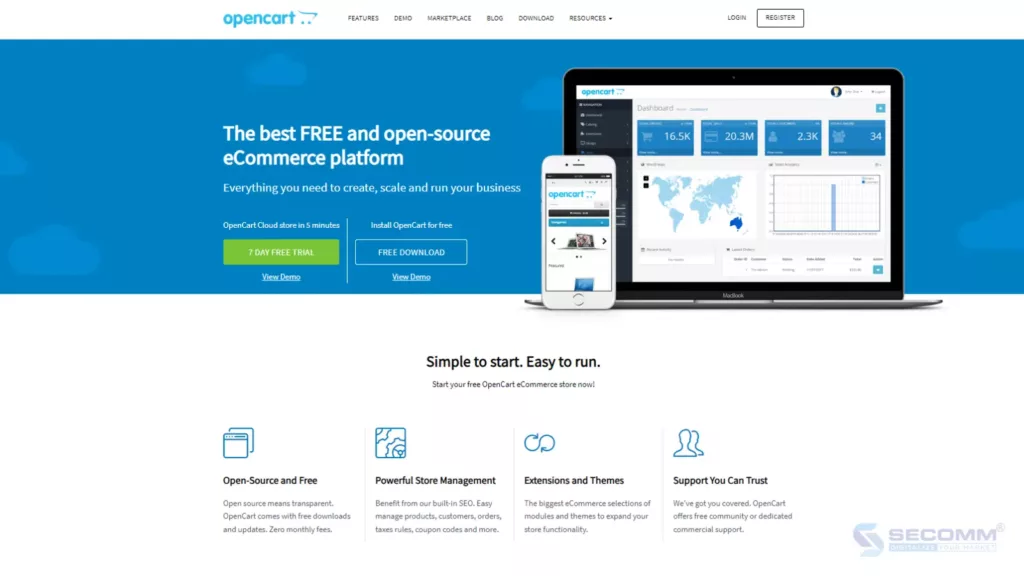
Similar to Magento, OpenCart is a popular open-source eCommerce platform used for international eCommerce implementation. This platform offers many useful features and tools, allowing businesses to better serve global customers.
Some standout features of OpenCart supporting international eCommerce include:
Advantages:
Disadvantages:
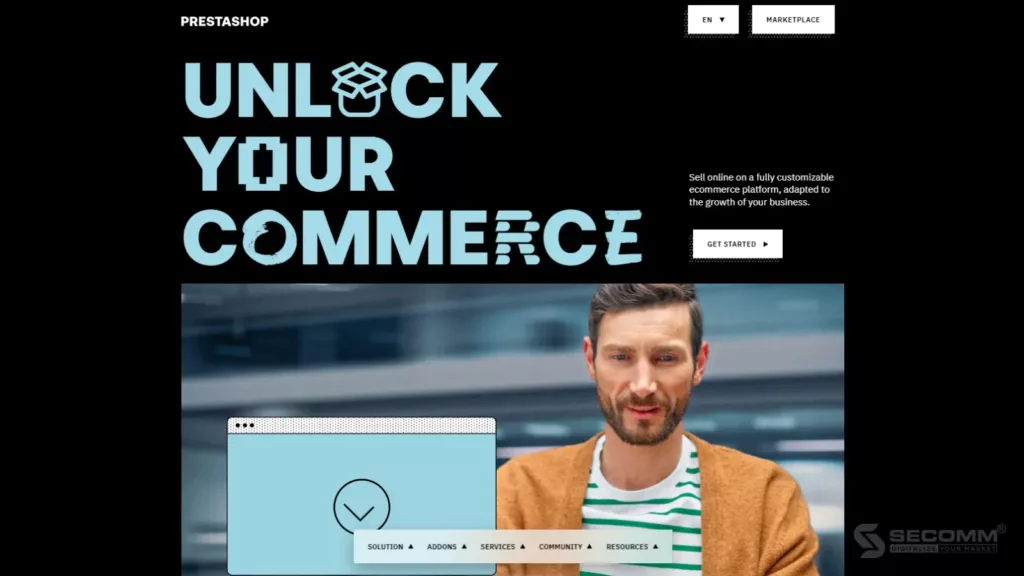
Another widely used open-source eCommerce platform for international e-commerce implementation is PrestaShop. With excellent customization and scalability, as well as outstanding tools and features, PrestaShop is the perfect choice for businesses looking to expand globally.
Some standout features of PrestaShop supporting international eCommerce include:
Advantages:
Disadvantages:
The Bottom Line
The above provides an overview of the top 5 platforms for implementing international eCommerce, each with its advantages and disadvantages. Depending on the scale, budget, and technical requirements, businesses can choose the most suitable platform for themselves.
Regardless of the choice, investing in a robust and flexible eCommerce platform will help businesses effectively reach international markets, increase sales, and expand their scale.
Need advice on implementing international eCommerce? Contact SECOMM today!
 152
152
 2,615
2,615
 0
0
 1
1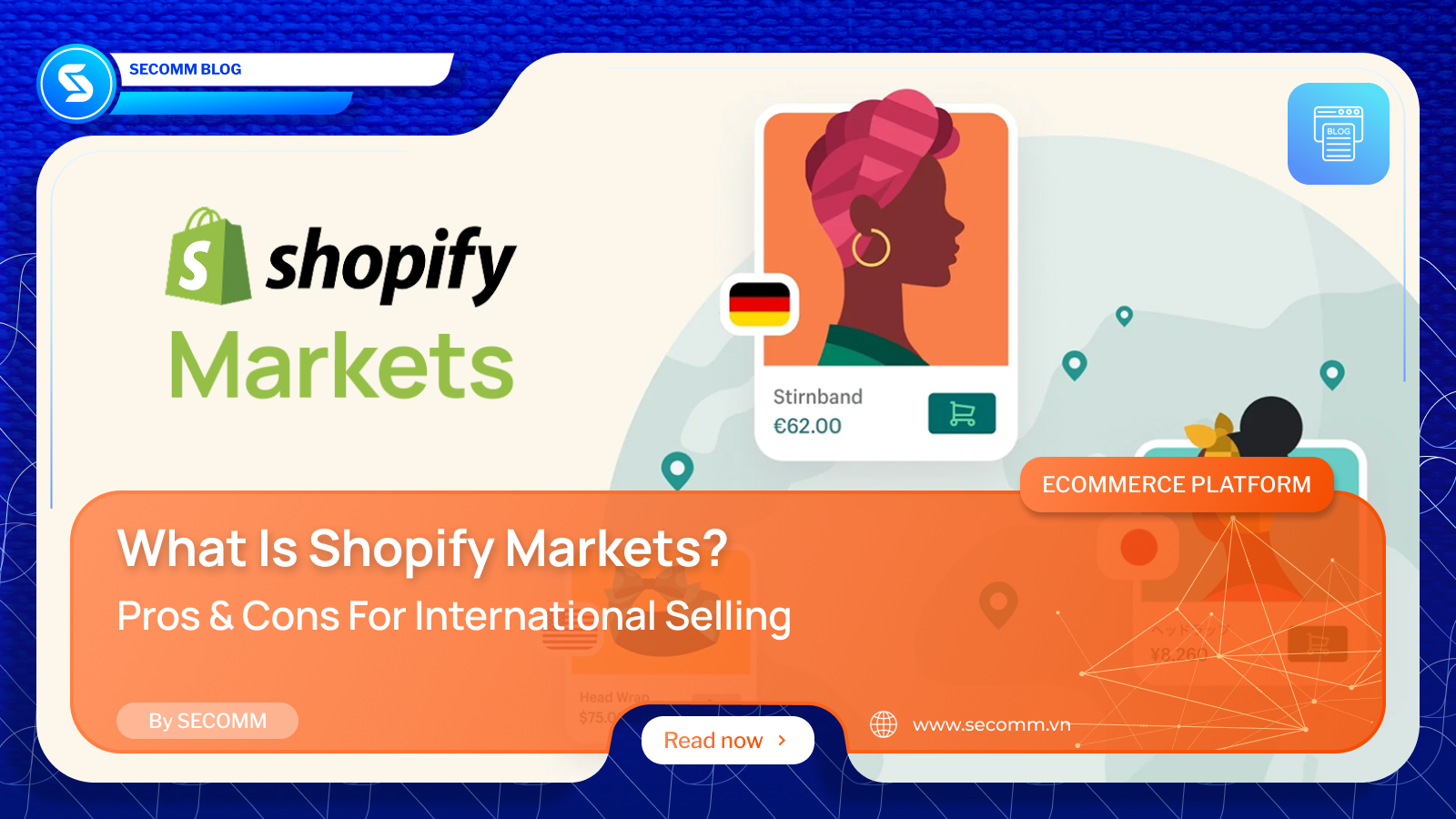
In the digital age, eCommerce is the key to helping businesses quickly and effectively reach global customers. Shopify, a renowned SaaS platform supporting online business, has launched the Shopify Markets solution to assist businesses in expanding into global markets. So, what is Shopify Markets? What benefits and challenges does this solution bring to your business when implementing international eCommerce? Let’s explore in the article below.
Shopify Markets is a new solution from the Shopify platform, designed to help you easily and efficiently expand your business into global markets. This tool allows you to manage multiple stores from a single dashboard, customizing each market with specific settings for language, currency, taxes, and payment methods. Moreover, Shopify Markets integrates with international shipping and logistics services, enabling you to optimize your operations and meet the demands of global customers.
Previously, multi-store setups have been done by using Shopify Plus, allowing merchants to establish and operate separate Shopify stores for each target market. This approach gave merchants full control over individual stores, such as running market-specific marketing campaigns, promotions, and inventory management.
However, this approach had several drawbacks. First, operating multiple standalone stores meant discrepancies in inventory levels, requiring data synchronization between stores. This process was time-consuming and prone to errors. Many merchants addressed this issue by integrating systems like PIM or ERP. Second, the workload increased due to the need to update content for each store individually. Third, many merchants complained about having to pay for the same app or integration across multiple stores, leading to inefficiencies in financial management.
Thus, the advent of Shopify Markets serves as a remedy for these three issues. Now, you can apply multi-language, multi-currency, international pricing, domain or subdirectory, and Geolocation features for the stores, all managed efficiently from a single dashboard.
When deploying international eCommerce, the importance of multi-language support cannot be overstated. According to CSA Research, 76% of online shoppers prefer to purchase products with information displayed in their native language. Meanwhile, 40% will never buy from eCommerce websites in a different language.
By using Shopify Markets and the built-ịn Translate & Adapt app, your website can be automatically translated into the languages of your target markets. Beyond mere translation, Shopify’s Translate & Adapt app can customize store content to better connect with local customers. This ensures that your eCommerce website maintains cultural, regional, and seasonal relevance—even when markets share the same language—the app can adjust for variations in vocabulary, spelling, and messaging.
Global customers want to see product prices in their own currency when shopping on eCommerce websites. A PayPal report supports this, showing that 76% of survey participants prefer to pay in their local currency. Shopify Markets can automatically convert product prices into over 130 different currencies to cater to your target customers. From product pages to shopping carts, and from checkout to refunds, Shopify Markets can create a seamless multi-currency shopping experience for customers, which will boost conversion rates and sales.
Shopify Markets can help create localized domains linked to specific languages and countries. For example, “myshop.com” could be the main site operating in the US, “myshop.ca” for the Canadian market, and “myshop.co.uk” for the UK. This not only increases credibility and optimizes SEO but also enhances brand recognition in each market.
Shopify Markets allows the setup of subdirectories for each language or region under the same main domain, such as “myshop.com/en” for English, “myshop.com/fr” for French, and “myshop.com/de” for German. Using subdirectories helps easily manage local versions of the store, improve user experience, and optimize costs related to maintaining multiple domains.
Payment methods significantly influence purchasing decisions. According to a Worldpay report, 27% of users will abandon the checkout process if they cannot find their preferred payment method.
With Shopify Markets, you can offer your customers a variety of local payment options, alongside familiar choices like credit/debit cards, PayPal, Apple Pay, and Google Pay. Some examples of local payment method integrations include:
When selling in international markets, pricing can be affected by duties and import tax. In many cases, unexpected costs for customers can lead to a negative shopping experience.
The Shopify Markets solution can help address this issue. This tool can calculate taxes based on the shipping address and the legal regulations of each country, including value-added tax (VAT), sales tax, and other import duties. When customers proceed to checkout, the system clearly displays these taxes, helping them understand the total shopping cost and avoid unpleasant surprises.
Shopify Markets also collects and remits these taxes to the appropriate tax authorities, saving your time and effort in handling tax procedures. This feature also integrates with shipping services to ensure all tax-related costs are accurately reflected, allowing you to plan expenses more effectively. Therefore, you can comply with legal regulations, enhance the customer shopping experience, and optimize your operations.
Shopify Markets is included in all Shopify plans, but the features available to merchants vary by plan. Here are the core features that all Shopify merchants can use when embracing Shopify Markets:
For the higher-tier plans, Advanced and Plus, merchants can access exclusive features. This is particularly beneficial for larger enterprises looking to establish and maintain a strong, competitive presence in international markets:
Shopify Markets Pro is the upgraded version of Shopify Markets, designed to offer more advanced features. This solution aims to support large-scale merchants in efficiently and flexibly managing complex international operations. The “Pro” version helps sell in over 150 different markets, providing powerful tools to optimize operations, manage taxes and costs, and enhance the international customer experience.
Some special features exclusive to the Pro version include:
Final Words
Shopify Markets is truly a robust solution for going globally and manage target stores efficiently and flexibly. However, alongside its strengths, this solution also has several notable limitations.
Depending on the scale, number of target stores, and the need to create a customized shopping experience, you can weigh the standard version against the Pro version. Nevertheless, you must carefully consider cost factors and management capabilities to ensure these solutions align with your strategies.
Need more advice? Contact SECOMM today!
 30
30
 2,760
2,760
 0
0
 2
2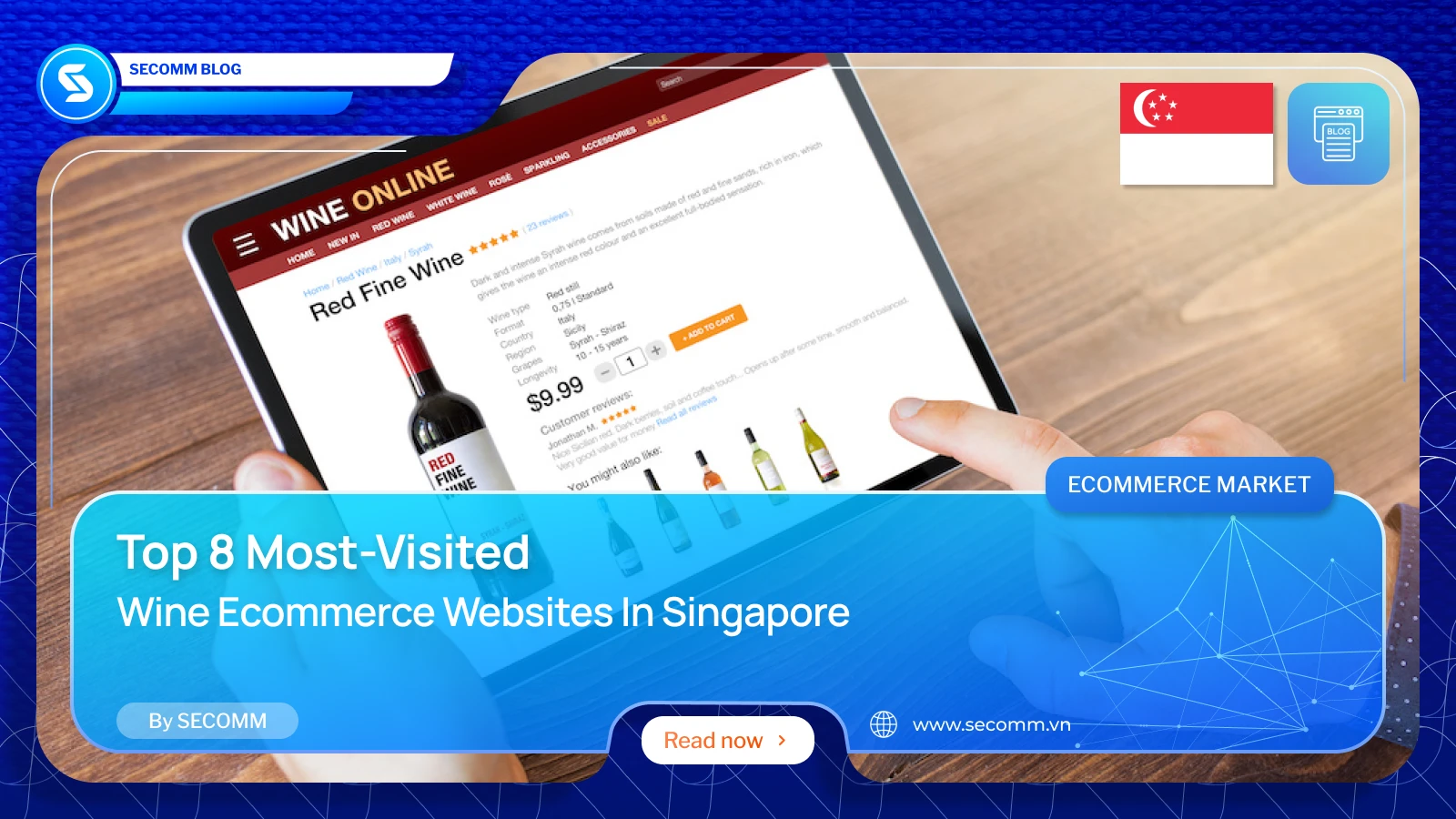
The wine eCommerce industry in Singapore is thriving, offering a wide variety of choices for consumers who appreciate fine wines and spirits from around the world. With the convenience and diversity of eCommerce websites, purchasing wine online has become easier than ever.
The following article introduces 8 leading wine eCommerce websites in Singapore, known as popular shopping destinations for modern consumers.
Paneco is one of the most beloved wine eCommerce sites in Singapore, renowned for its product quality, delivery service, and customer care. Established with the aim of providing a convenient and reliable online shopping experience, Paneco offers a rich catalog ranging from wines and spirits to specialty beers and sake.
Focusing on customer experience, Paneco chose the Spree Open Source platform to build its eCommerce website, allowing for customization and scalability. Features such as inventory display, product variations, combo purchases, and bulk buying have been optimized for customization. Paneco also implemented a loyalty program, enabling customers to register as members, earn points from purchases, and enjoy exclusive prices.
Cellarbration is an ideal destination in Singapore for wine and alcohol enthusiasts. This brand boasts an extensive collection of wines and alcoholic beverages from a wide variety of leading global brands.
Shopping on Cellarbration’s eCommerce website is highly optimized through the power of the Magento platform. Every aspect, from search functions and product browsing to checkout, is deeply customized to ensure an engaging shopping experience for customers.
Cellarbration is distinguished not only by its wide range of products but also by its professional and dedicated customer service. The brand is committed to customer satisfaction by offering personalized support and a variety of payment and delivery options.
The Liquor Shop is one of the prominent brands in the wine ommerce sector in Singapore, known for its richness and variety of high-quality imported liquors. With a mission to bring customers the finest liquor products from around the world, The Liquor Shop offers a range of options, from wines, whiskies, rums, and tequilas to unique beers and sojus.
This retailer’s liquor website is built on the infrastructure of Shopify Plus, allowing for easy customization of many features such as age verification, quick purchase, product search suggestions, and upselling prompts. Additionally, Shopify Plus’ flexible system enables integration with a range of popular payment methods such as Apple Pay, Google Pay, PayPal, Visa/MasterCard.
In Singapore, the Wine Connection brand is a favorite destination for wine enthusiasts looking to explore premium wines from the most famous wine regions worldwide. Wine Connection also offers customers a rich and diverse collection of wines.
Wine Connection’s Magento website is optimized for an enhanced experience, allowing customers to search for wines by origin, grape variety, and explore special collections, as well as choose preferred payment and delivery methods.
Not only does Wine Connection provide a modern and engaging online shopping space, but it also serves as a source of wine knowledge. Customers can find articles and detailed guides on selecting and enjoying wines to better understand the art and science behind the exquisite flavors.
Founded in 1983, Millesima is a reputable brand in the global retail wine industry, particularly renowned for its specialization in premium wines. Originating from France, Millesima has expanded its operations to many countries, including Singapore, to provide consumers with the opportunity to experience high-quality wines from renowned vineyards worldwide.
Millesima’s strength lies in its meticulous selection of wine products, ensuring high quality and clear origins. The product portfolio of Millesima includes wines from Bordeaux, Burgundy, Champagne, and many other famous wine-producing regions. Customers can find classic wines, limited editions, and even internationally award-winning bottles.
Millesima’s eCommerce wine website is elegantly designed and user-friendly, making it easy for buyers to search for detailed information about products and place orders online. Additionally, Millesima offers professional advisory services to help customers select wines that suit their preferences and needs.
Wine Fridge Singapore is a prominent brand in providing wine cabinets and related products for wine storage in Singapore. Known for professionalism and high quality, Wine Fridge Singapore specializes in offering wine cabinets from renowned brands, ensuring the ideal conditions for wine storage.
The strength of Wine Fridge Singapore lies not only in providing quality products but also in professional customer advisory and support services. They understand the needs of wine enthusiasts and collectors, providing suitable storage solutions to maintain the flavor and quality of wine over time.
The website of Wine Fridge Singapore provides detailed information about various wine cabinets, from small-capacity cabinets for personal needs to large cabinets for extensive wine collections. Some customized features include product comparisons, selecting products by size and color, quick payments with Shop Pay or Google Pay, etc.
The Wine Wholesales brand is known as a destination for purchasing high-quality wines, wine cabinets, and related accessories at attractive wholesale prices. This brand has built its reputation through product diversity and quality services, aiming to provide customers with smooth and convenient online wine shopping experiences.
The eCommerce website of Wine Wholesales is user-friendly, making it easy to search for and select products. Customers can easily find detailed information about each wine, including origin, flavor profile, and reviews from previous buyers. Additionally, Wine Wholesales regularly offers promotions and discounts, allowing consumers to purchase quality products at affordable prices.
This is a prominent name in the retail wine sector in Singapore, specializing in providing premium wines from around the world. Wines Online’s strength lies in its product diversity, ranging from wines and spirits to soju and sake, especially low-alcohol or non-alcoholic beverages.
Wines Online’s eCommerce website is built on Shopify, featuring an intuitive interface that allows customers to easily search for and select products. Wines Online Singapore is also known for its fast and reliable delivery service. They ensure that products are delivered to customers safely and on time. Additionally, Wines Online’s advisory team is always available to assist customers with any inquiries or requests, ensuring that every customer has the best shopping experience.
Wrap Up!
Here are the 8 most prominent eCommerce wine websites in Singapore. Each brand brings its own unique advantages, from product diversity and service quality to convenient shopping experiences.
Looking for advice on building an eCommerce wine website? Contact SECOMM now!
 2
2
 2,545
2,545
 0
0
 1
1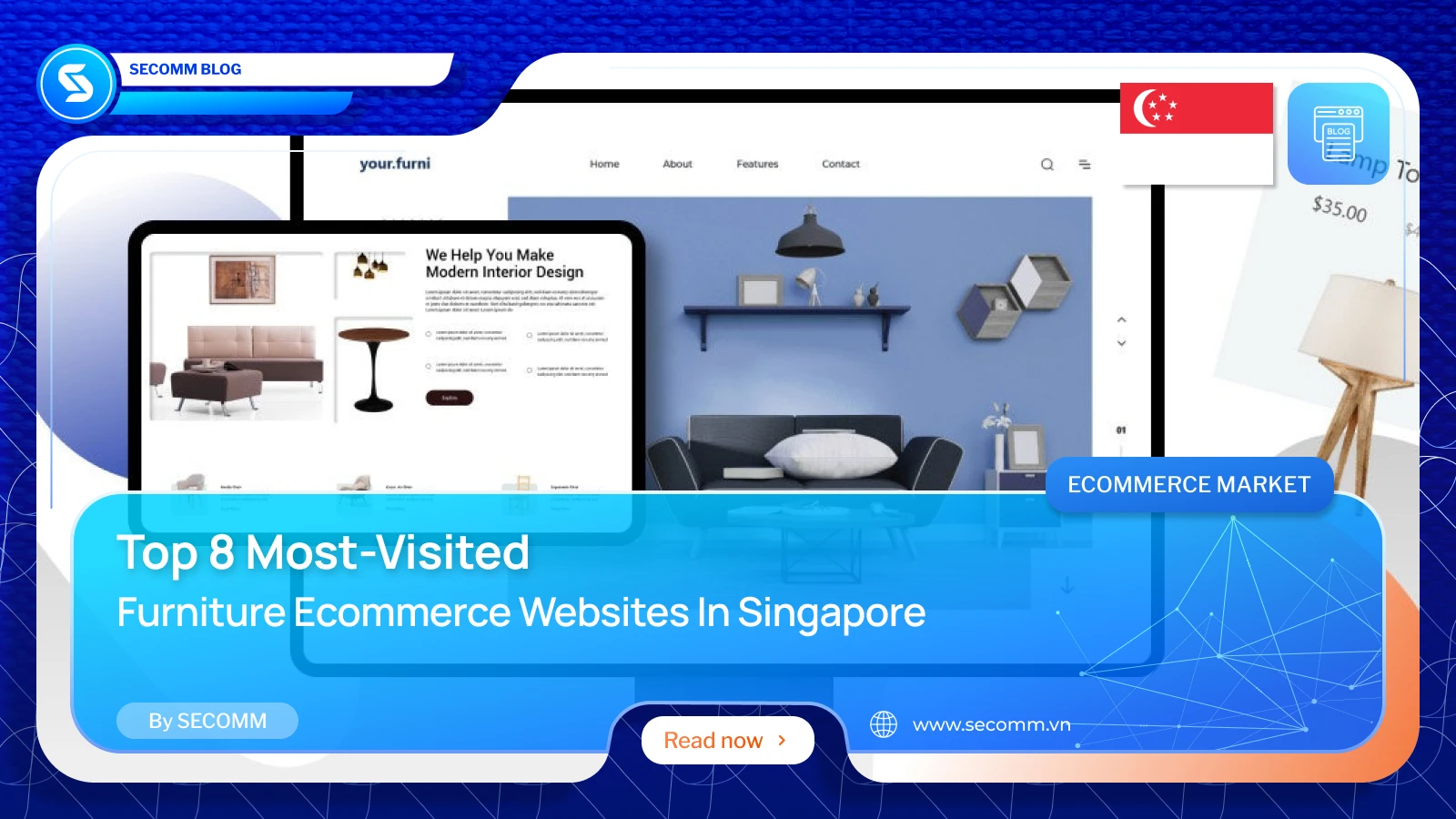
Shopping for furniture through eCommerce platforms has become a defining trend in modern living, particularly in developed nations like Singapore. Online furniture shopping offers not just convenience but also gives consumers to a diverse range of styles and price points.
The following article introduces the top 10 furniture eCommerce websites in Singapore, where you can find inspiration to develop your own similar website.

FortyTwo is a furniture and home goods brand, established in 2007 in Singapore. FortyTwo offers a wide range of products from bedroom furniture, living room sets, kitchenware to home accessories and interior decor. Renowned for providing quality products at competitive prices, along with fast delivery and attentive customer service, the brand frequently updates and expands its product portfolio to meet diverse customer needs.
FortyTwo’s website is built on the Magento Open Source platform (Adobe Commerce free version). With this eCommerce website, users can easily search and filter products, explore a variety of product categories from furniture to home goods. Additionally, the website offers the capability to integrate enticing promotional tools and customer support, accompanied by fast and secure delivery services.
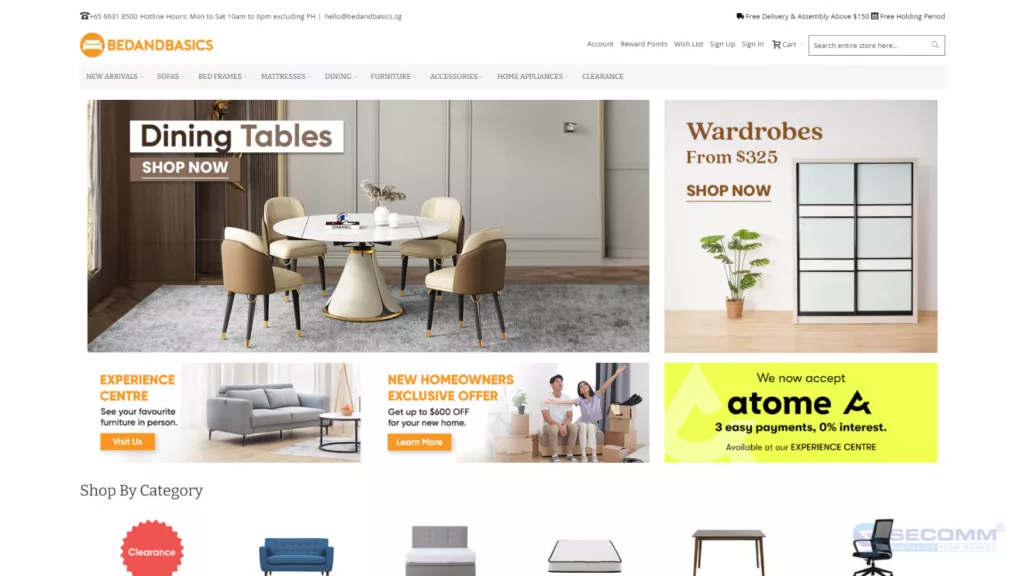
BEDANDBASICS is a leading eCommerce website in Singapore, specializing in providing quality furniture at affordable prices. The BEDANDBASICS website is built on the Magento platform, one of the most popular eCommerce platforms today. This not only enables the website to have high scalability and customization but also ensures stable operational performance and security for online transactions.
Using Magento, this brand can optimize product management, orders, and inventory, while also providing a more engaging shopping experience. The inventory management system automatically updates product quantities in real-time, ensuring that customers are always aware of the stock status of the products. Additionally, the website supports various payment methods, including the buy now, pay later option with Atome.
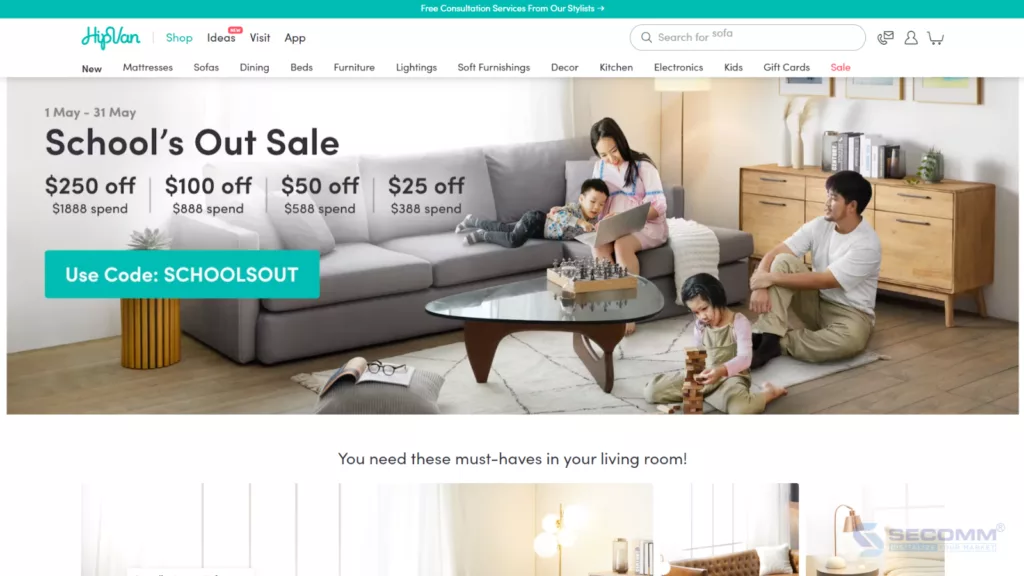
HipVan is an online retail eCommerce website for furniture and home decor based in Singapore. Established in 2013, the brand aims to provide customers with high-quality furniture products at affordable prices, along with convenient shopping experiences and attentive customer service.
HipVan’s furniture eCommerce website is built using the Ruby on Rails and React frameworks, with Ruby as the primary programming language. Prominent features of HipVan include building a community for sharing interior design ideas, image-based product search, and allowing customers to upload images of desired products. Particularly, the augmented reality (AR) feature enables customers to view products in their real-life space before purchasing. Moreover, HipVan offers free interior design planning services, helping customers conveniently ideate and plan their living spaces.
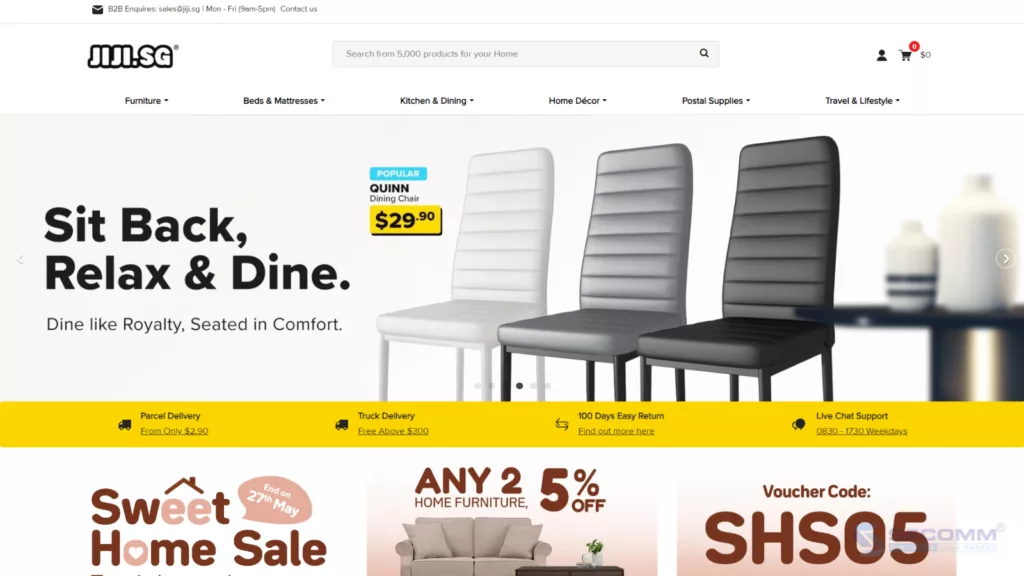
JiJi.SG is one of the favored online shopping destinations for furniture items in Singapore. Here, customers can easily find a diverse range of high-quality products from chairs, beds, sofas to household items such as shelves, cabinets, and towels.
Built on the PrestaShop platform, JiJi.SG’s eCommerce website boasts high flexibility, making it easy to customize and expand to accommodate increasing traffic. The website allows searching and filtering products by size, color, and design, helping customers easily find items that meet their needs. JiJi.SG provides customer support services via live chat, offering a convenient and quick online shopping experience. Additionally, JiJi.SG offers a variety of payment methods, including the PayNow eWallet – one of the popular payment methods in Singapore, providing convenience and peace of mind for customers during transactions.
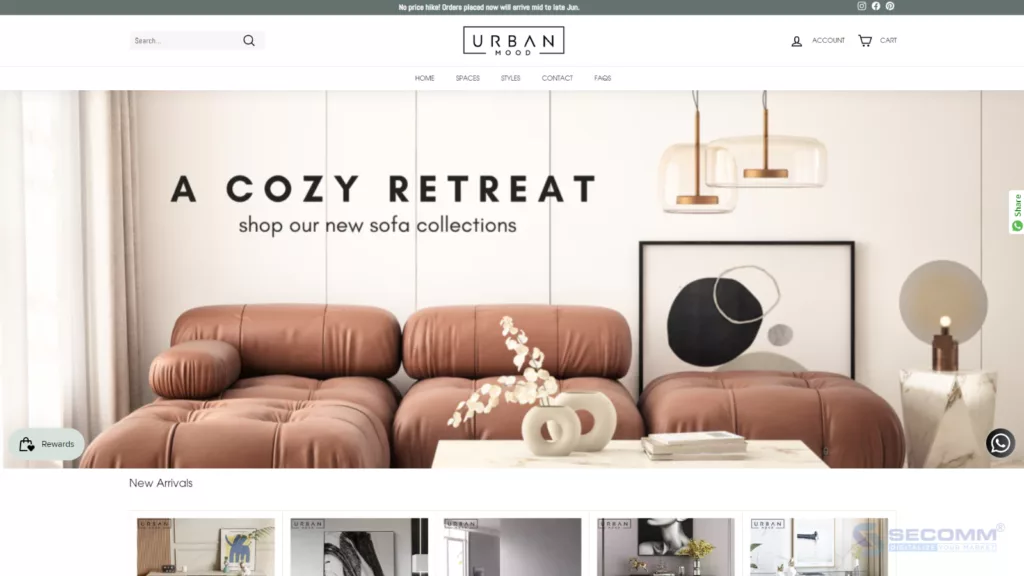
Urban Mood is renowned throughout Singapore and several countries in the Asian region for its finely crafted, high-quality, and contemporary furniture products. Urban Mood’s range extends from living rooms to dining rooms, from bedrooms to kitchens. All are meticulously curated to bring freshness and uniqueness to customers’ living spaces.
Urban Mood has chosen Shopify to build a customized eCommerce website aimed at selling in foreign markets and reaching a broader base of potential customers. Accordingly, Urban Mood has integrated international shipping features and customized currency display to cater to different market needs. Additionally, the brand has integrated ShopBack, allowing customers to experience cashback shopping directly on Urban Mood’s eCommerce website.
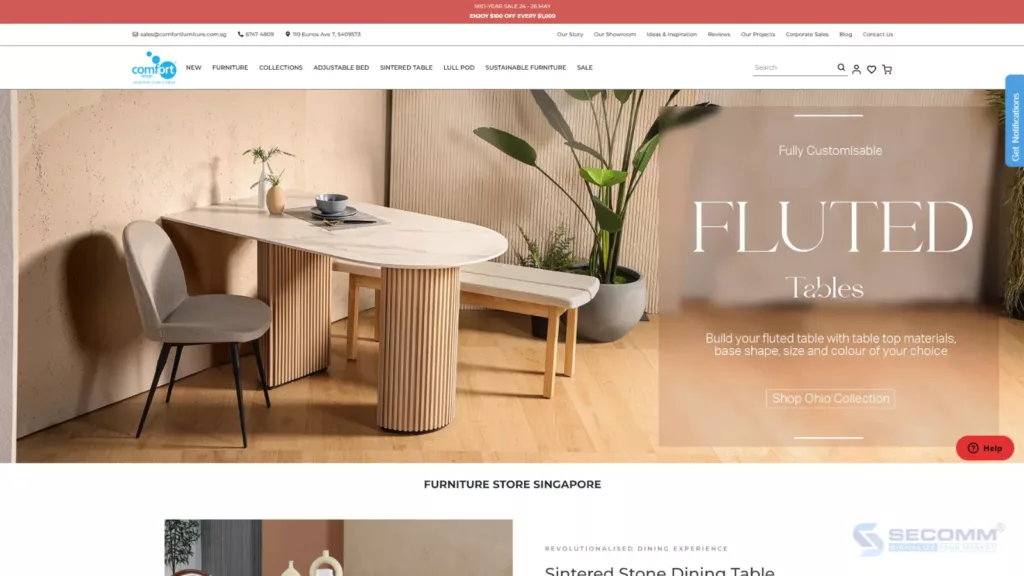
Comfort Furniture is known as one of the leading furniture retail brands in Singapore. With over 20 years of presence in the market, this powerhouse has brought a wide range of quality, aesthetically pleasing products to Singaporean consumers, catering to various styles. Comfort Furniture not only emphasizes product quality but also places special emphasis on customer service. They are committed to providing fast delivery and attentive after-sales support, ensuring that customers’ shopping experiences are always excellent.
Comfort Furniture’s eCommerce website is custom-built to provide an optimal shopping experience. Customers can not only check the inventory of any product but also choose the color and size. Comfort Furniture offers a large color code list and has an experienced team available to advise customers on selecting products and coordinating suitable colors for each space.
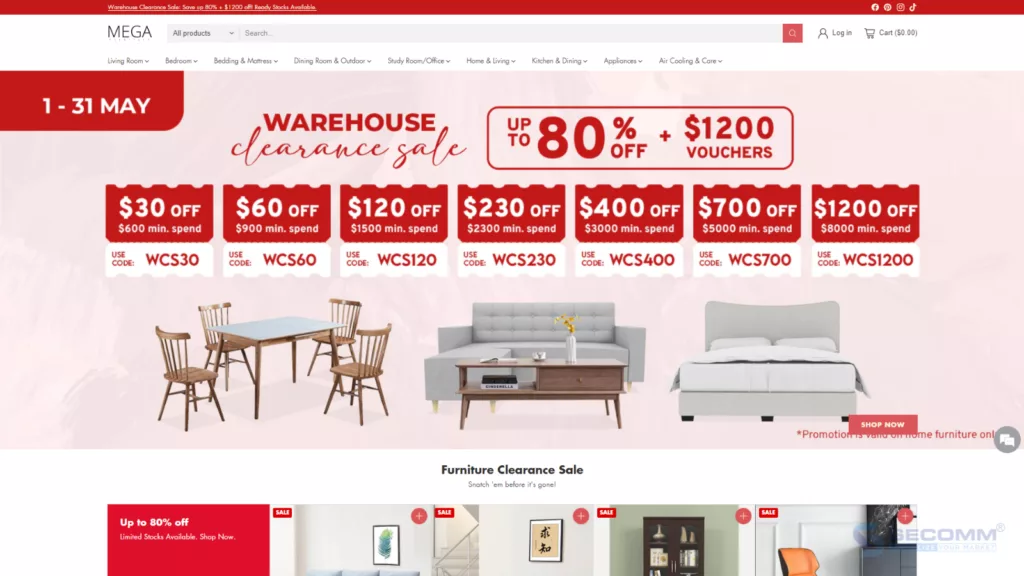
Megafurniture is a leading furniture retail giant in the Singapore market. With a commitment to providing luxurious and convenient living spaces for customers, Megafurniture has become the perfect choice for those seeking creative ideas to design their own unique living spaces.
Megafurniture’s furniture eCommerce website is beautifully designed and optimized on the Shopify Plus platform, with clearly organized categories to help customers easily search, select, and purchase products. Especially, the website also provides detailed information about each product, including images, descriptions, and specifications, helping customers make purchasing decisions more effectively.
Megafurniture allows customers to pay upfront and pay later through flexible payment methods such as Grab and Atome, creating convenient conditions for customers in managing finances and choosing suitable payment methods.
To encourage repeat shopping activities, Megafurniture integrates ShopBack into the Shopify Plus eCommerce system to implement a cashback shopping program. This helps customers receive a portion of cash back after each purchase, increasing the competitiveness and attractiveness of shopping at Megafurniture.

Beloved across Singapore in recent years, Originals offers consumers high-end and unique furniture products. Items at Originals are impeccably designed, blending modernity with minimalist style. From sofas, dining tables, beds to decorative items, each product is designed to bring comfort and style to living spaces.
Originals leverages Shopify Plus to build an eCommerce website that focuses on user experience and interactivity. The interface is intuitively designed and minimalist, easy to navigate, allowing customers to easily search for products, make purchases, and complete transactions.

Grey & Sanders, a renowned furniture brand from Singapore, is known for its exquisite craftsmanship and superior quality products. Specializing in furniture made from natural wood and premium leather, from dining tables, sofas, beds to decorative accessories, all are designed to bring natural beauty and luxury to living spaces.
Grey & Sanders utilizes the Magento platform to build its eCommerce website and leverages the flexibility of this platform to handle large transaction volumes and high traffic. The interface is designed to be bright, friendly, and easy to navigate, helping users easily search for and select products. Moreover, the website integrates a geolocation feature to help customers easily locate Grey & Sanders stores on an intuitive map.
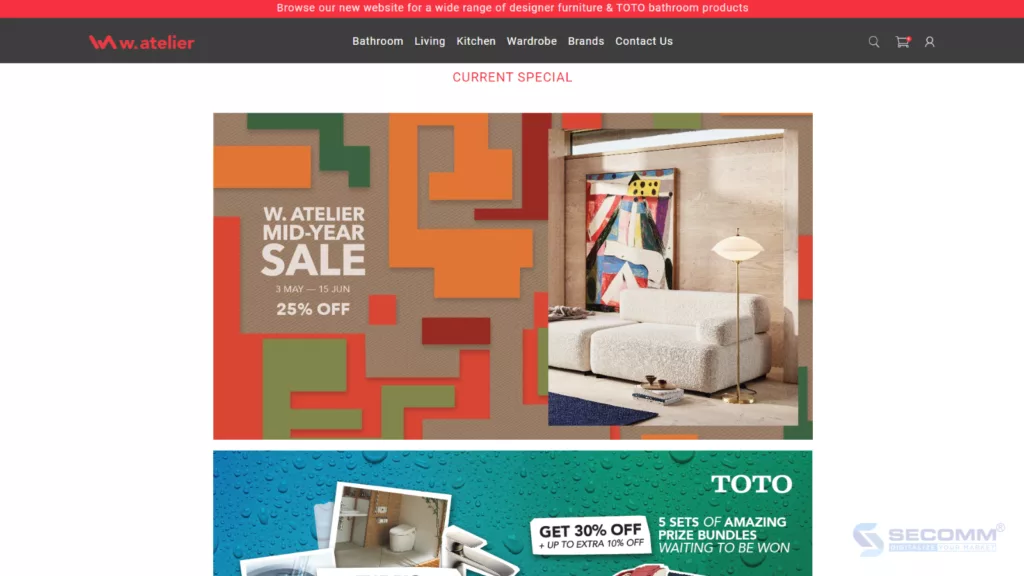
W.Atelier is a leading furniture retailer in Singapore, specializing in providing premium and unique products from some of the world’s most prominent brands such as Cassina, Binova, Fritz Hansen, and Geberit. Customers can find modern, sophisticated, and stylish furniture suitable for various spaces, from small apartments to luxurious villas.
The W.Atelier eCommerce website is built on the Shopcada platform, focusing on designing an easy and convenient online shopping experience, with clear product categories and detailed information. Additionally, W.Atelier is renowned for its professional customer service and thoughtful after-sales policies, ensuring that every shopping experience is smooth and satisfactory. With a commitment to quality and style, W.Atelier has become one of the leading furniture brands in Singapore, the ideal choice for those seeking perfection and sophistication in every detail of their living spaces.
Final Words
Here are 10 eCommerce furniture websites from major brands in Singapore. These websites have been the go-to online shopping destinations for consumers here for many years whenever they need inspiration to decorate their living spaces. By applying modern technologies and smart business strategies, these giants have provided customers with the most authentic furniture shopping experience in the online environment.
Need advice for building eCommerce furniture website? Contact SECOMM today!
 2
2
 2,960
2,960
 0
0
 1
1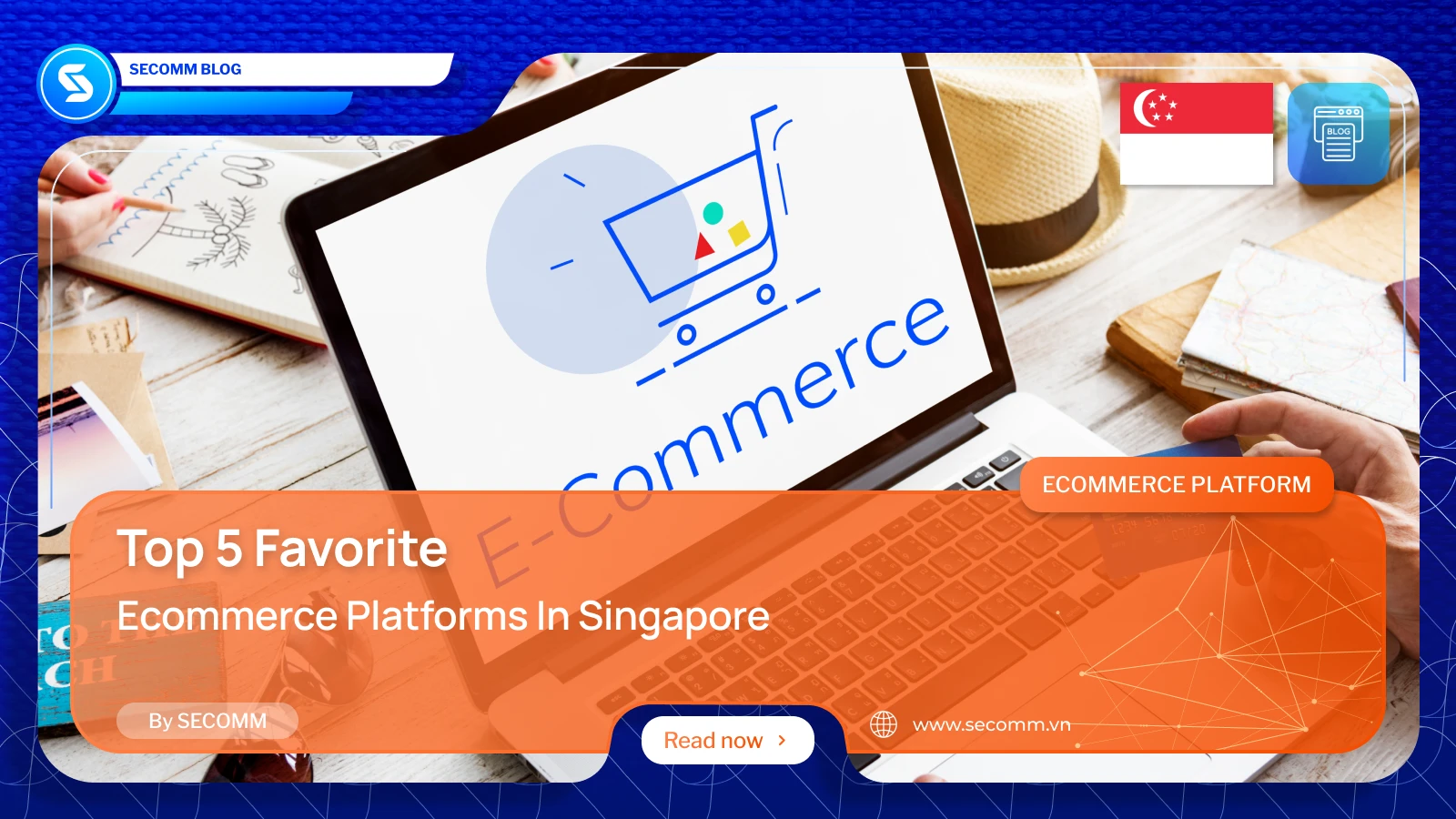
eCommerce in Singapore is continuously evolving with the emergence of new technological solutions. As a result, the options for eCommerce platforms are becoming increasingly abundant and diverse. This presents both opportunities and challenges for every merchant, as selecting the right platform to build an eCommerce website is a crucial first step.
Here are the five most commonly used eCommerce platforms in the Lion City.

Shopify is a popular SaaS eCommerce platform with over 4.8 million active websites. In Australia alone, over 8 thousands live stores are operating on the Shopify platform.
Recently, the premium version of Shopify, ‘Plus,’ has garnered attention from businesses across various sectors in Singapore. These merchants may have previously deployed different eCommerce platforms and later switched to Shopify Plus to seek a superior solution. Some merchants initially launched websites with standard Shopify packages and later upgraded to ‘Plus’ to optimize their operations.
Key features:
Pros:
Cons:
Shopify Pricing

Magento is a globally popular open-source platform, and its prevalence extends to Australia as well. According to BuiltWith, there are currently about 661 e-commerce websites operating on the Magento platform in the Lion Island.
With its high flexibility, merchants can effortlessly tailor features and scale the system according to their unique business requirements.
Presently, Magento provides two versions: Open Source (Free) and Adobe Commerce (Paid).
Key features:
Pros:
Cons:
Pricing:
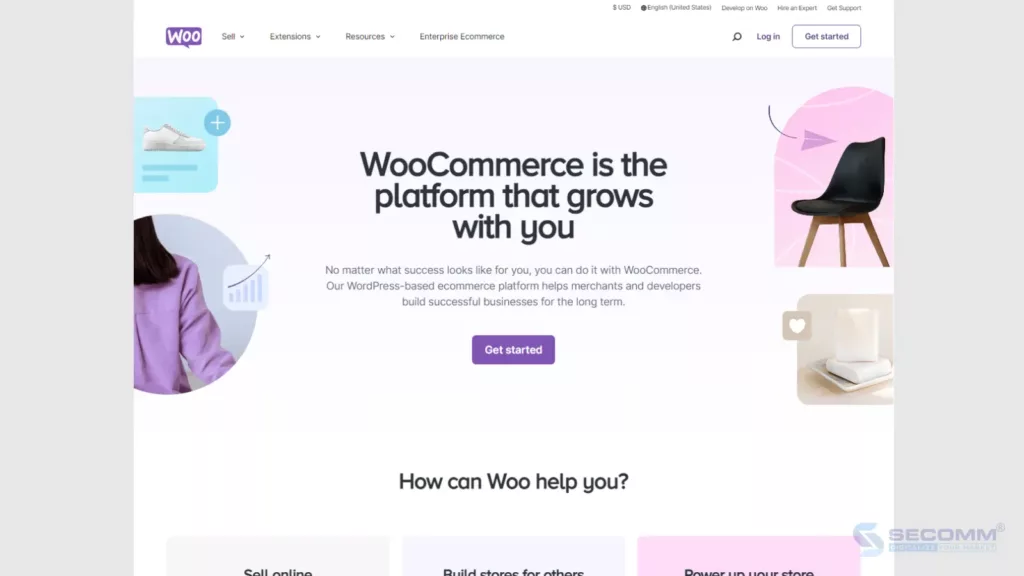
WooCommerce, a free and open-source WordPress plugin, enables brands to integrate eCommerce functionality into their existing WordPress websites. With just a few clicks, the WooCommerce plugin helps convert a standard WordPress site into a fully-featured eCommerce platform, complete with essential features and easy customization. At the time of writing, there are over 13,000 WooCommerce eCommerce websites operating effectively in Singapore.
Key features:
Pros:
Cons:
Pricing: Free to use. However, some integrations with other plugins may incur charges.
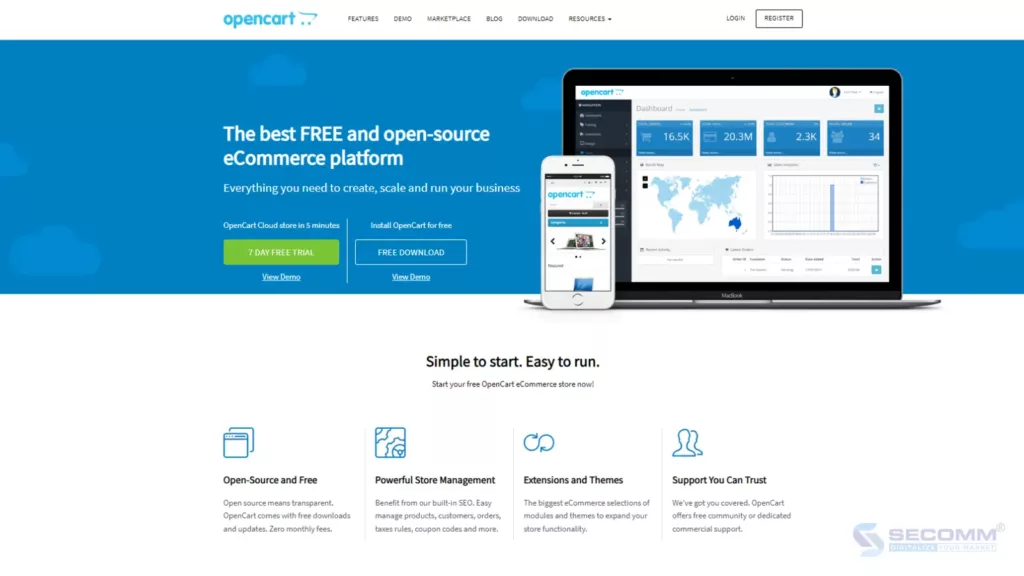
OpenCart is a globally popular open-source eCommerce platform, powering over 900 thousand active websites worldwide. In Singapore, it has gained popularity with more than 1,600 live OpenCart sites, establishing itself as a favored open-source platform in the country, following Magento.
Founded by Daniel Kerr in 1998, OpenCart operates as open-source software, utilizing the PHP programming language. It currently offers two versions: Free (Free-to-use version) and Cloud Store (Paid version).
Key features:
Pros:
Cons:
Pricing:
Free for the Free version. For the Cloud Store version, the specific costs are as follows: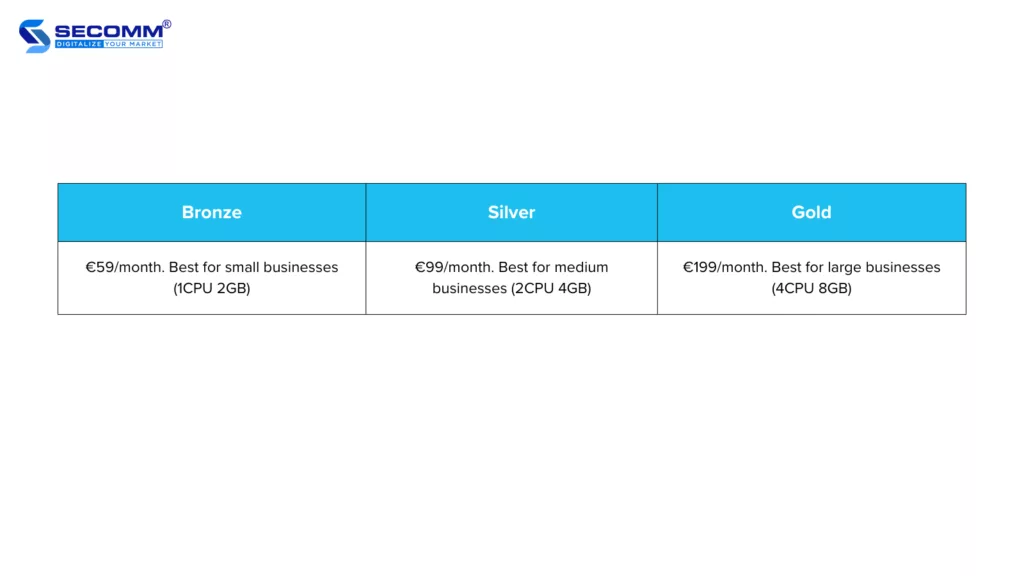
The ‘Cloud Store’ version pricing plan

Another open-source platform that is equally popular in Singapore is PrestaShop, with over 270 eCommerce websites currently in operation. The strength of PrestaShop lies in its flexibility and high customization capabilities, allowing users to easily adjust functionalities and interfaces to meet their specific needs. Additionally, with a vibrant developer community and thousands of available modules and themes, PrestaShop not only provides a comprehensive eCommerce solution but also continuous support to ensure that websites run smoothly and efficiently.
Key features:
Pros:
Cons:
Pricing: Free to use, but charges apply for complex requirements
These are the five popular eCommerce platforms in Singapore that many merchants choose to build their eCommerce websites. Depending on specific implementation needs, businesses can consider the most suitable platform.
Need more advice? Contact SECOMM today!
 2
2
 2,332
2,332
 0
0
 1
1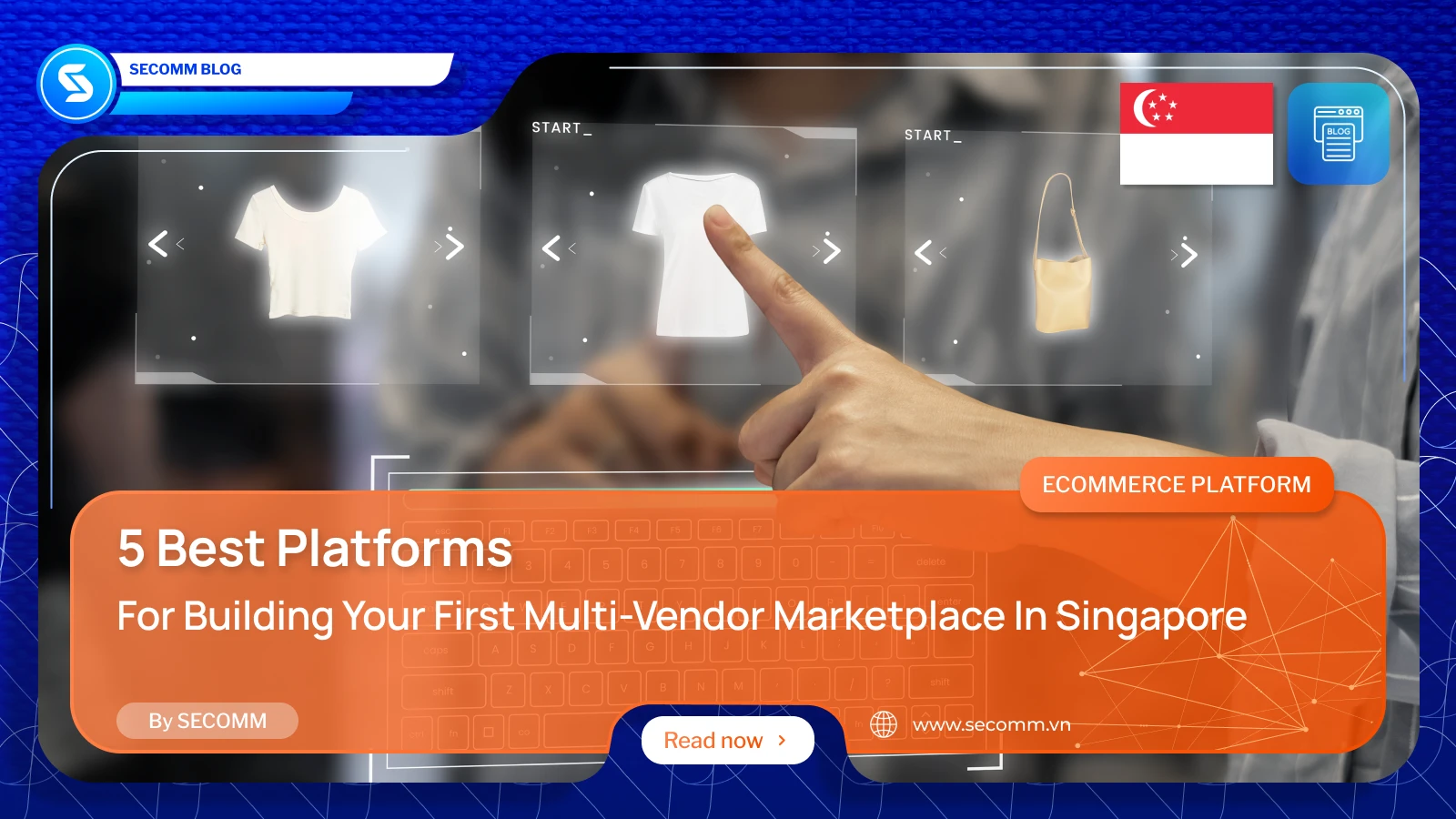
Shopping on multi-vendor marketplaces has become an essential part of modern life, particularly in Singapore, one of the busiest commercial hubs in Asia. As such, building and efficiently managing an eCommerce marketplace is crucial for businesses. However, selecting the right platform can be challenging. This article will introduce the five most reliable platforms that many businesses in Singapore use to build their own.
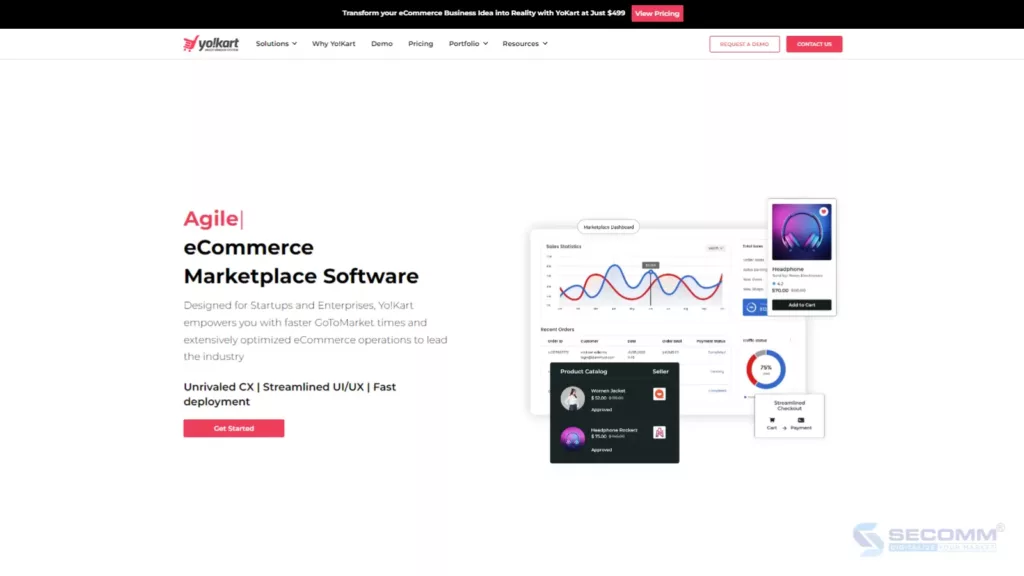
Yo!Kart is a leading self-hosted eCommerce solution that businesses can consider for building a custom multi-vendor marketplace. Designed to be user-friendly, Yo!Kart allows businesses to have full control, customization, and flexible scalability to manage and operate their eCommerce platform more effectively.
Key features:
Pros:
Pros:
Price: Starting from $1099/year. However, costs may vary based on specific requirements.
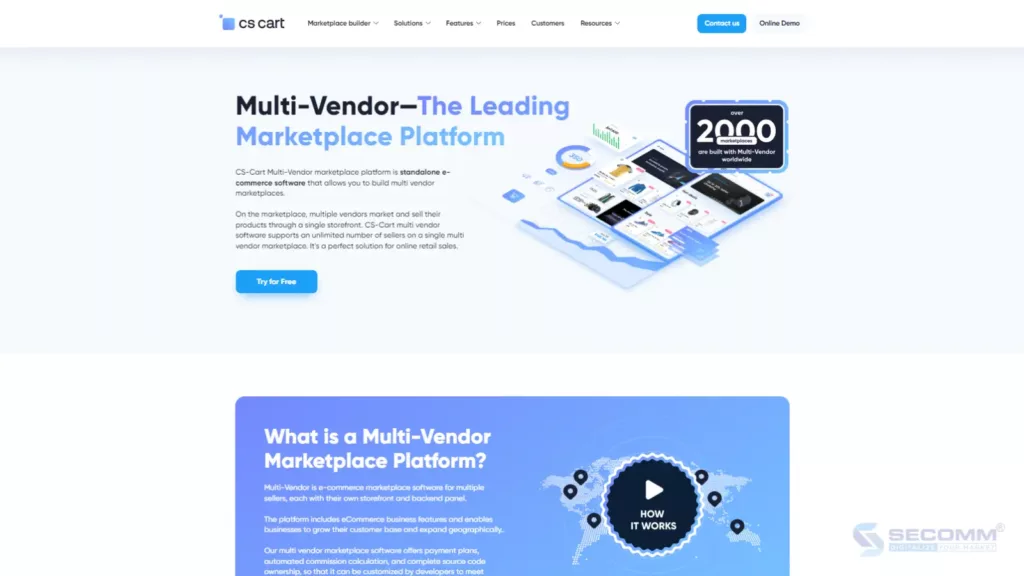
CS-Cart Multi-Vendor is known as a specialized platforms for building multi-vendor marketplaces with robust customization and scalability. With over 26 integrated languages and numerous unique features, this platform is an all-in-one solution suitable for various industries and deployment needsneeds.
Key features:
Pros:
Cons:
Price: Pricing may vary depending on specific needs
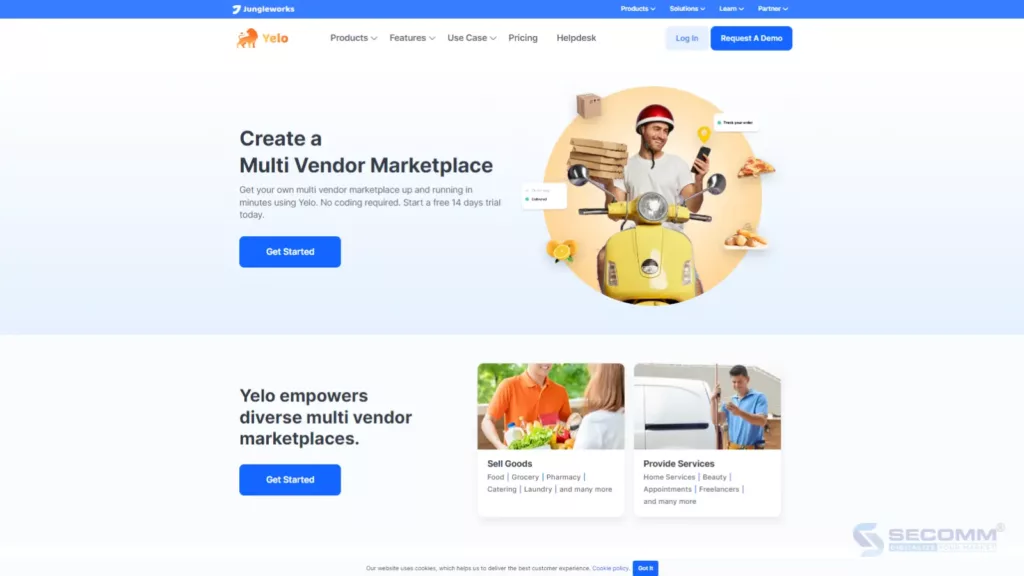
Yelo is flexible multi-vendor marketplace designed to help businesses of all sizes easily create and manage their online store. With Yelo, businesses can quickly build custom eCommerce marketplaces equipped with comprehensive features for administrators, sellers, and buyers.
Key features:
Pros:
Cons:
Giá: Costs start at $12/month
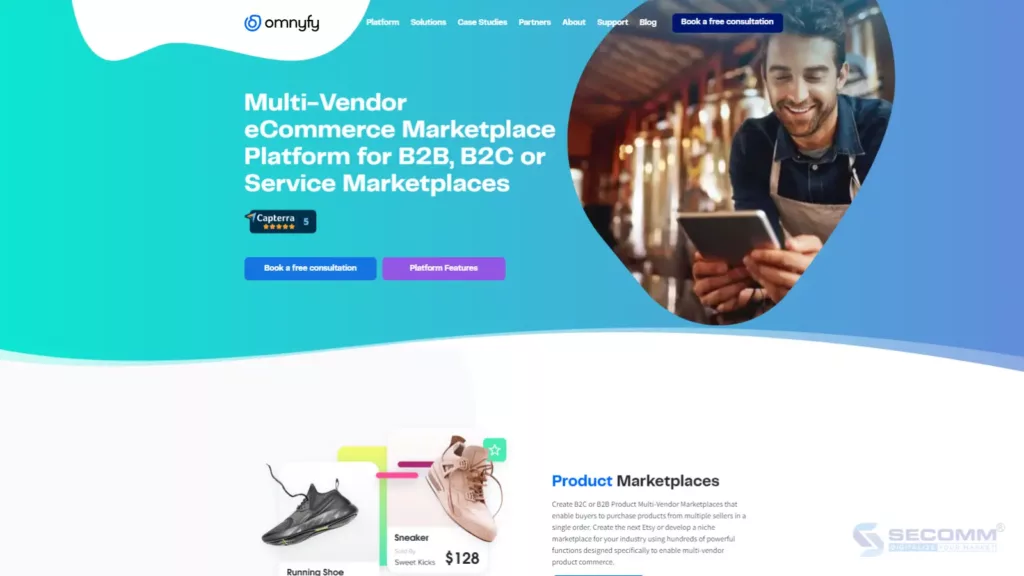
Omnyfy is a powerful multi-vendor marketplace designed to meet the needs of both B2B and B2C businesses. With its multi-channel management support and flexible integrations. Omnyfy enables businesses to create a comprehensive eCommerce ecosystem, from product management to customer service.
Key features:
Pros:
Cons:
Price: Pricing may vary depending on specific needs
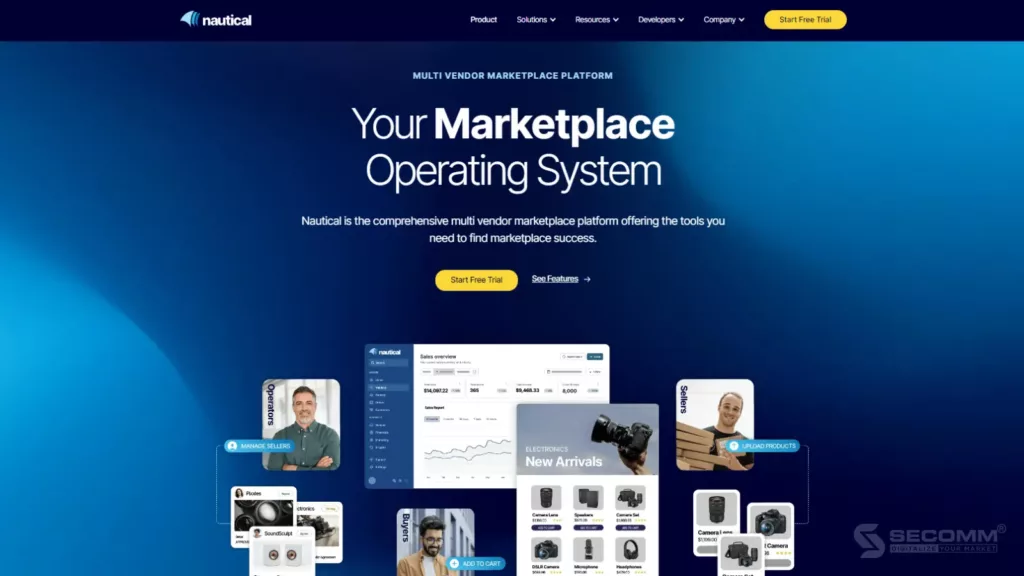
Nautical Commerce is favored by businesses in Singapore for providing a range of comprehensive solutions to make managing and operating multi-vendor marketplaces easier. With Nautical Commerce, businesses can leverage the latest technologies to improve business efficiency and enhance user experience.
Key features:
Pros:
Cons:
Price: Pricing may vary depending on specific needs but 14-day free trial available
Final Words
Here are 10 popular and reliable multi-vendor marketplace platforms widely deployed in Singapore. From Yo!Kart, CS-Cart Multi-Vendor, Yelo to Omnyfy and Nautical Commerce, each platform has its own pros and cons, suitable for different needs.
Need advice on deploying an eCommerce marketplace? Contact SECOMM today!
 2
2
 2,225
2,225
 0
0
 1
1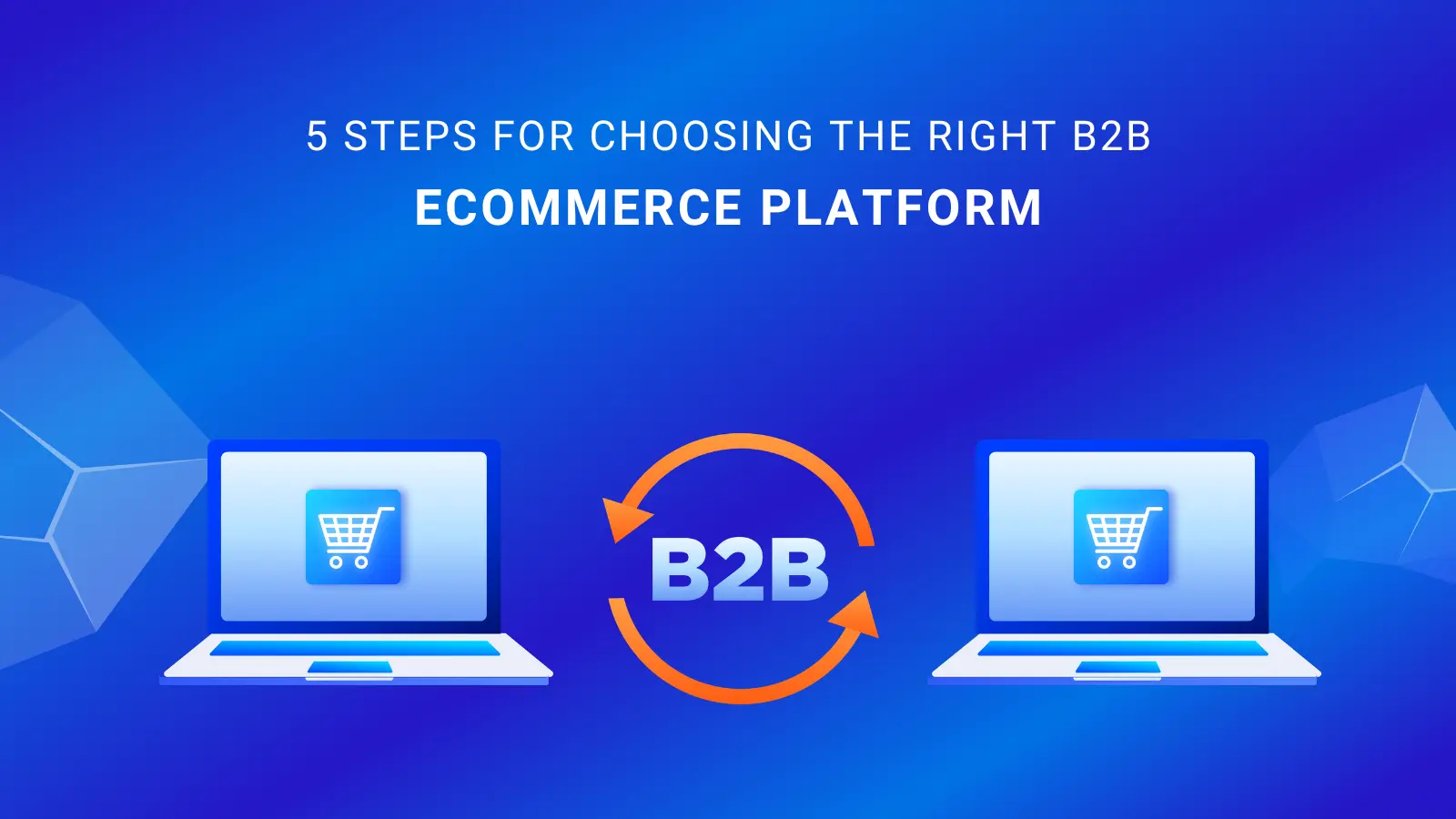
B2B eCommerce represents a vast opportunity, often likened to a sizable cake sliced evenly for every business. Bobby Morrison, Shopify’s Chief Revenue Officer, echoes this sentiment, suggesting that this business model will be a significant opportunity for enterprises of all sizes in 2024 and beyond.
Selecting the appropriate B2B eCommerce platform is pivotal for success, yet with the multitude of options available, it’s not always a straightforward decision. Let’s delve into the key considerations when choosing a B2B eCommerce platform and explore the essential steps to ensure that the chosen platform aligns best with the business’s needs.
Read more: B2B eCommerce: The next big opportunity in 2024 and beyond
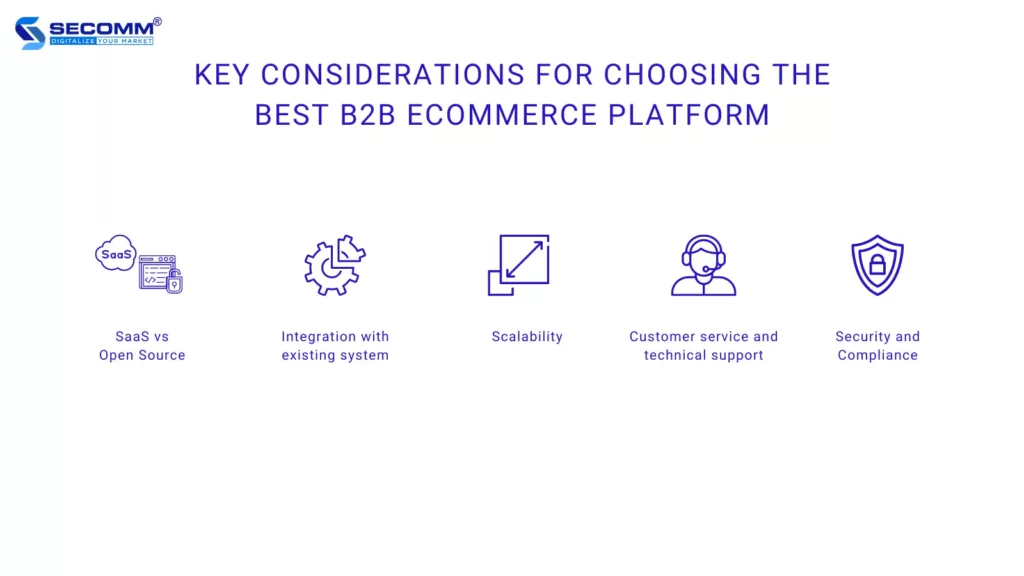
When confronted with various B2B eCommerce platforms, making an accurate decision requires careful consideration of the following important factors:
These are the two most common deployment models when it comes to eCommerce in general and B2B eCommerce in particular. B2B eCommerce SaaS platforms are services provided over the internet and run on the service provider’s cloud infrastructure. Some familiar service providers are Shopify and BigCommerce. Data is stored on the service provider’s servers, and they will directly manage it. This ensures high flexibility, low initial costs, and easy scalability, but businesses will face some limitations regarding customization and data control.
On the other hand, Open Source platforms like Magento or OpenCart are publicly available source code, and developers can modify them. This allows for optimized control and freedom to customize as needed. However, managing open-source code also requires high technical knowledge and may pose some security risks.
Choosing a B2B eCommerce platform capable of seamless integration with existing systems will optimize business operations and create a better experience for both the enterprise and its customers. Several aspects need to be considered when evaluating integration capabilities:
The scalability of a B2B eCommerce platform is extremely important to ensure that a business can grow flexibly and efficiently. The platform needs to be able to handle large volumes of traffic, manage data effectively, integrate with expandable services, and be flexible in customization and adjustments. This helps businesses optimize costs and enhance productivity, while also preparing for future growth.
This is an essential component of any B2B eCommerce platform. It ensures that the business has the necessary resources and support to address technical issues and challenges, as well as to ensure that customers are best supported. Services need to provide quick, quality responses, offer diverse communication channels, detailed support documentation, and continuous training to ensure an optimal experience for all parties involved.
Protecting the vital information of customers and businesses is extremely crucial, especially in the eCommerce industry where sensitive data such as payment information and personal details are exchanged regularly. B2B platforms must adhere to safety standards like GDPR or PCI DSS. Safeguarding server infrastructure and networks is essential to ensure system security against attacks like DDoS, for instance.
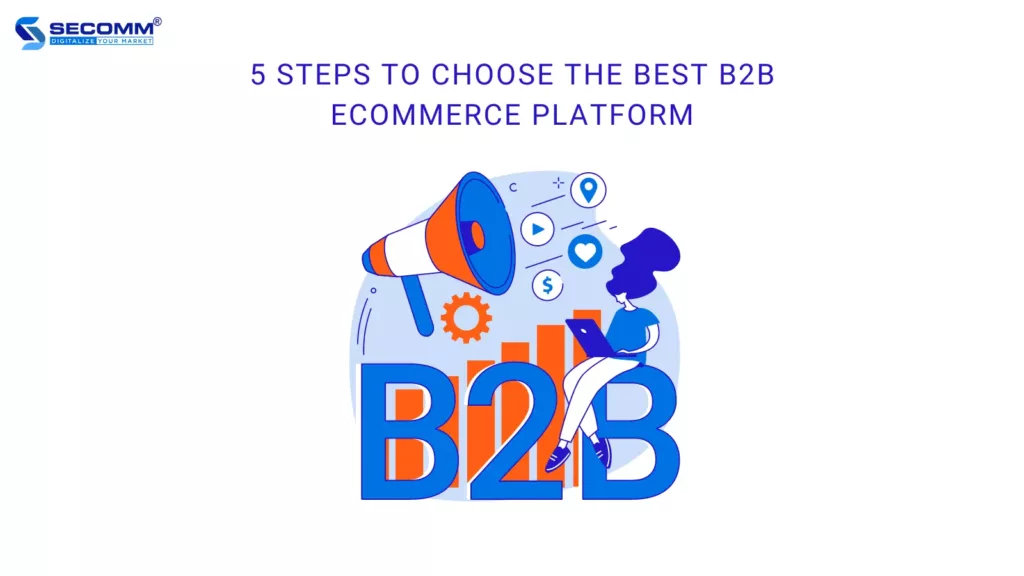
Once you have a clear understanding of the important factors to consider when choosing a B2B eCommerce platform, the next step is to identify specific steps to select the platform that best suits the needs and business objectives of the enterprise. Here are some basic steps that may be helpful in this process:
Starting by partnering with a reputable and experienced development partner in the eCommerce field can make the deployment process smoother. Developers like SECOMM have professional teams with experience deploying various B2B platforms, enabling them to advise and propose the most suitable solutions for specific business needs. Deep understanding of technical aspects and business processes ensures that the deployment project runs smoothly and achieves desired results.
This is a crucial step where the business and development partner need to clearly define short-term and long-term business goals, determine whether to integrate B2C and B2B sales within the same system, and establish criteria for selecting a platform. Additionally, listing the features to be implemented in the B2B eCommerce system is essential for quickly finding a platform that meets the business requirements.
The business needs to make decisions considering both budget and timeline to complete the project.
Regarding budget, implementing a B2B eCommerce project will involve various related costs, so when choosing, the business needs to consider whether the platform’s price will affect the overall budget. In particular, the deployment costs of SaaS and Open Source platforms differ significantly and will also impact the business’s decision.
Next, the business needs to determine the desired go-live time – the moment when the B2B eCommerce website goes live. This will depend on the complexity of the project and the business’s chosen platform model. While typical projects deployed on SaaS take about 3 to 4 months to go live, with Open Source, it takes around 6 months to 1 year.
This step requires a thorough research process on the available B2B eCommerce platforms in the market and conducting comparisons based on specific criteria such as price, features, performance, security, scalability, and customization, as well as user feedback. Businesses can collaborate with development partners to carry out this process. By conducting careful research and comparisons, businesses gain a comprehensive picture and deep understanding of each option to make the most appropriate decision.
Based on the results of the research and comparison process, the business proceeds to select the platform that best fits its needs and business objectives. Next, the business and its partner need to develop a detailed plan for the deployment process with that platform, including specific deployment steps for each phase in the short and long term, as well as the resources and estimated time for each phase.
Read more: Top 5 platforms for B2B eCommerce
3. Final Words
Above are the specific 5-step process and factors to consider for businesses to select the B2B eCommerce platform that best aligns with their goals. Throughout the research and platform selection process, the development partner plays a role as a reliable companion, providing necessary suggestions and support in the platform selection and deployment planning process.
Need advice on choosing your right platform? Contact SECOMM today!
 2
2
 2,051
2,051
 0
0
 1
1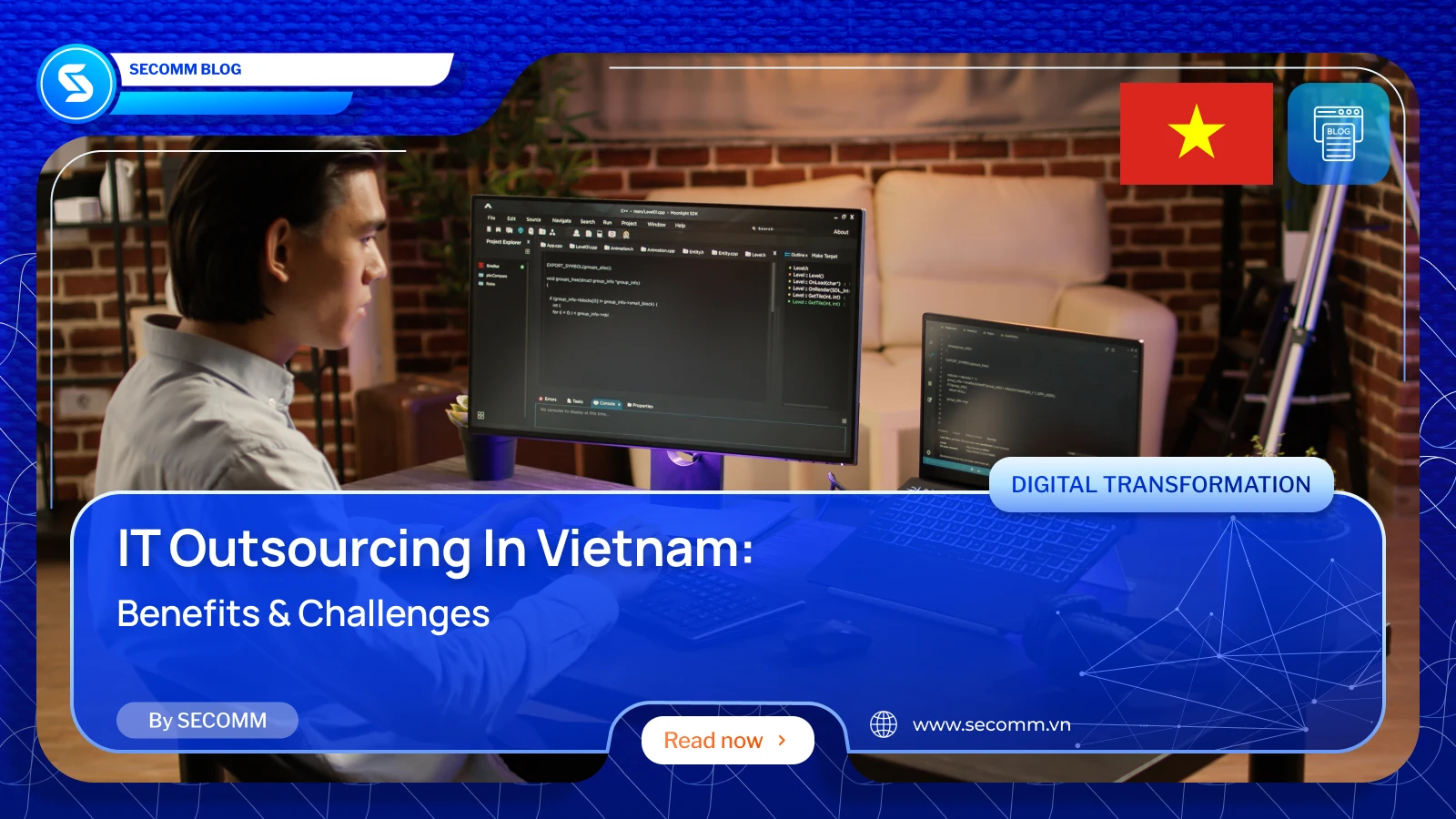
IT outsourcing has become a prevalent strategy in today’s business landscape, offering several advantages such as cost savings, access to specialized expertise, and operational agility. For years, Vietnam has stood out as a prime destination for IT outsourcing due to its favorable business ecosystem, competitive labor costs, and government support.
In this blog post, SECOMM explores why Vietnam is an ideal choice for businesses seeking to outsource their IT requirements. We’ll delve into the country’s strengths and potential drawbacks, providing valuable insights for decision-makers.
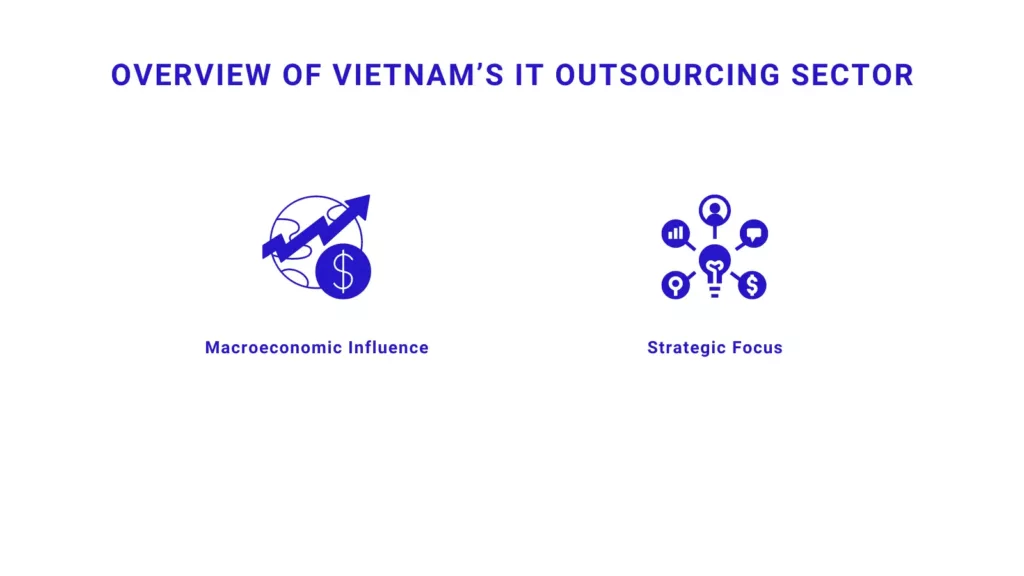
Vietnam’s dedication to advancing science and technology has led to a flourishing ICT market, valued at $7.7 billion in 2021, with ongoing growth fueled by digital adoption in both the public and private sectors.
Macroeconomic Influence: Vietnam has emerged as one of the fastest-growing economies globally, buoyed by a stable political environment and government support for the IT industry. Furthermore, rising investments in cutting-edge technology and startup funding fuel the market’s expansion.
Strategic Focus: According to the International Trade Administration, the Vietnamese government recognizes Information and Communication Technology (ICT) as a pivotal industry and a driver of socio-economic progress. Additionally, Vietnam’s commitment to core tech advancements is evident through significant investments in AI and cloud computing by the government and major companies.
Due to the above elements, the IT outsourcing industry in Vietnam is growing rapidly with an impressive annual growth rate of 16.38% from 2024 to 2028, resulting in a substantial market volume of US$1,282.00 million by 2028.
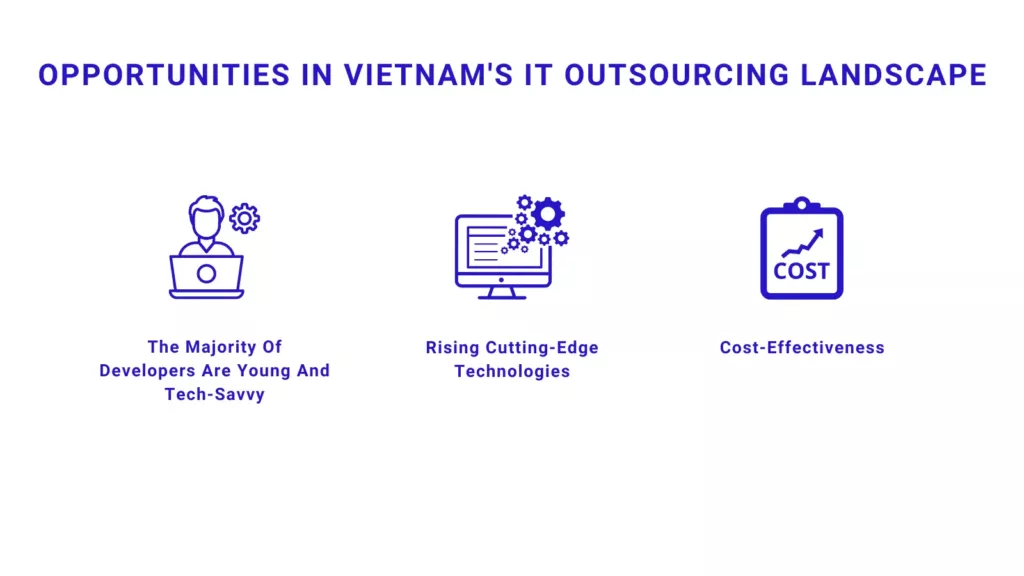
Around 56% of developers fall within the 20 – 29 years age group, this number is expected to form about one-third of Vietnam’s workforce by 2025.
There are approximately 50,000 to 57,000 students who graduate in university IT programs annually. Due to this, Vietnam was ranked among the top 10 globally for IT graduates and the top 6 for quality software services. TopDev’s 2023 report highlights that Vietnam’s robust community of around 530,000 tech professionals is well-suited to meet the varied demands of international businesses.
Moreover, the Ministry of Education and Training manages IT education in Vietnam. Recent changes have allowed more flexibility in higher education institutions to encourage innovation. For instance, separate entrance exams for each institution have been eliminated, resulting in improved admission rates.
Cloud computing in Vietnam has grown at a 30% CAGR recently, driven by robust IT infrastructure and data centers. This progress aligns with Vietnam’s digital transformation agenda. Moreover, with the aim of data security, many Vietnamese companies prefer “make in Vietnam” cloud computing services to foreign ones.
Vietnam has also made strides in artificial intelligence readiness, moving from 55th to 39th globally. It ranks 9th in East Asia and 5th in ASEAN, with an AI readiness score of 54.48.
In 2023, the average monthly salary for developers with fresher-level salaries at $514 and for director-level salaries at $2,680. Overall, the annual salary of a Vietnamese IT developer is $7,173, which is incredibly low, it only amounts to nearly 25% of Chinese wages ($29.840) and around 35% of Indian wages ($20.464). These cost benefits, coupled with a commitment to high-quality workflows, are making Vietnam an increasingly popular choice for international organizations seeking dependable and affordable IT services.
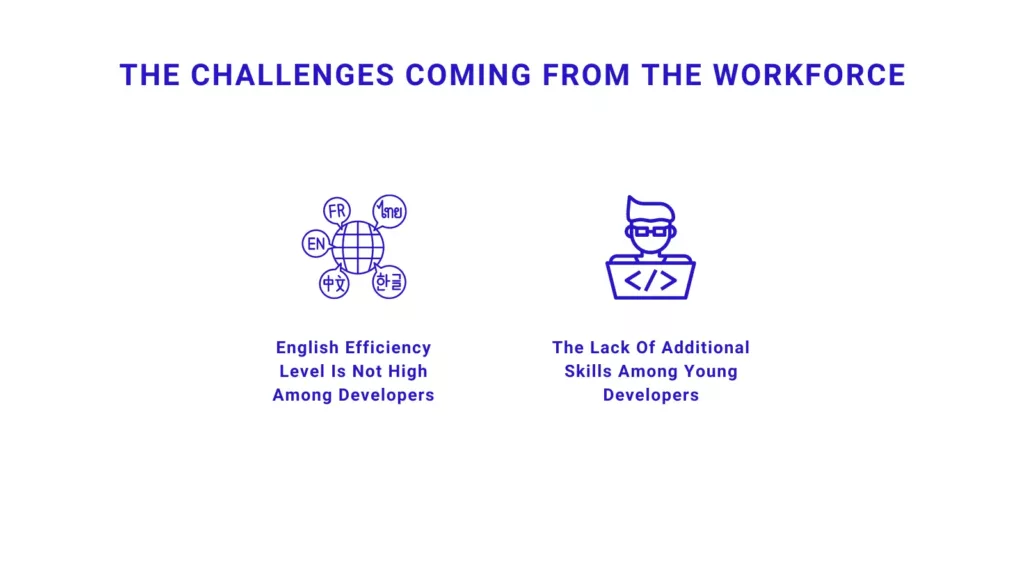
The IT sector’s language requirements are becoming stricter, with over 9% of foreign companies seeking IT staff with professional English skills. The demand for English proficiency has shifted from a nice-to-have to a must-have. Although Vietnamese tech professionals have strong technical abilities and can communicate effectively, their English-speaking skills may not be as advanced as those in other ASEAN countries.
In 2022, only 5% of Vietnam’s workforce was fluent in English, which is less than the fluency rates in Indonesia (10%), Malaysia (21%), and Thailand (27%). This has caused a challenge in the recruitment process for IT outsourcing that many skilled developers are getting denied due to their English level.
Additionally, the new generation of developers, mainly Gen Z, is experiencing a growing skills gap because of the fast-paced technological changes. Yet, an impressive 72% of them are keen to learn digital skills, which is higher than the global average of 52%. This enthusiasm is a positive sign for the future, showing they understand the challenges and are ready to tackle them.
Upon engaging with SECOMM, you will gain access to a dedicated IT team that meets standards in English proficiency and technical competency. Book your FREE consultation with SECOMM’s experts today.
Explore SECOMM’s project: Assembling a Specialized Vietnamese IT Team for LandNow’s Website Development.
3. To Sum Up!
Vietnam’s IT outsourcing market has seen consistent growth, thanks to significant investments from both the government and foreign companies. If you’re seeking an IT team provider in Vietnam, consider SECOMM. Their exceptional talent can drive innovation and elevate your business objectives. Reach out to SECOMM at (+84) 28 7108 9908 to explore a partnership.
 4
4
 3,924
3,924
 0
0
 5
5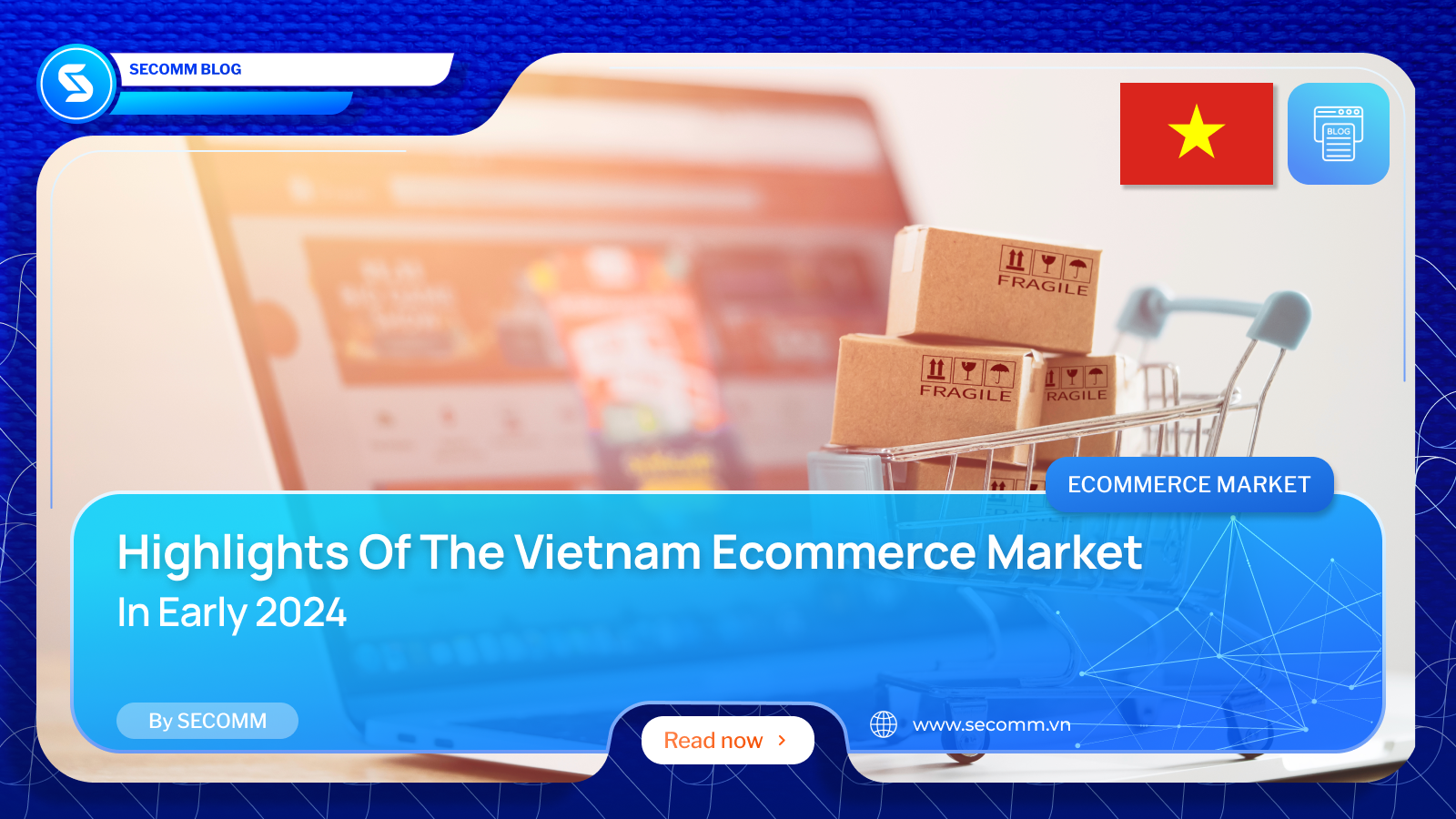
Despite the impact of inflation and economic recession on the Vietnamese economy, consumers are still willing to spend heavily on essential goods. As a temporary solution, they are turning to online shopping channels as one of the ways to deal with rising prices.
In the first two quarters of 2024, the eCommerce market in Vietnam has seen many significant fluctuations with Livestream and Short-video still maintaining their heat as evidenced by the fact that not only TikTok but also the eCommerce giant Shopee is investing heavily in video content. Let’s take a look at some of the highlights of the first few months of the year with SECOMM.
Vietnam is becoming a fertile market for eCommerce development as the demand for online shopping continues to grow. It is forecast that by 2025, eCommerce (B2B, B2C) will reach approximately $24 billion with a CAGR of 22%.
According to statistics from NIQ, there are about 60 million people nationwide using online shopping systems with an average of 3.5 million daily visits to eCommerce sites.
Among eCommerce platforms, TikTok Shop is expected to continue to grow strongly in the coming time. In the first quarter of 2024, this platform’s revenue increased by more than 239% compared to the same period last year, while Lazada showed signs of a slight decrease. Shopee is still holding the upper hand and always outperforms TikTok Shop and Lazada.
A notable point in the consumer behavior of Vietnamese shoppers is that they tend to focus on social factors (social-oriented), which means that they are interested in how products are being evaluated and promoted on communities and social networks, and from there, make purchasing decisions.
Currently, up to 90% of users intend to maintain or even increase their online shopping frequency on eCommerce platforms in the next year.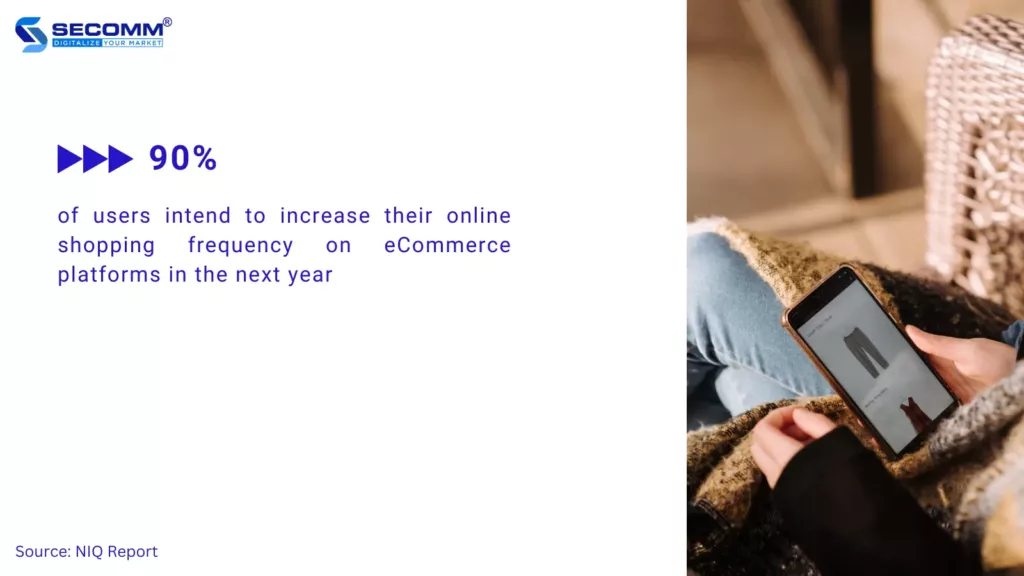
Research indicates that while price reductions and special deals are influential, they only explain 90% of consumer shopping patterns. The convenience factors offered by eCommerce, which simplifies shopping to a few quick actions on mobile devices, actually play a slightly larger role, influencing 92% of consumer choices.
This serves as a reminder for companies to prioritize their eCommerce website’s quality to enhance user experience. For instance, Vinamilk has recently revamped its brand identity and collaborated with SECOMM to refine its online system through eCommerce development services.
The Story of Vinamilk: Vinamilk & The Unprecedented Shift Using Shopify Plus
In a certain survey, only 55% of shoppers chose the shopping experience as a key determinant in their online purchasing decisions. With after-sales services such as easy returns or 24/7 customer care, sellers can easily leverage available resources to enhance the customer’s shopping experience.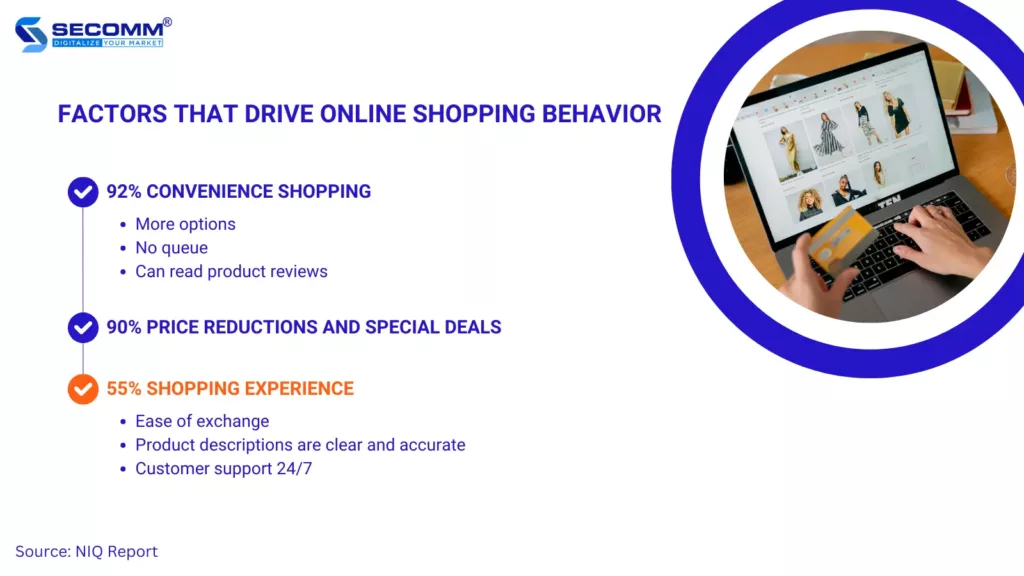
According to research from NIQ, on average, a shopper uses 3.1 different platforms within three months instead of being loyal to just one specific platform. Therefore, sellers should strengthen their presence across multiple platforms.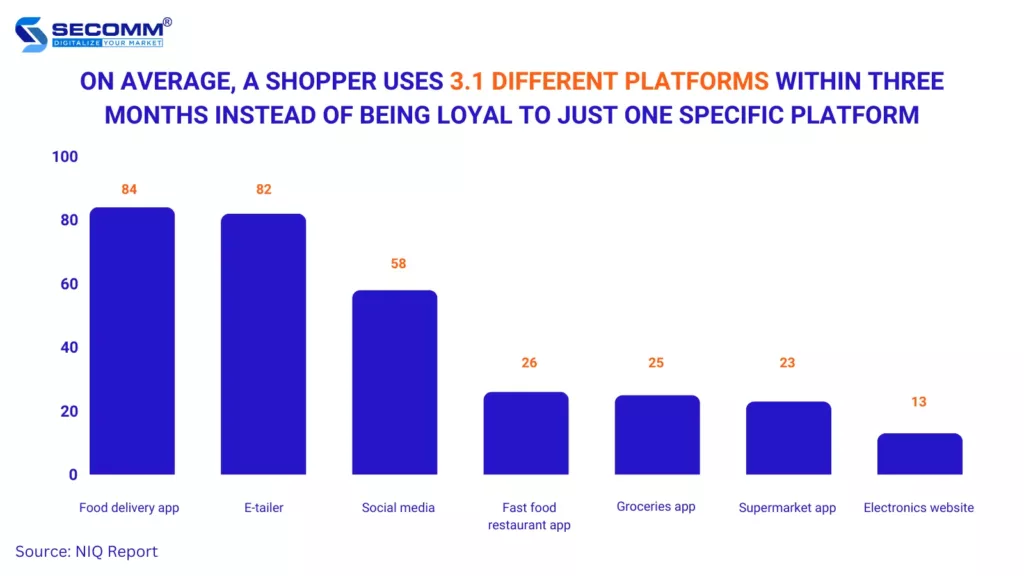
Currently, the trend of ‘Shoppertainment’ remains prevalent, with over 79% of TikTok users making purchases influenced by seller content rather than sales promotions. 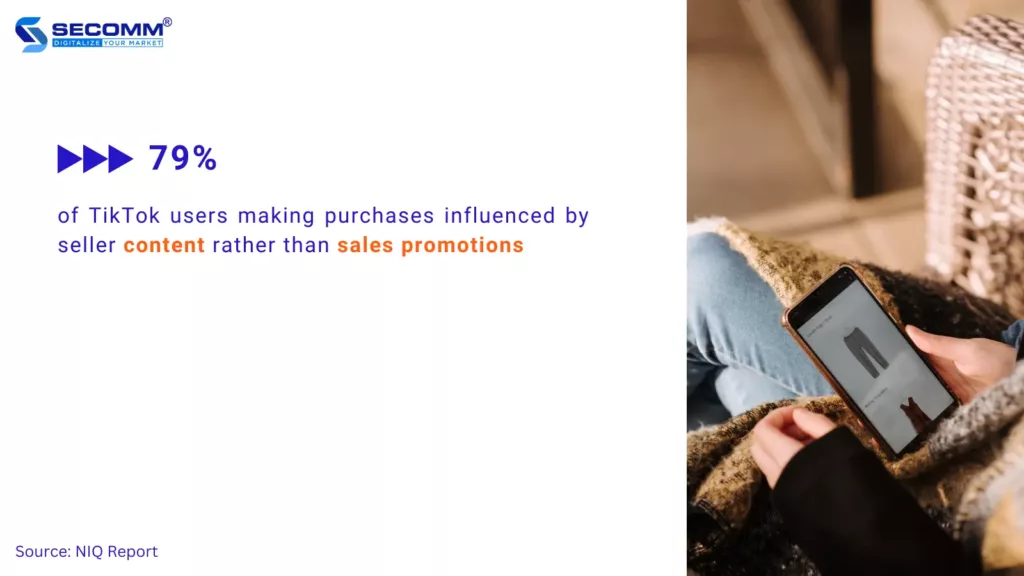
On TikTok, content creation is crucial for merchants to maintain customer engagement and push buying decisions. Ms. Trang Pham, Channel Partner Director at TikTok Vietnam, emphasizes the importance of diversity in advertising and content strategies. She warns that a lack of variety can lead to viewer fatigue.
Consequently, sellers need to understand their customer groups well to create the most suitable content for each group, limit inappropriate content, and utilize cost.
Traditional shopping methods like browsing social media or eCommerce websites are becoming less attractive. Livestreaming, however, stands out as a dynamic way to shop online.
In Q1 2024, 95% of online shoppers made purchases through livestreaming, dedicating an average of 13 hours per week watching livestreams. Statistics reveal that 85% of users prefer livestreaming because it allows direct interaction with sellers, while 81% appreciate the ability to view products in greater detail. Notably, livestreaming can drive 64% of users to purchase unintentionally.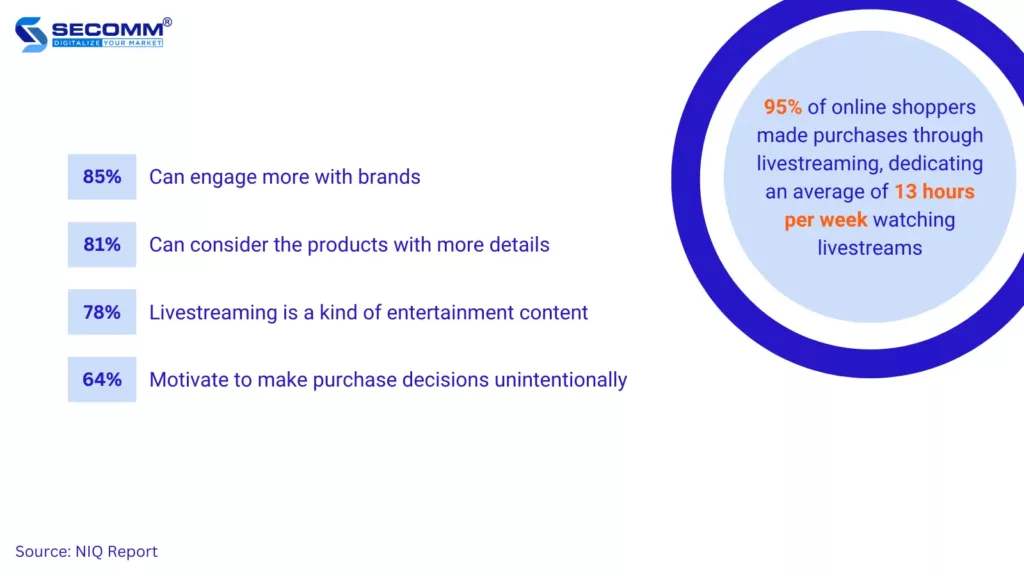
The rise of livestreaming has expanded the influence of content creators and social media influencers. Sellers can leverage these resources to build real connections with consumers. According to NIQ, approximately 50% of consumers are influenced by KOCs/KOLs when making purchasing decisions, with the personal care industry being the most impacted, as 60% of buyers in this category have changed their consumption habits.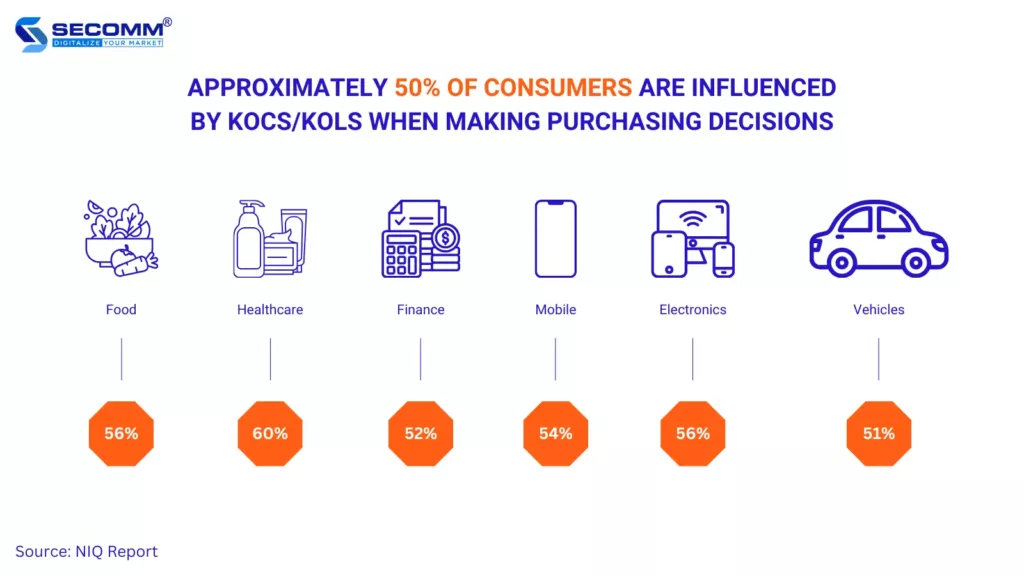
Influencers and KOCs/KOLs are valued for their trust and realness. Their shared content and insights are key in guiding customers’ buying choices. With more influencers emerging, it’s the quality of their content and real-world knowledge that helps shoppers confidently choose trusted brands online.
Online shopping platforms are advancing rapidly, focusing on innovation that puts customers first. For large businesses, along with building brand awareness, improving online stores should always be kept in mind. SECOMM is ready to help companies upgrade their eCommerce platform. Contact SECOMM for a free, detailed consultation.
 2
2
 5,201
5,201
 0
0
 2
2Subscribe to get the latest eBook!
Hotline